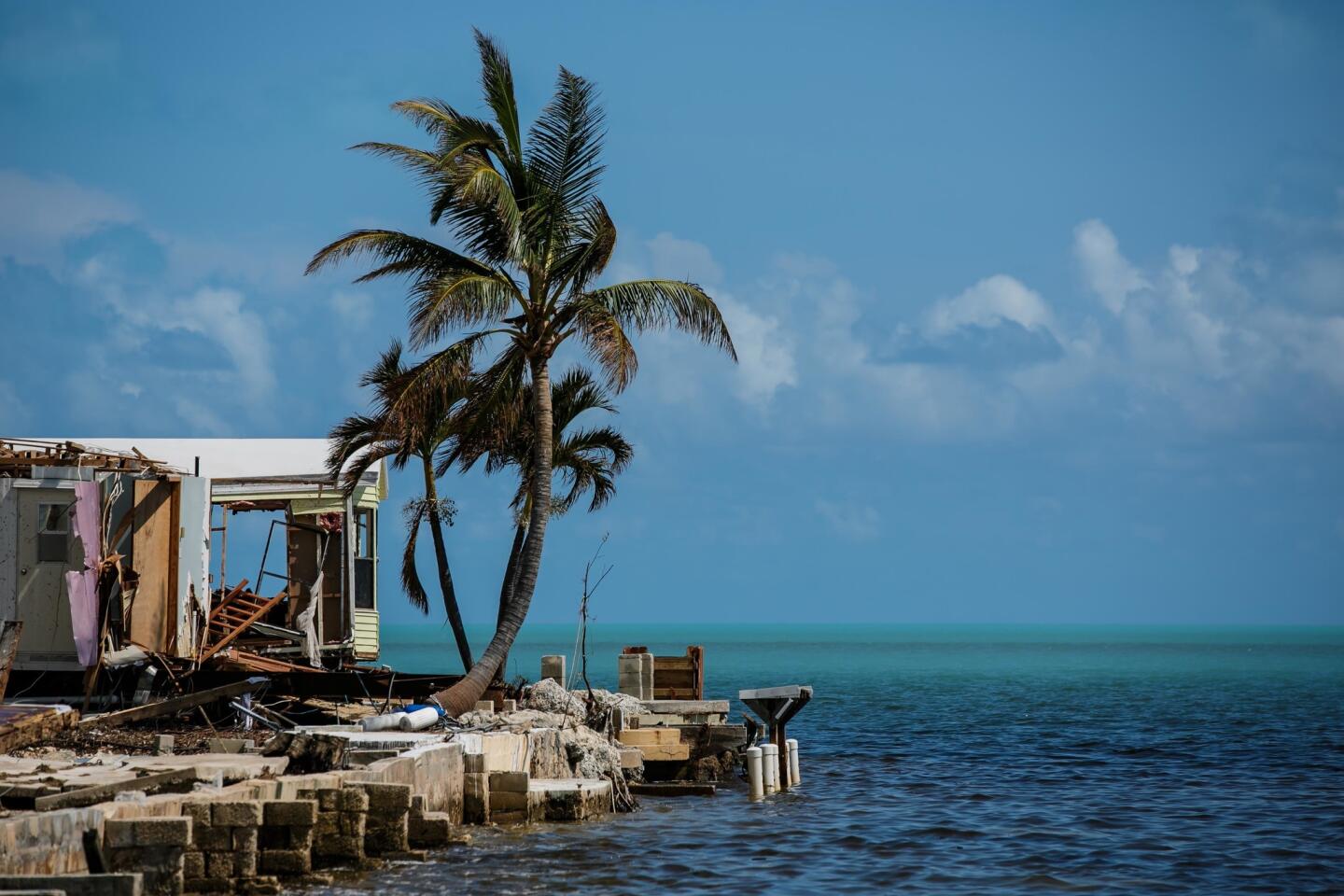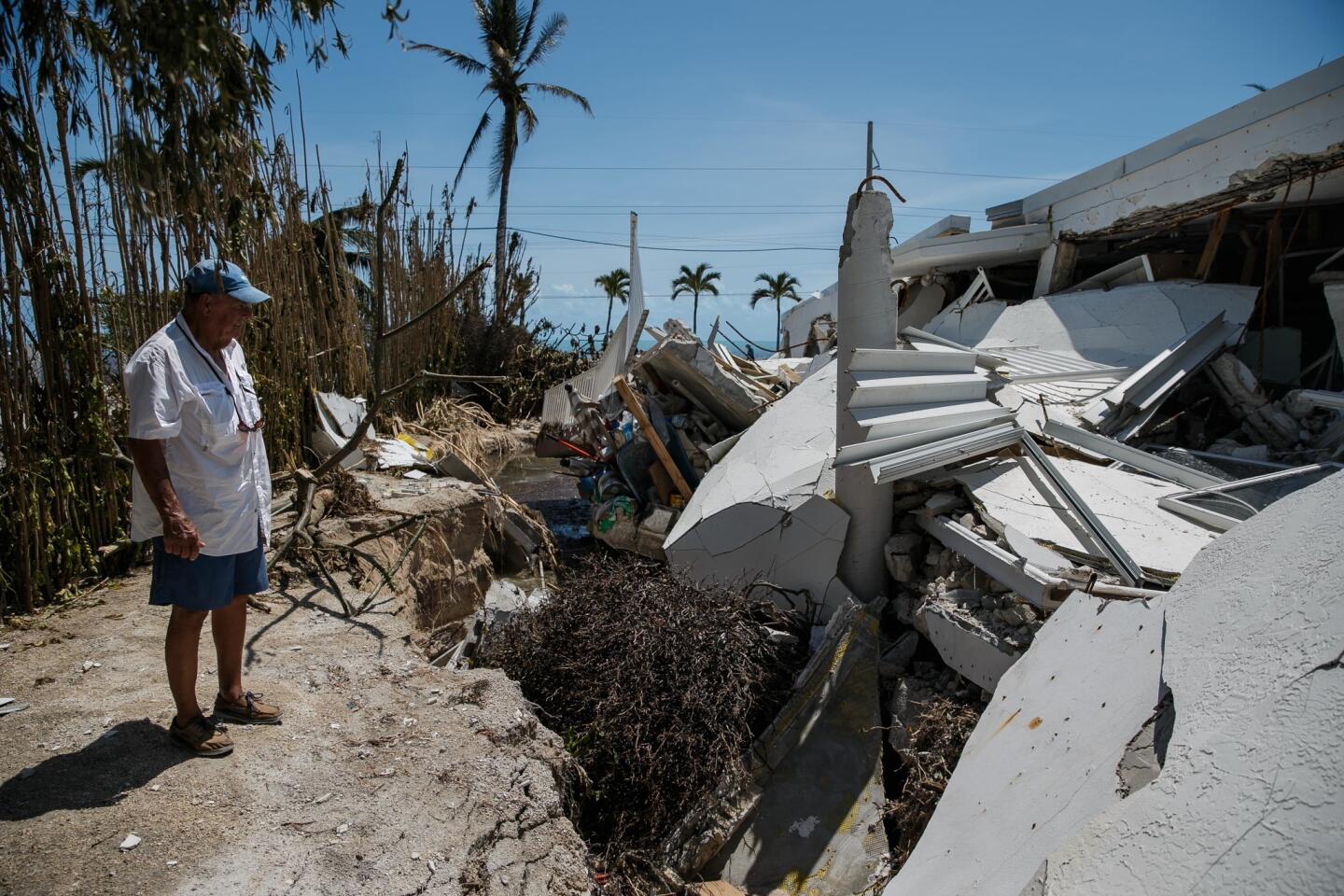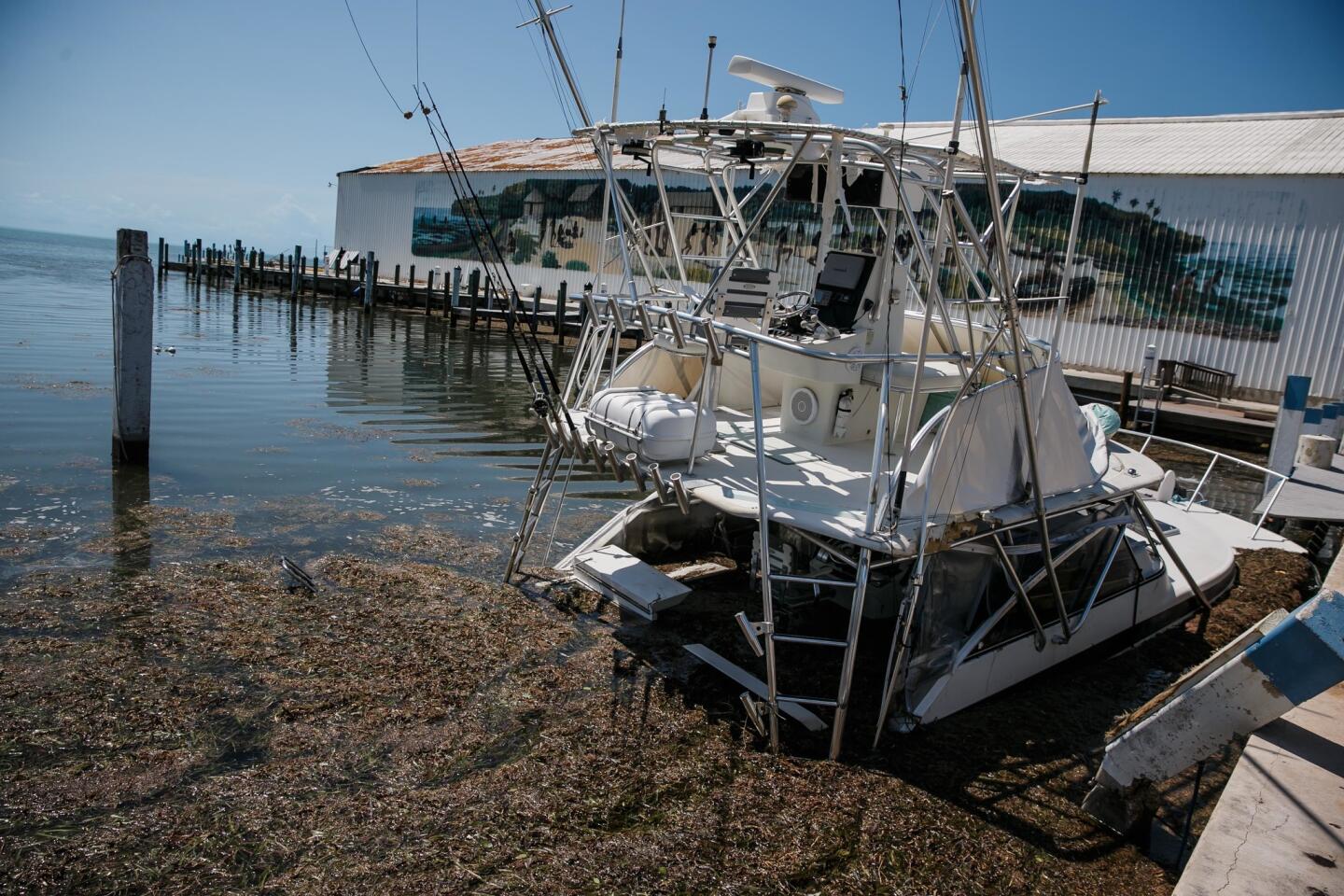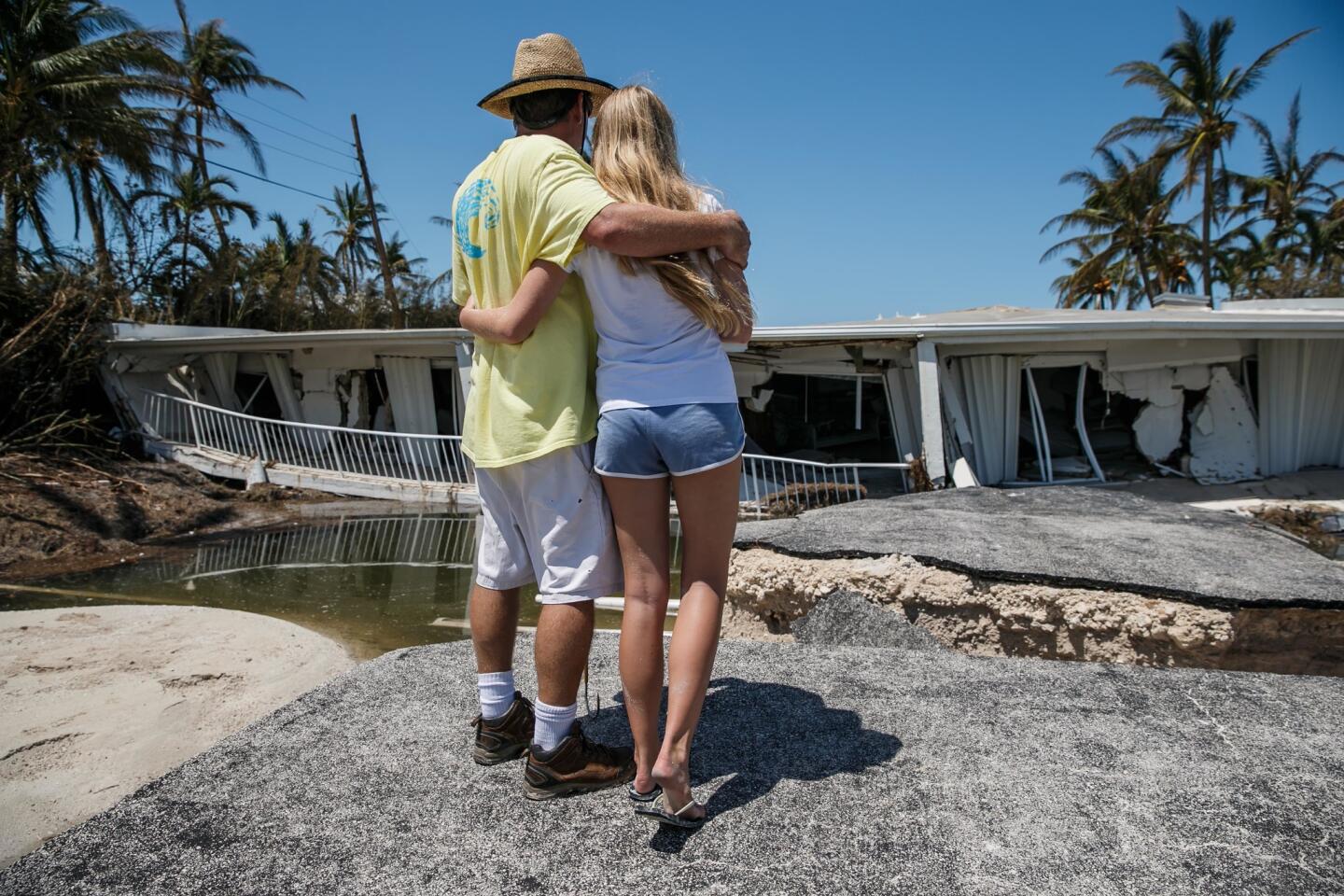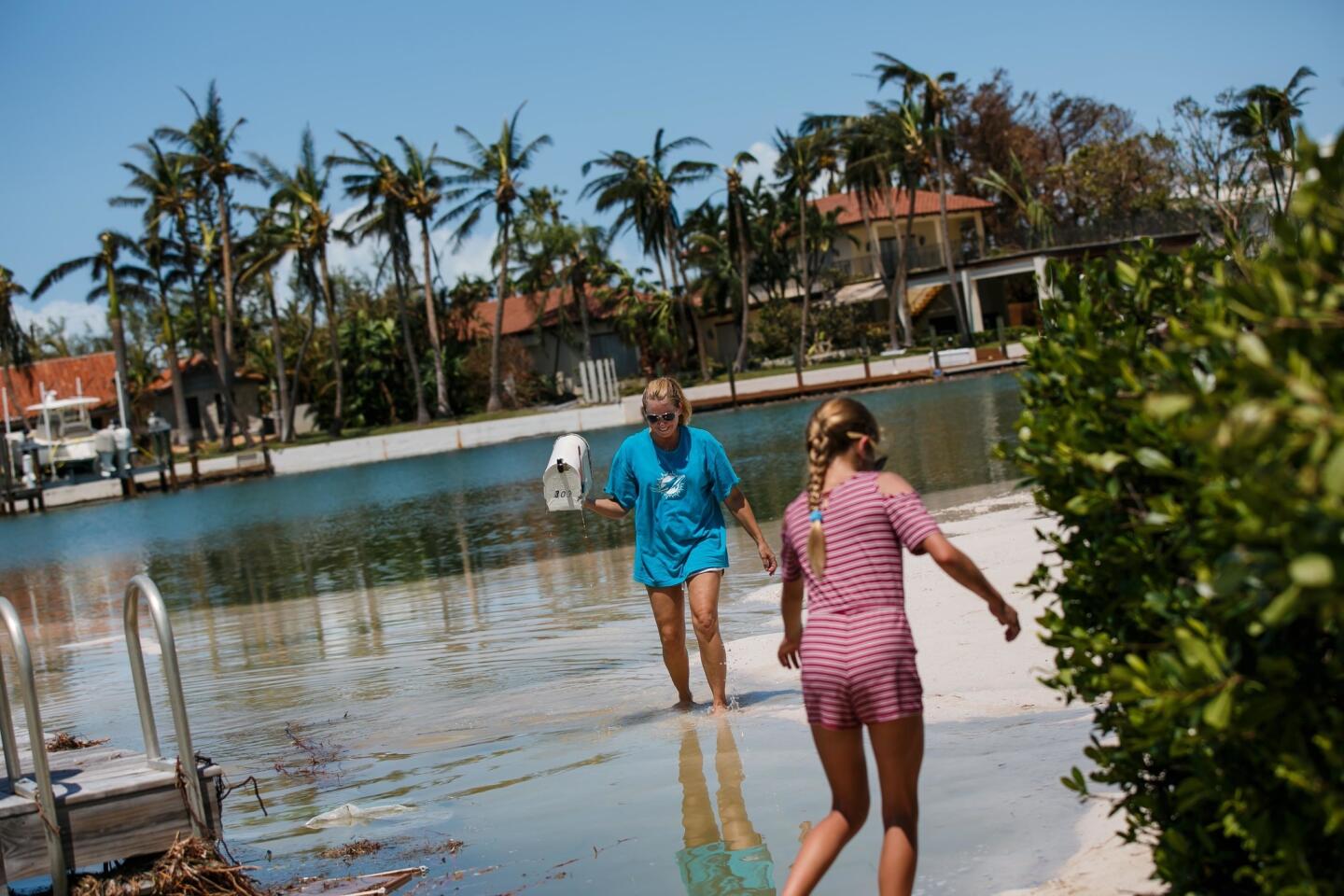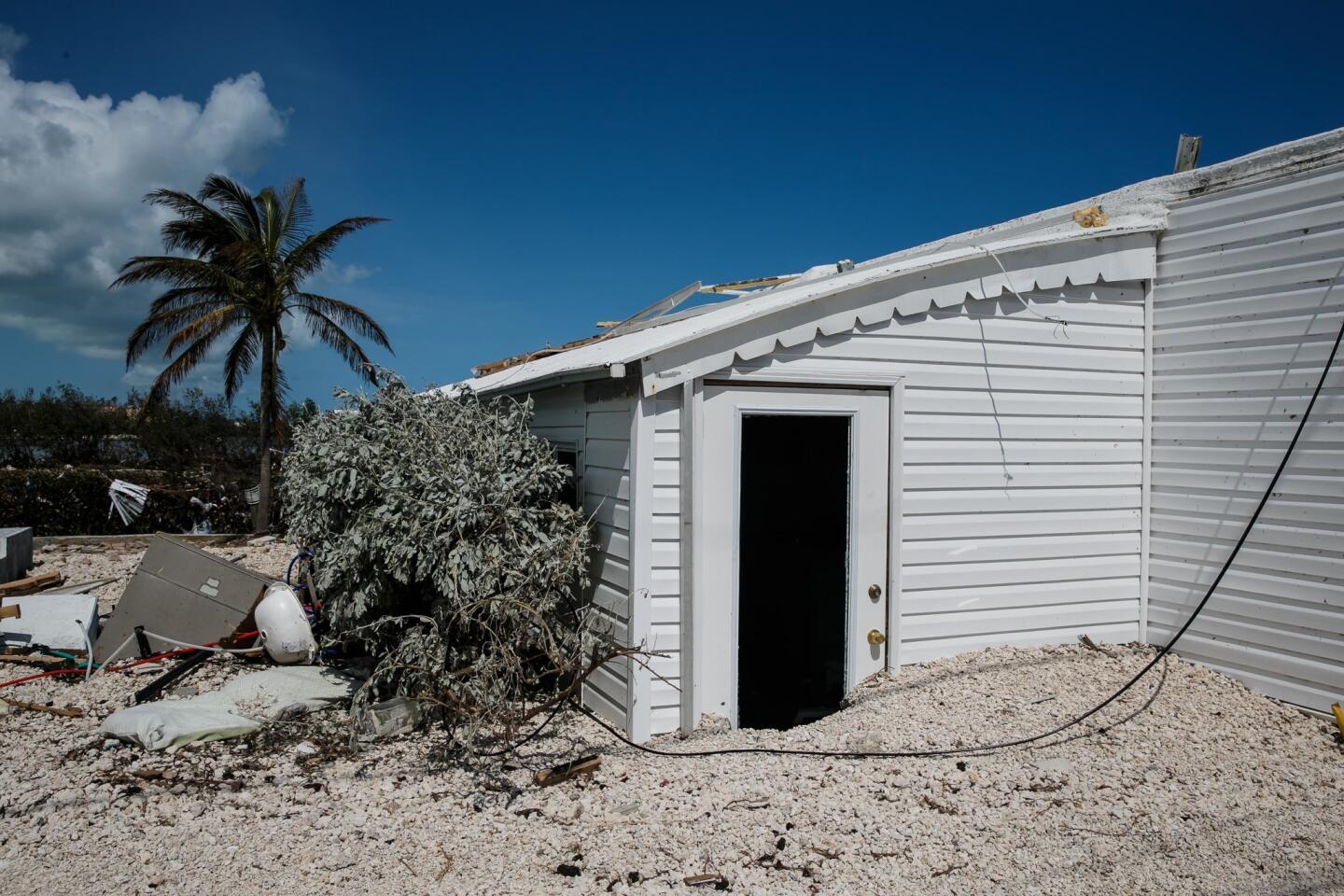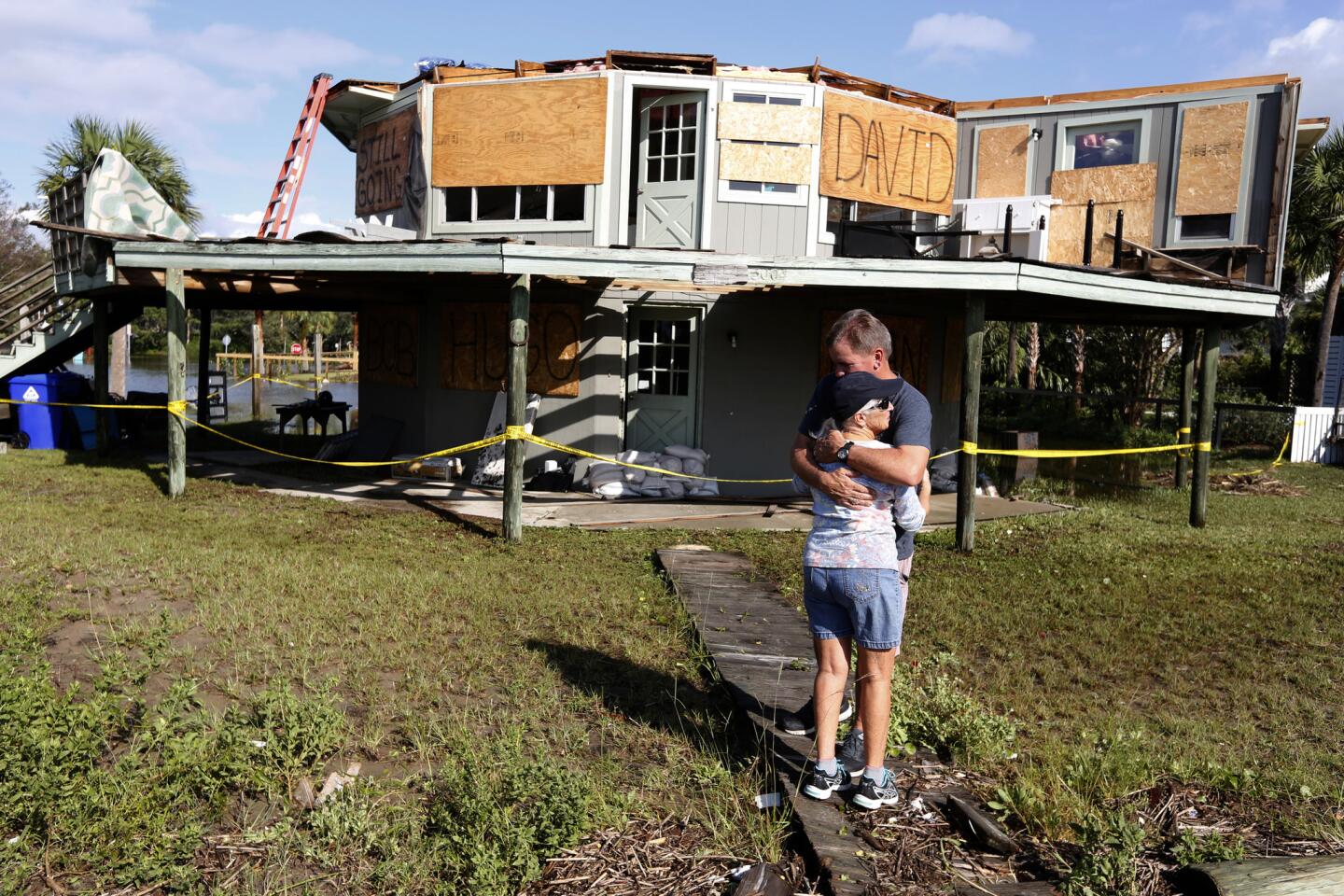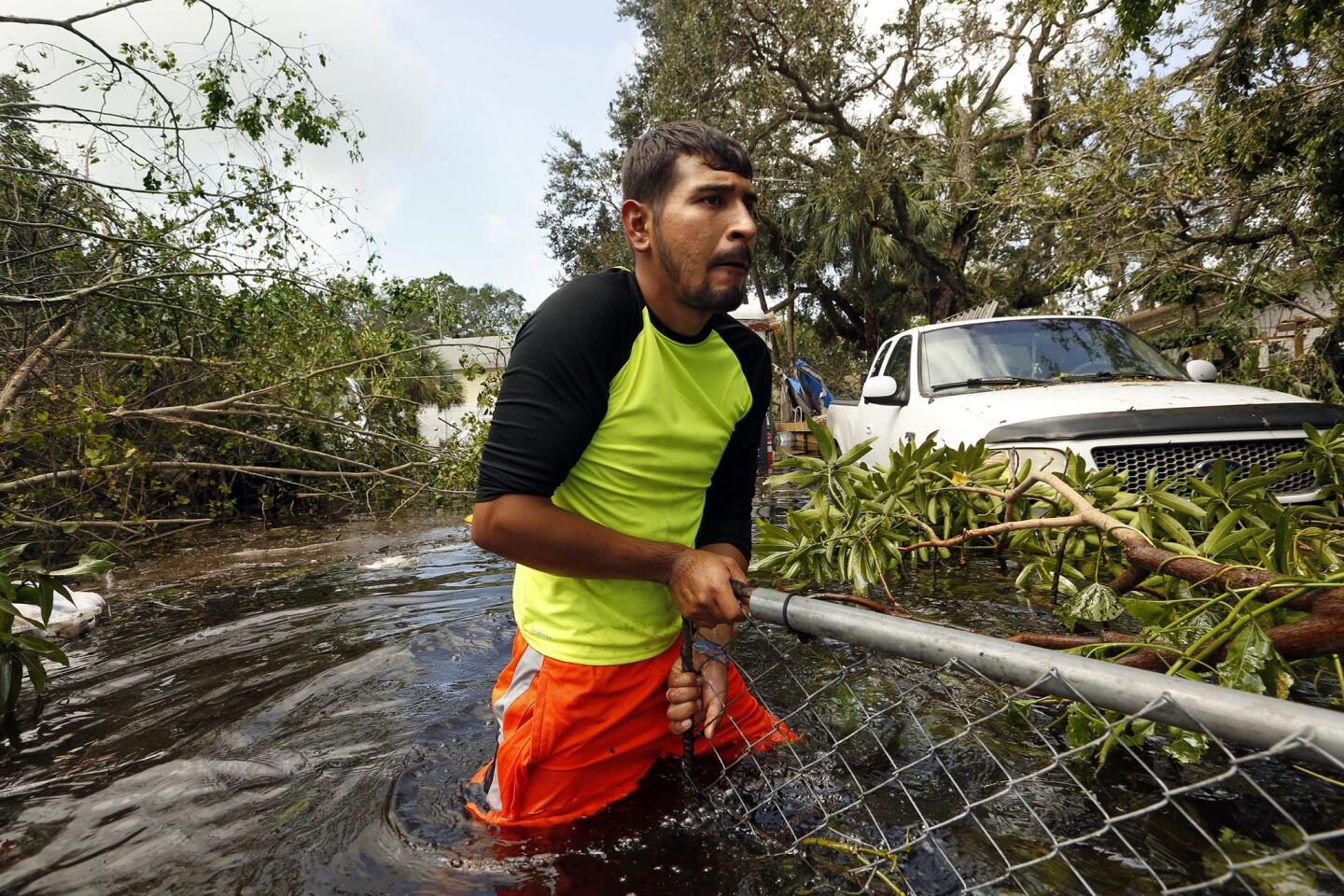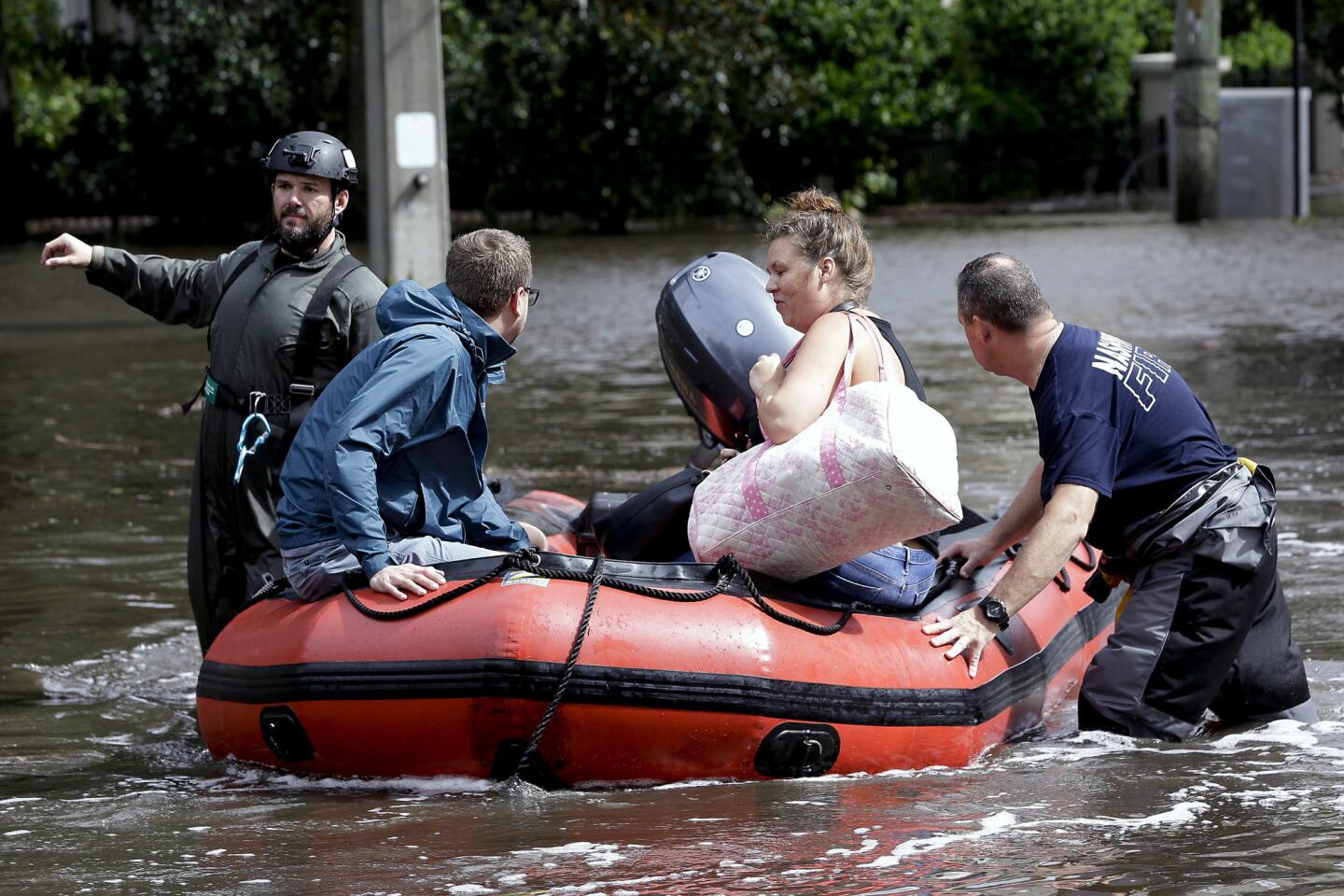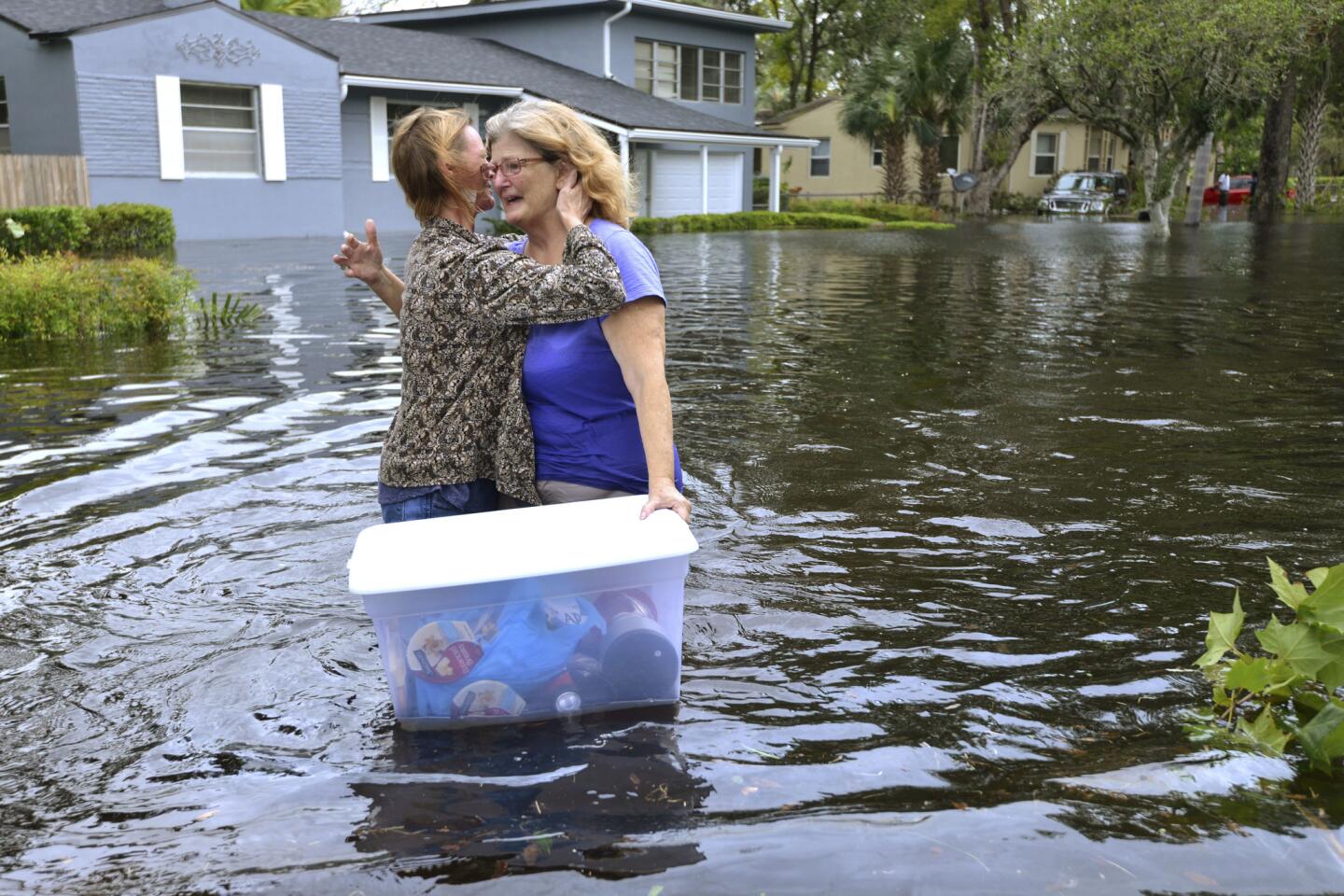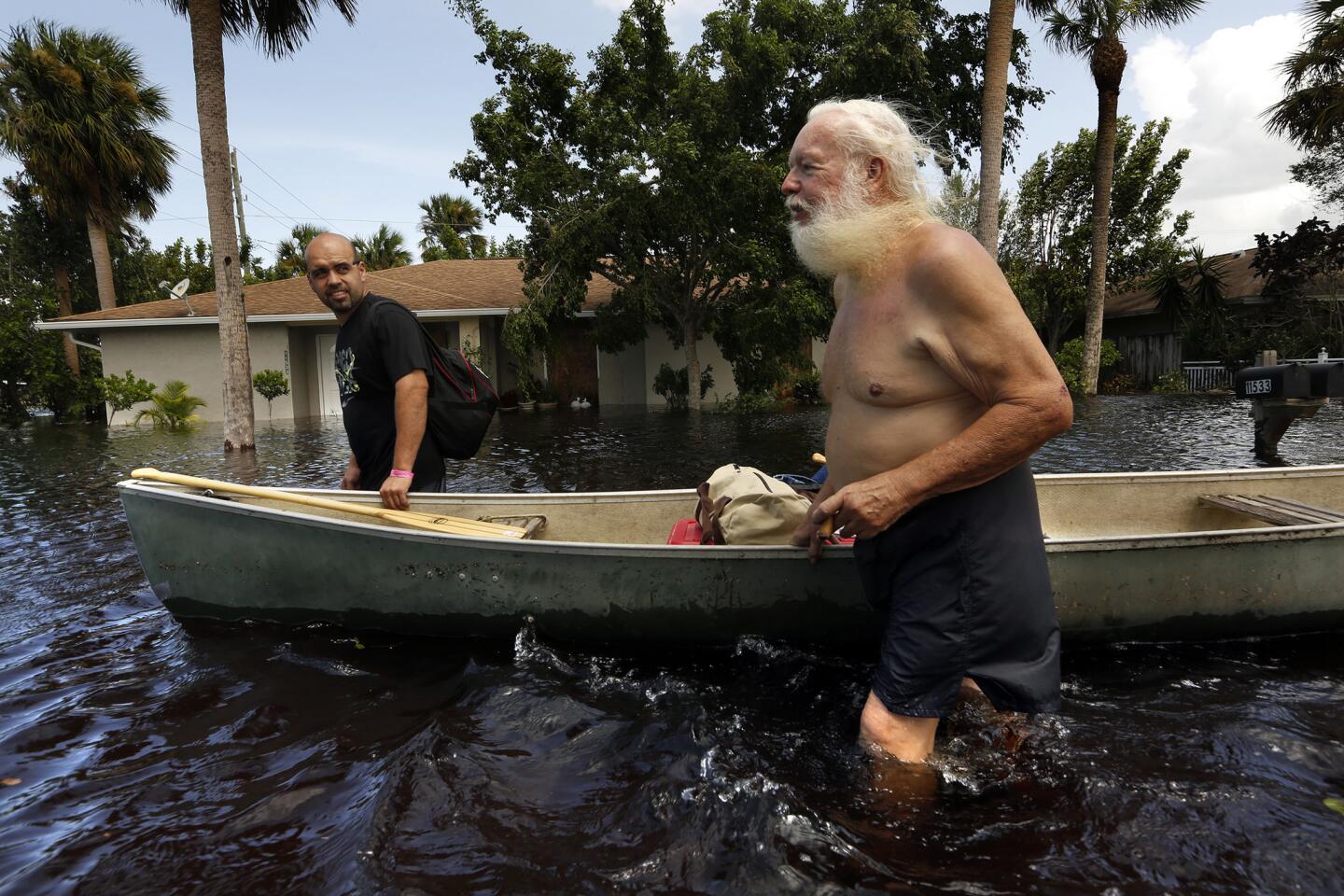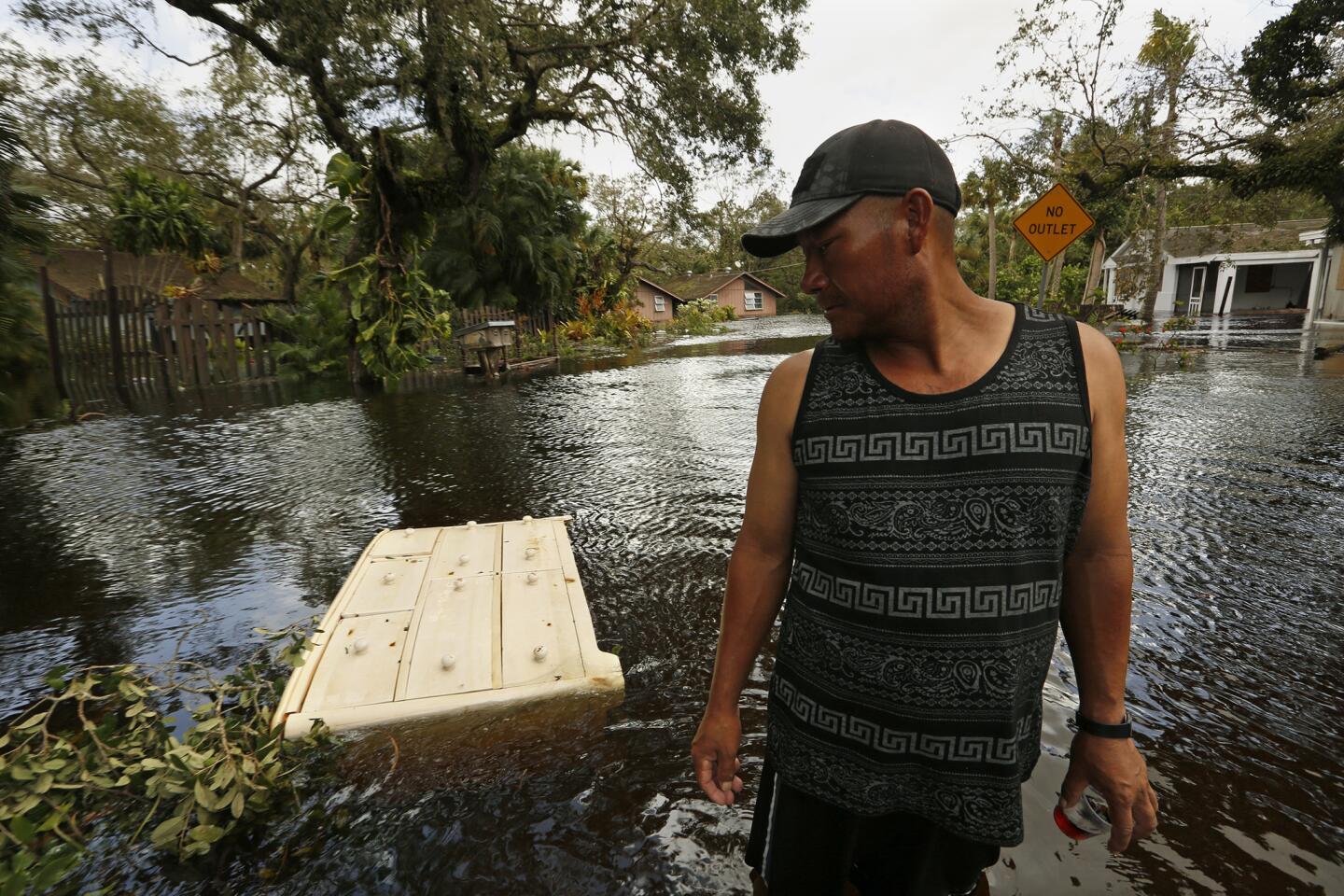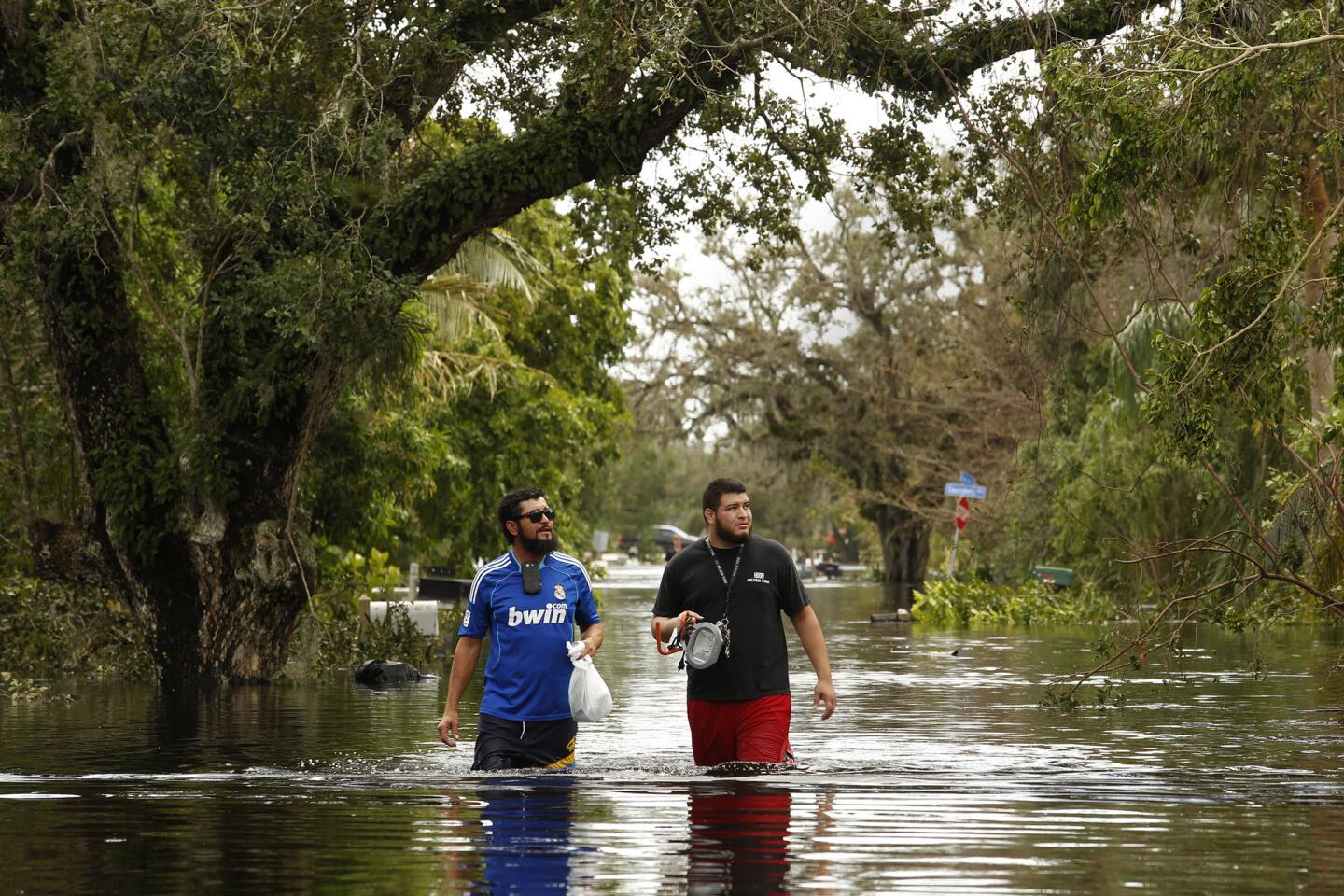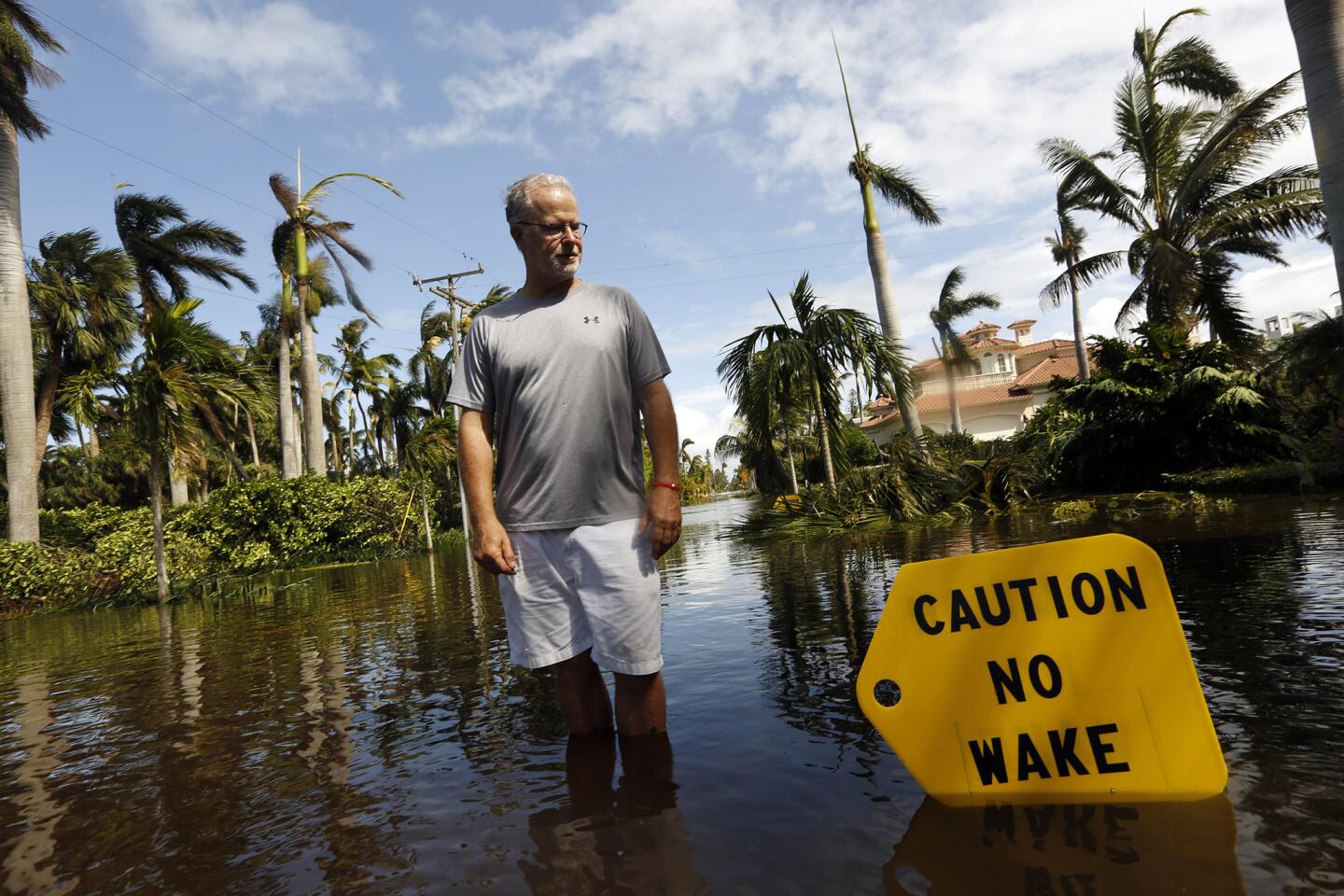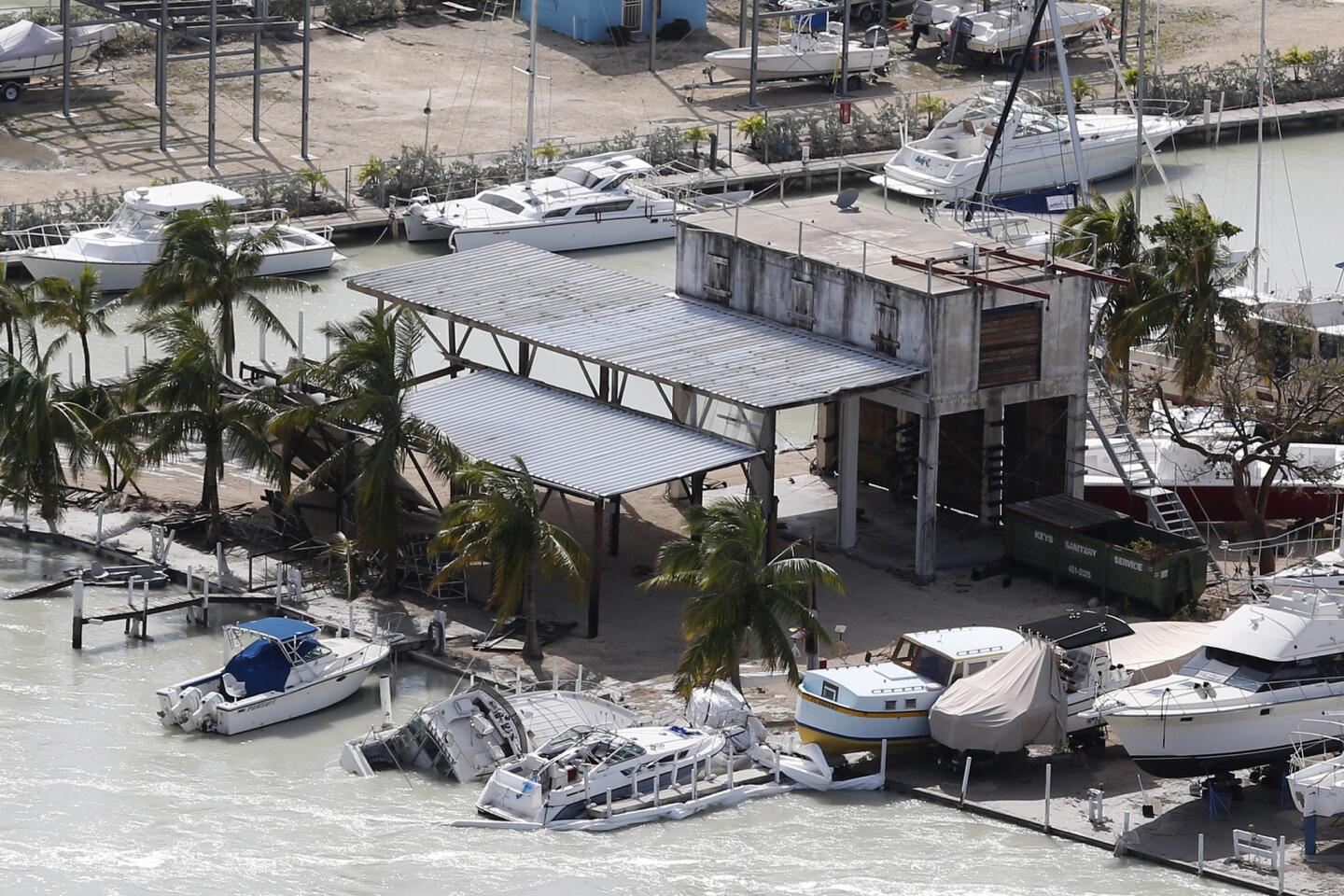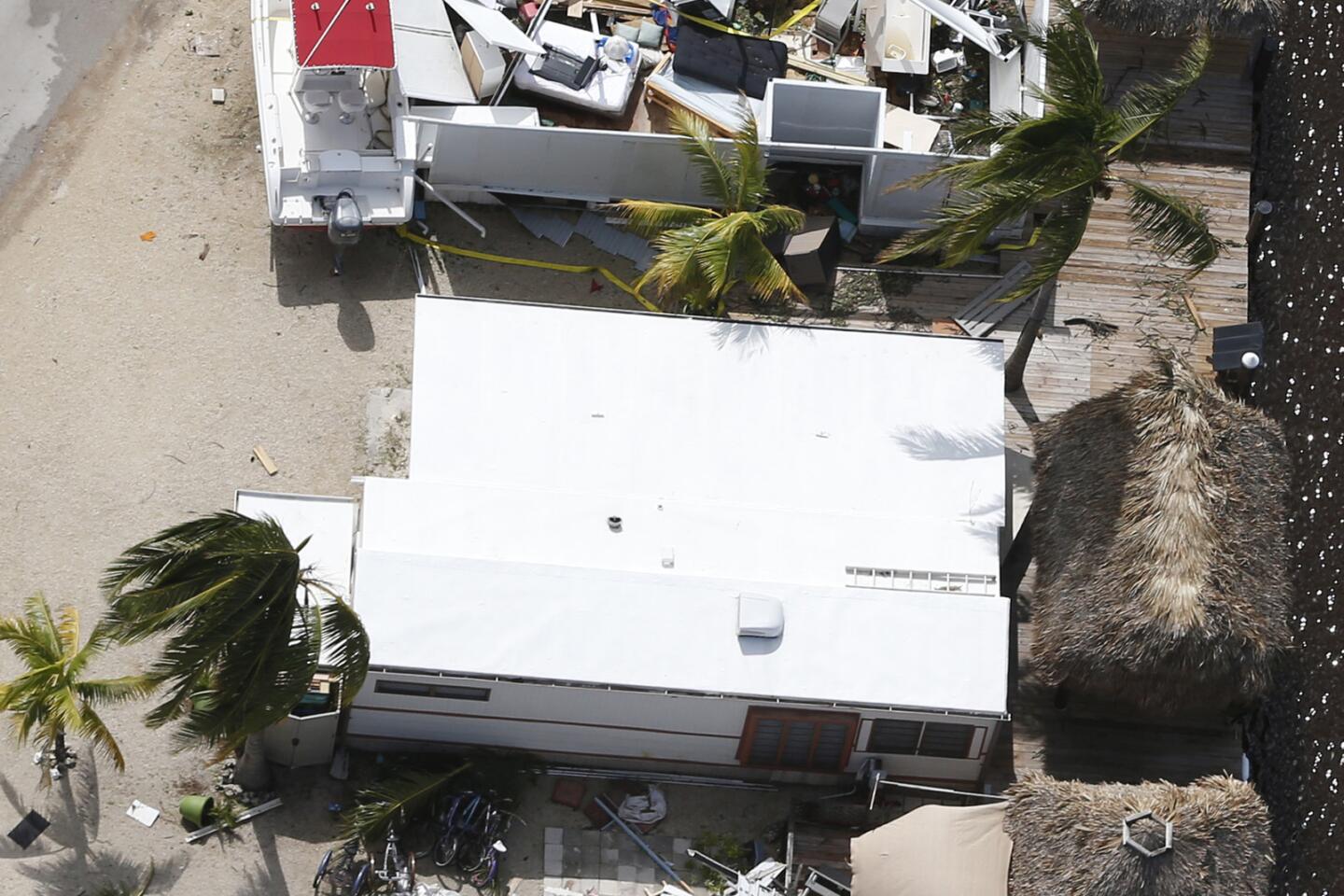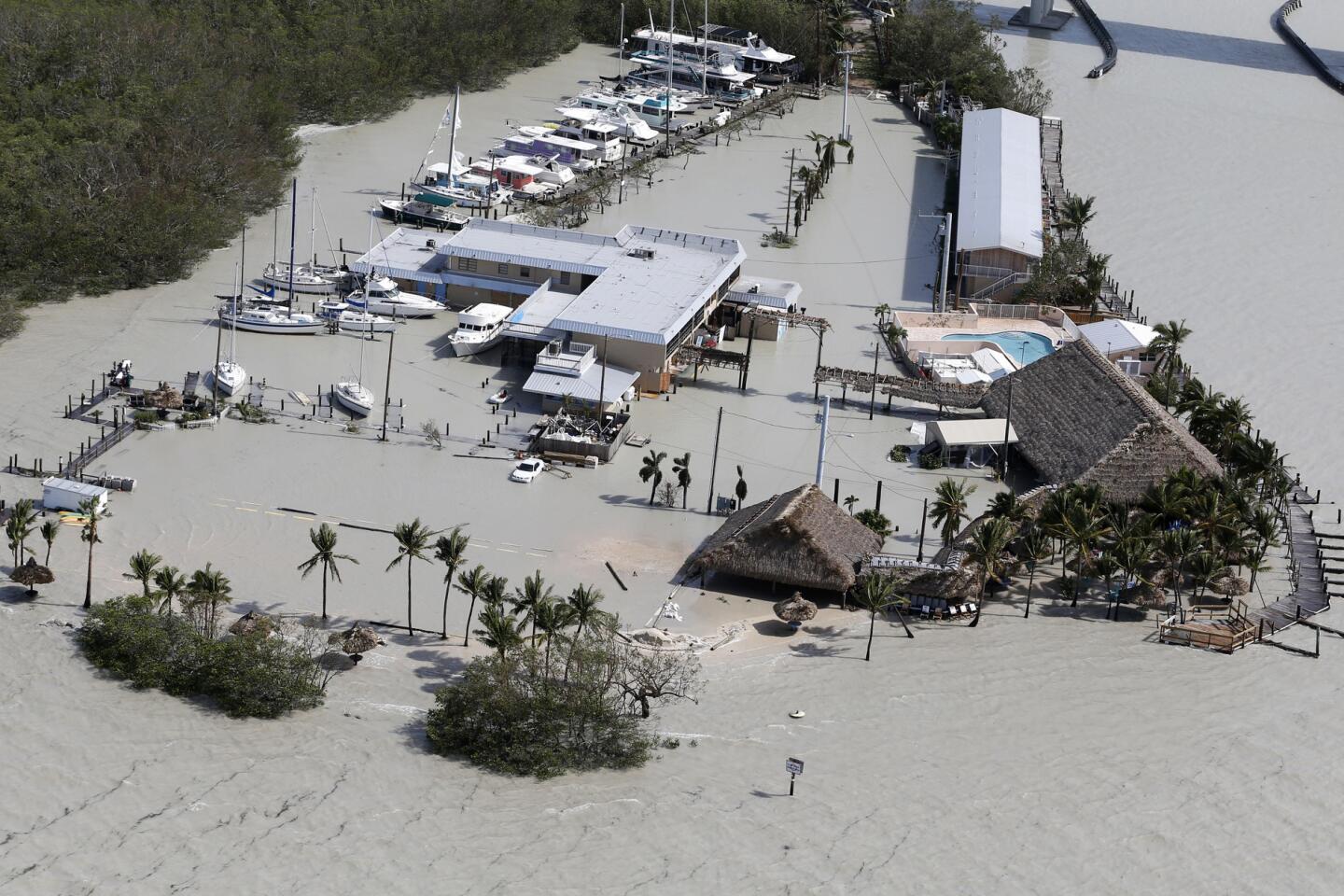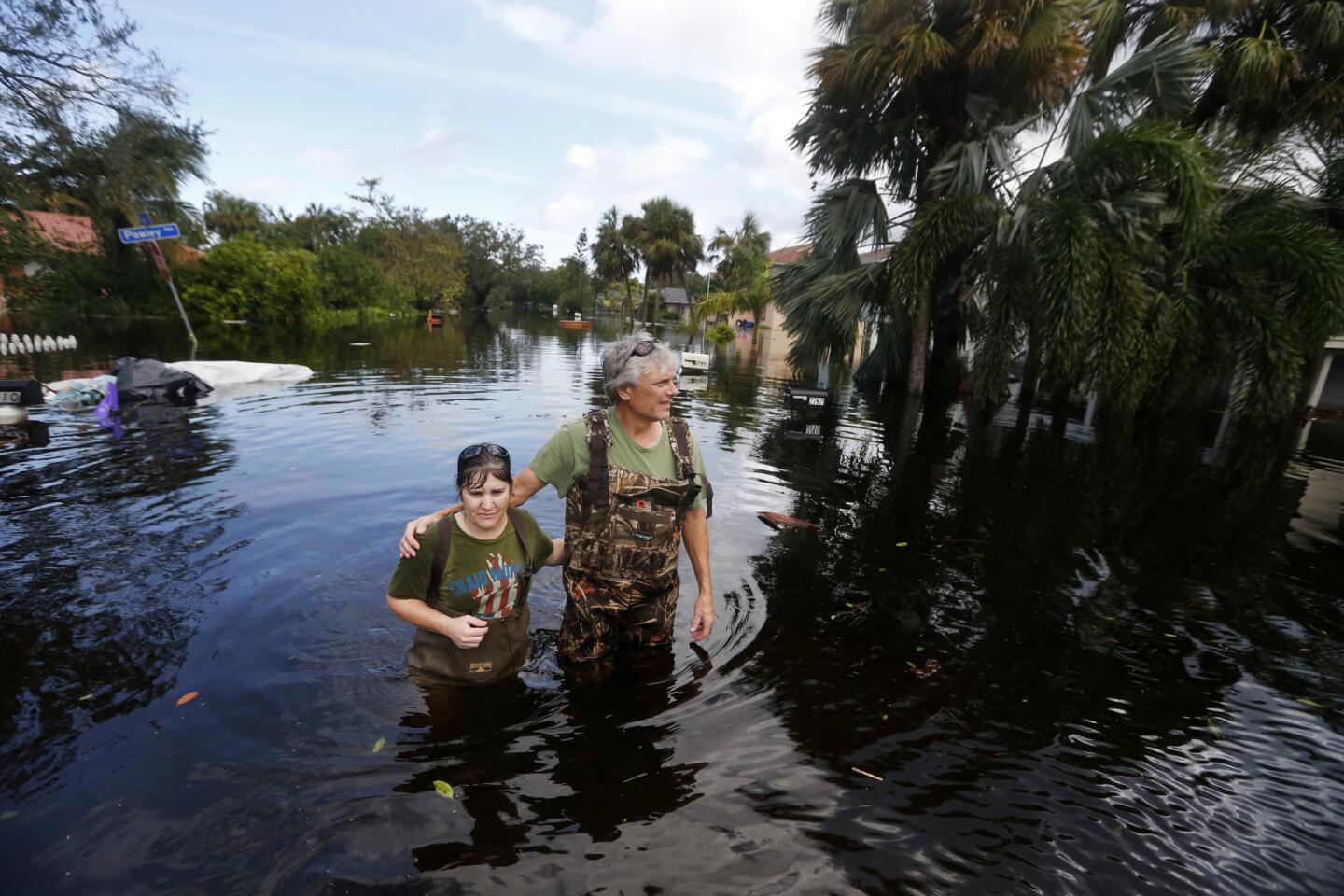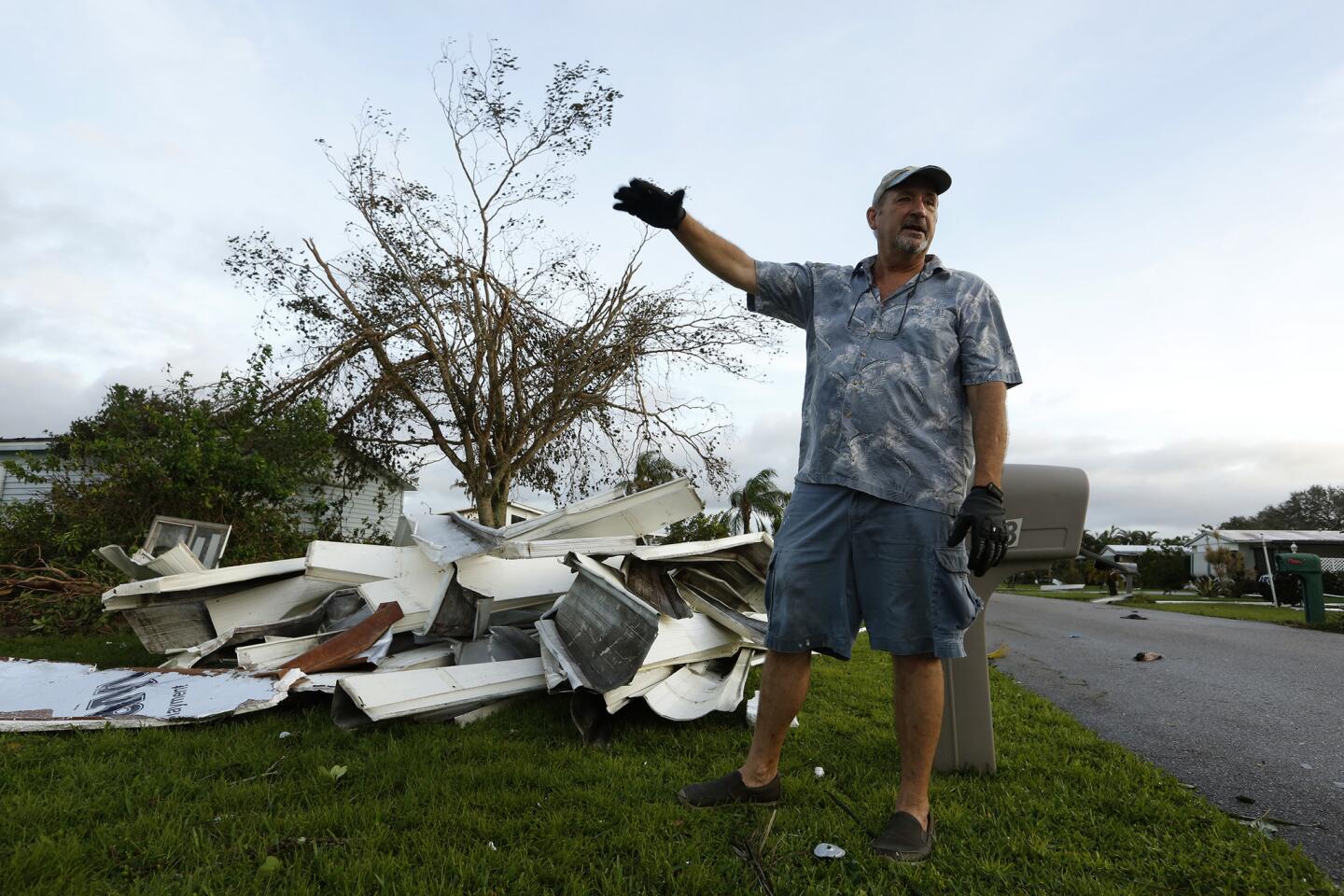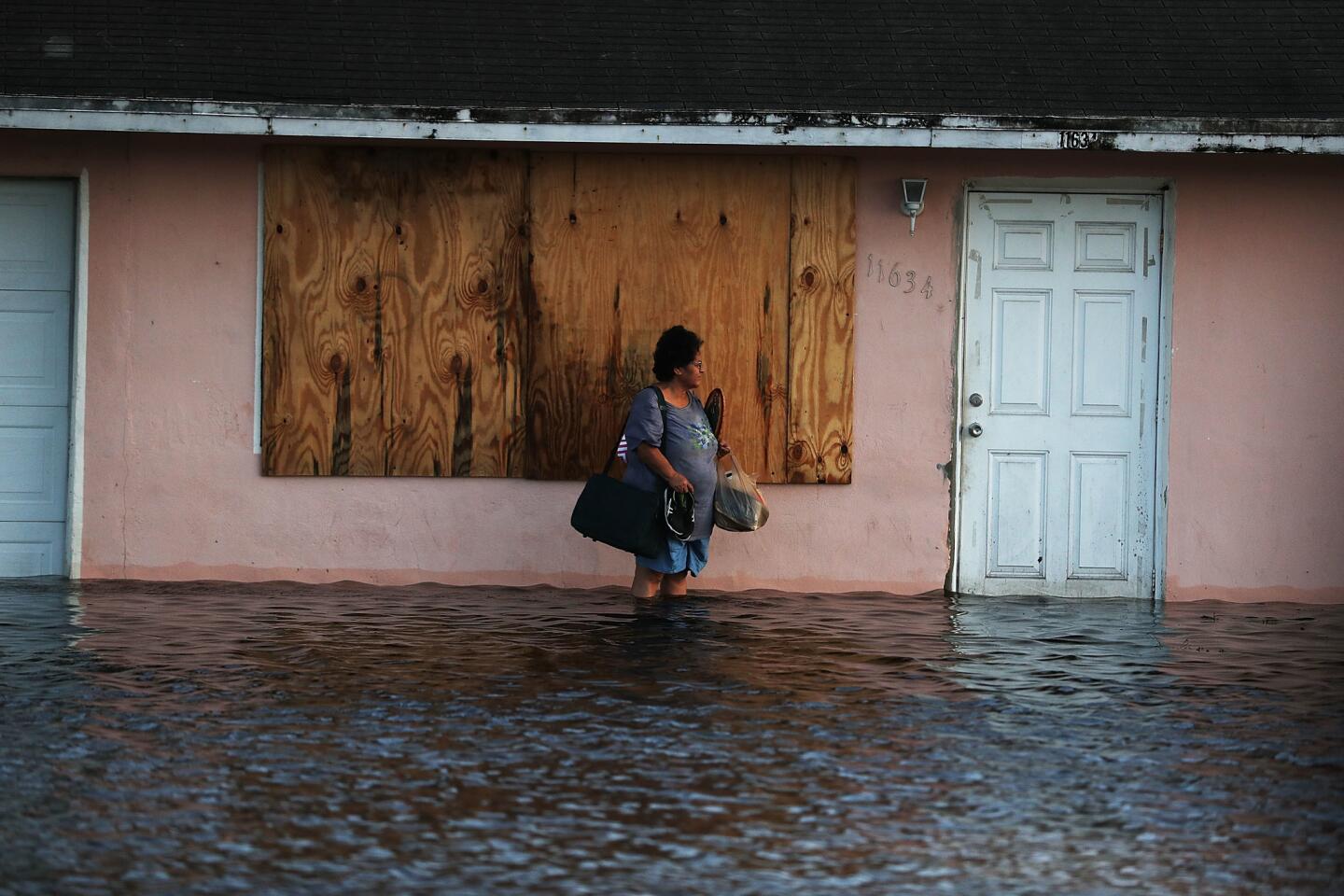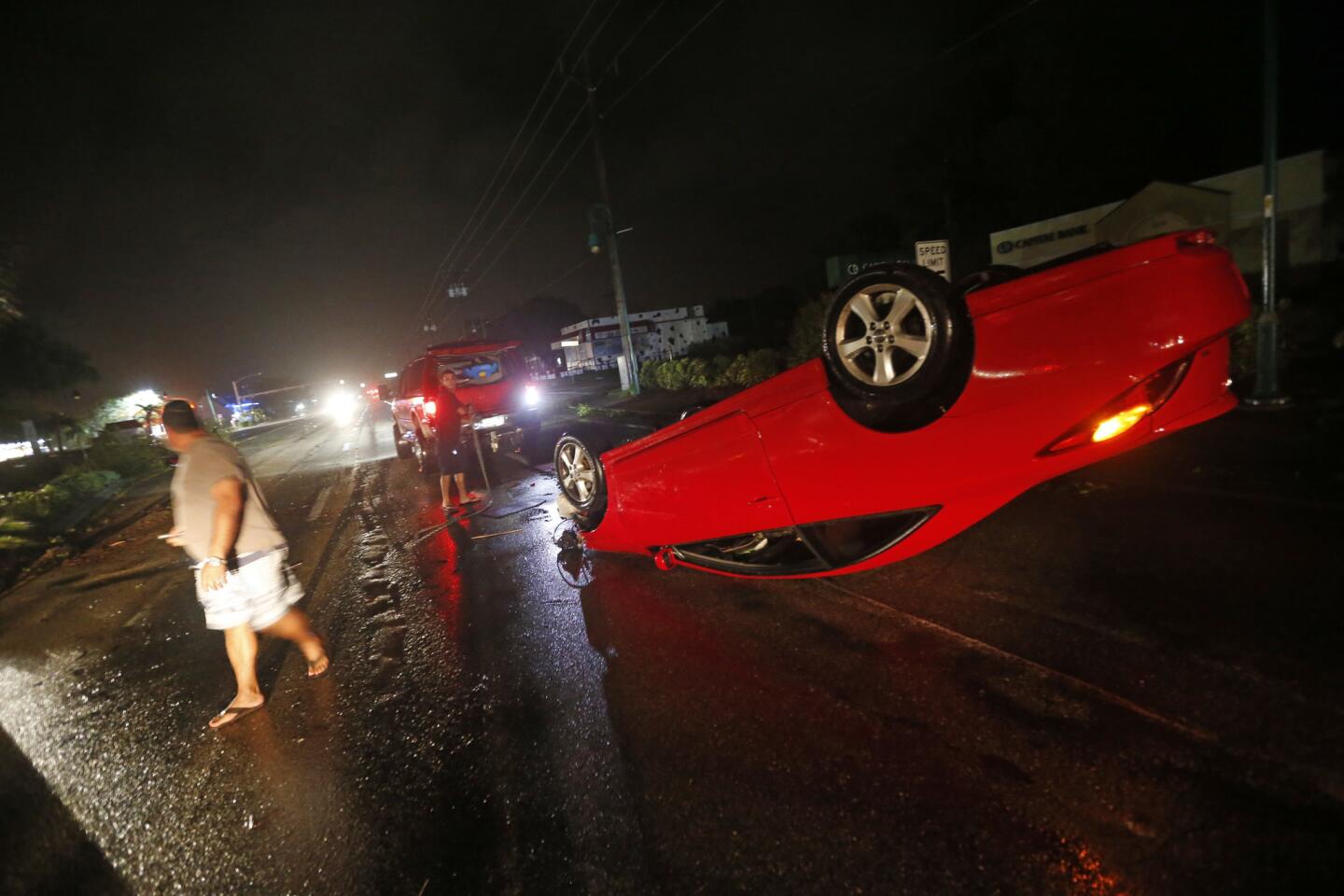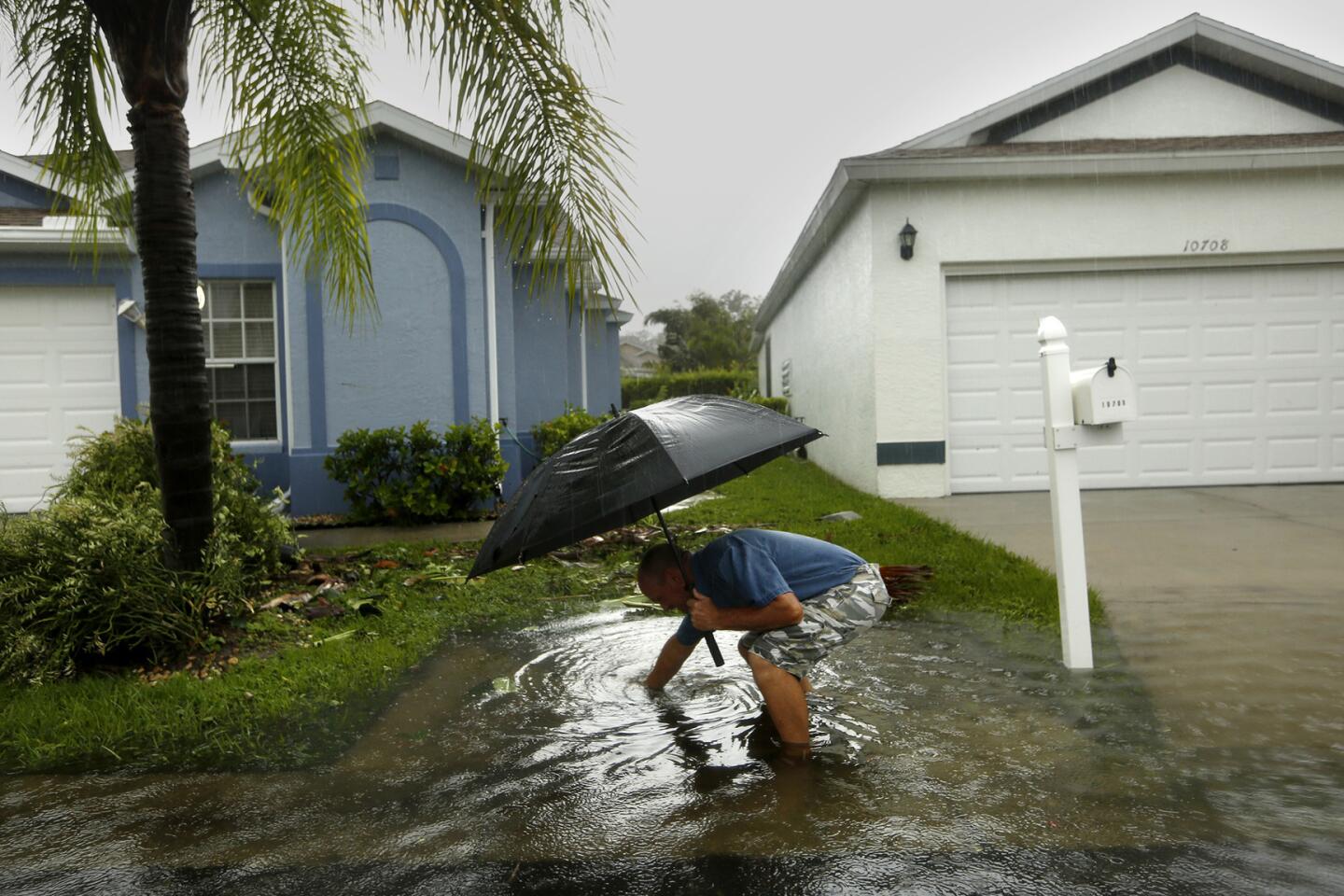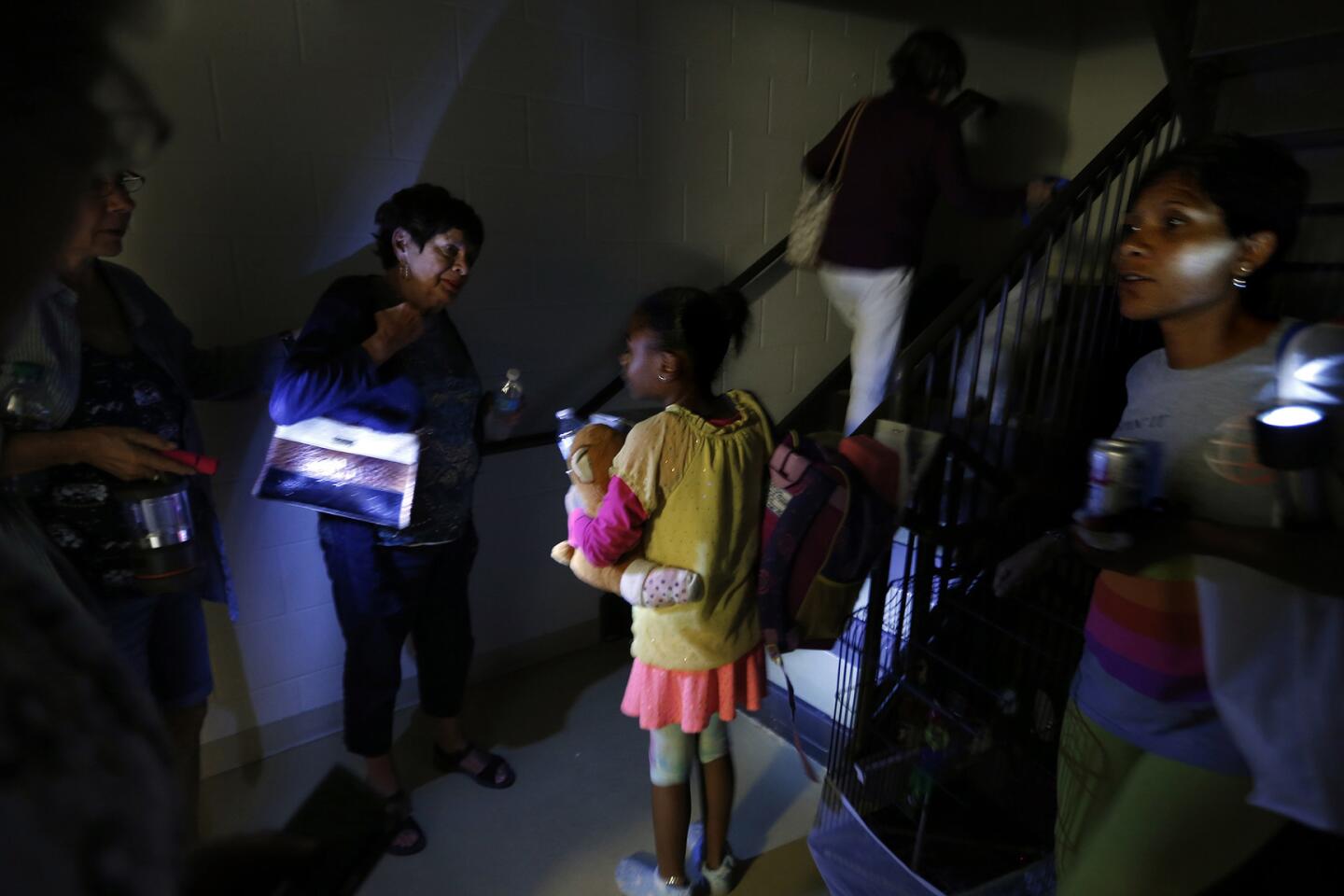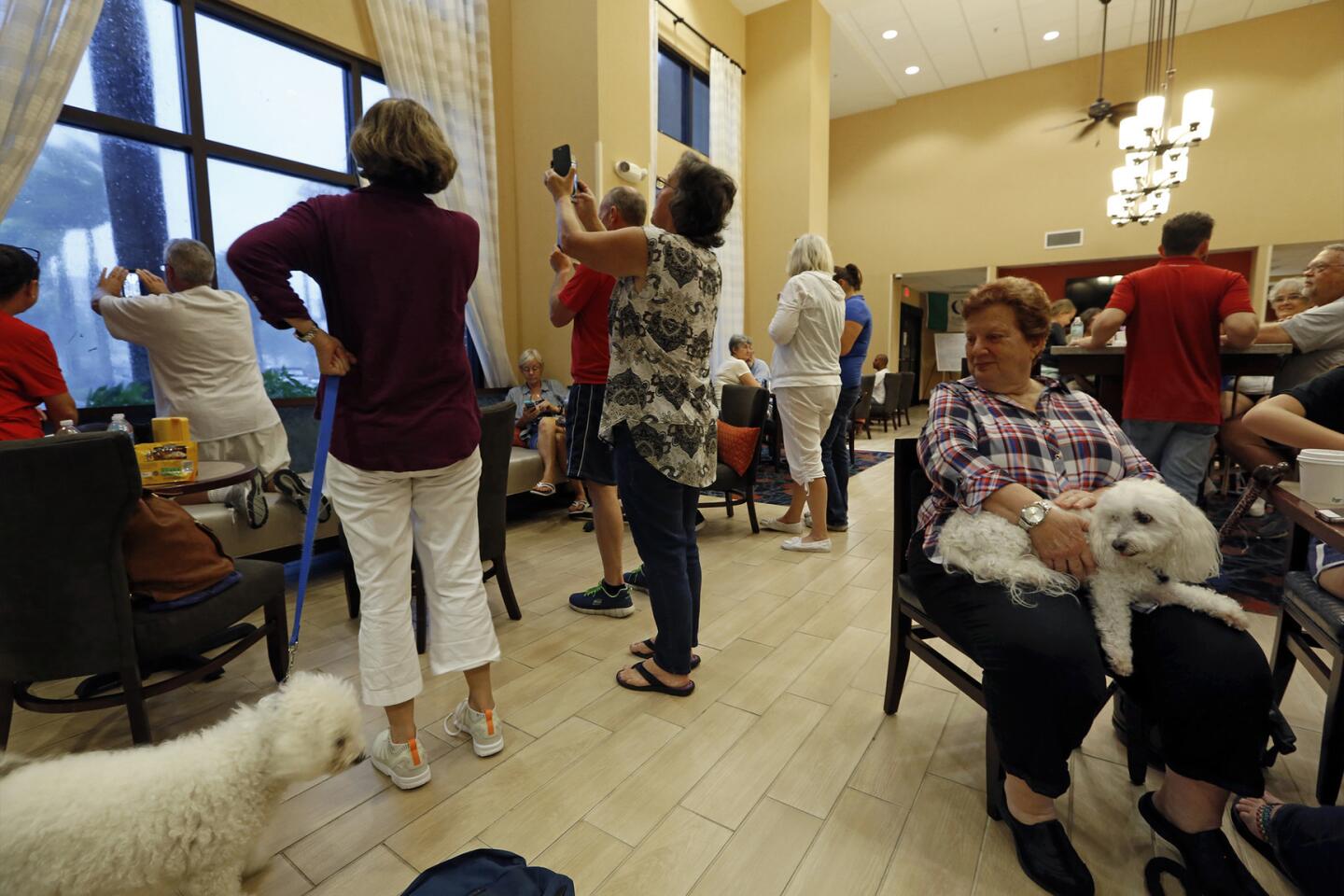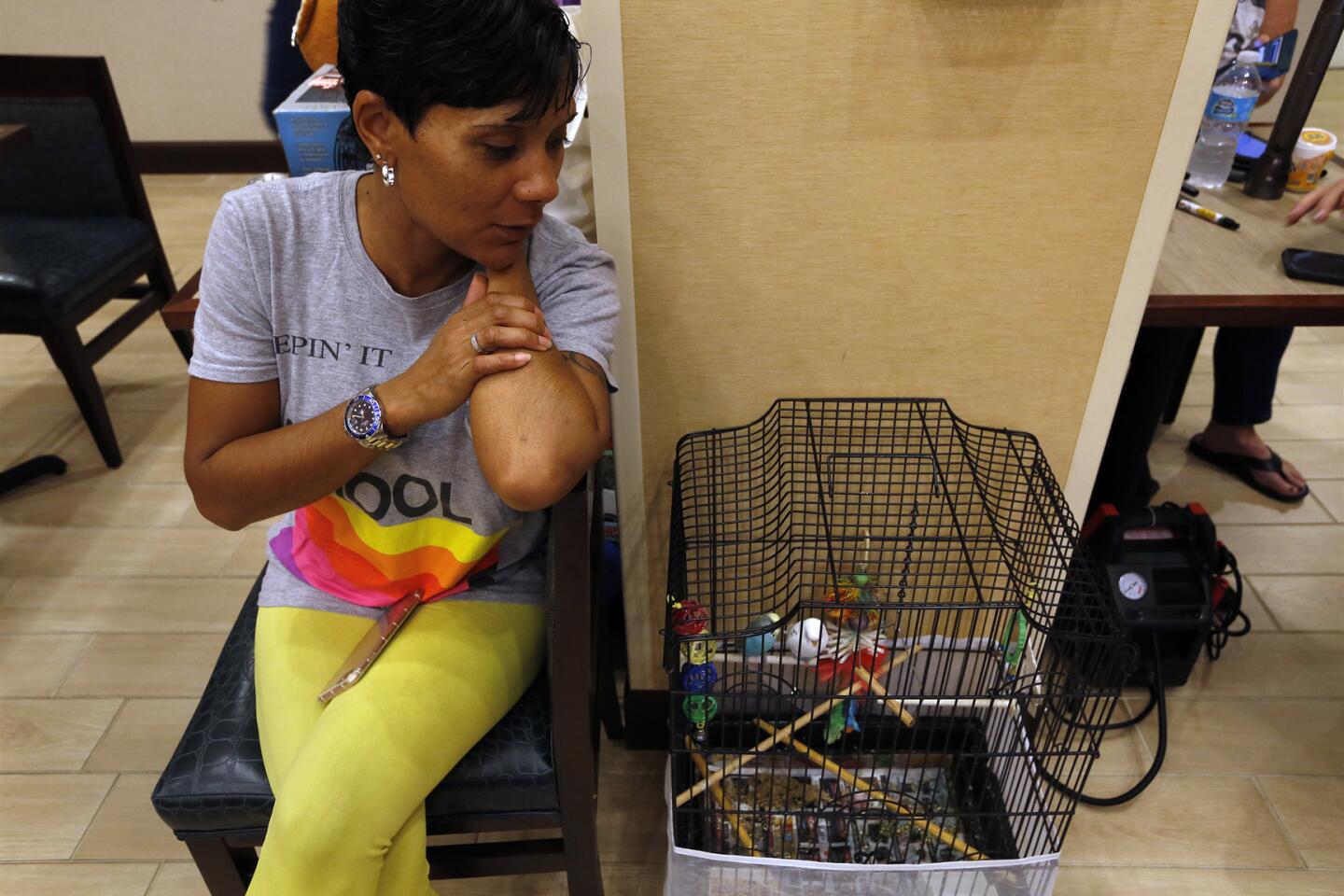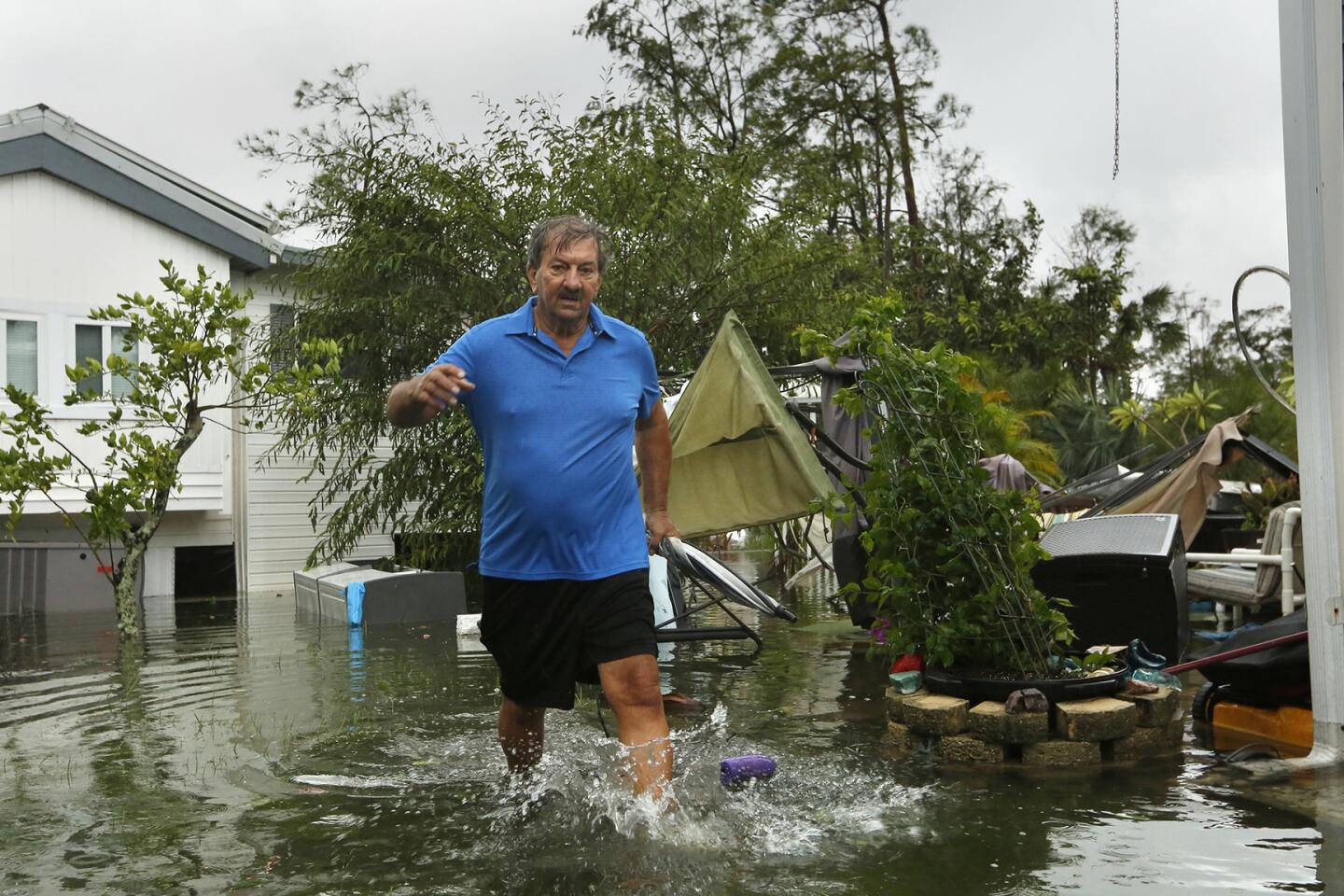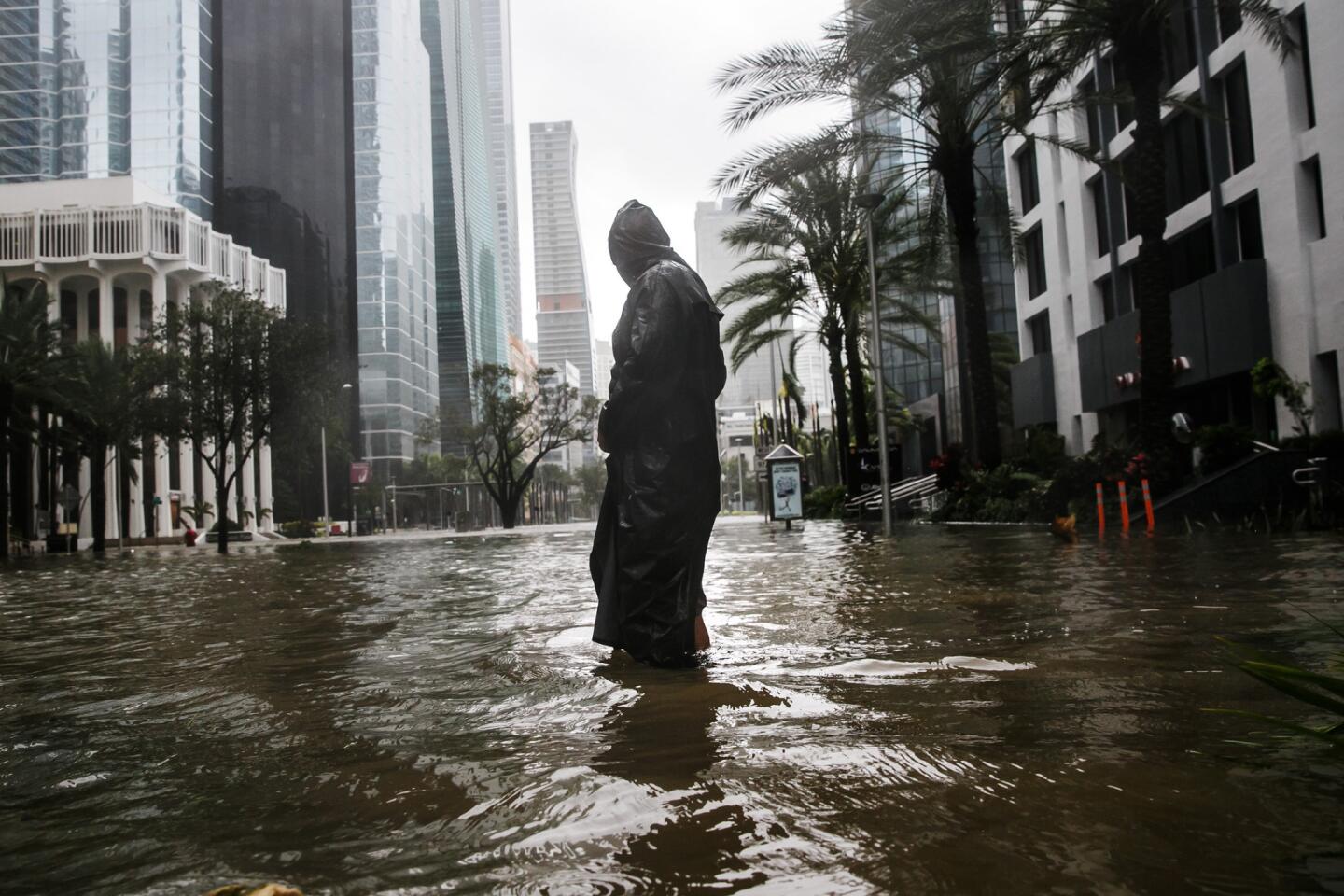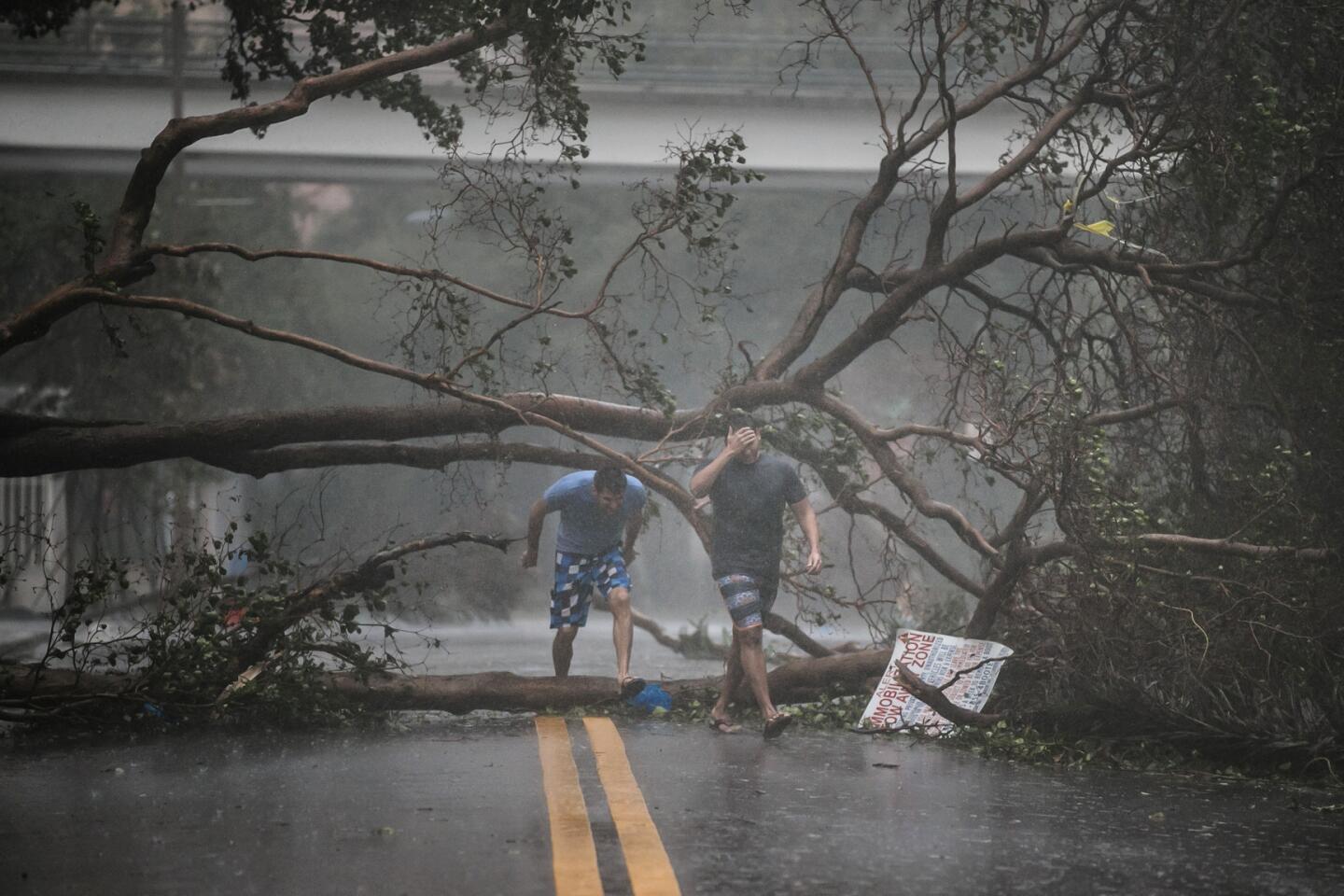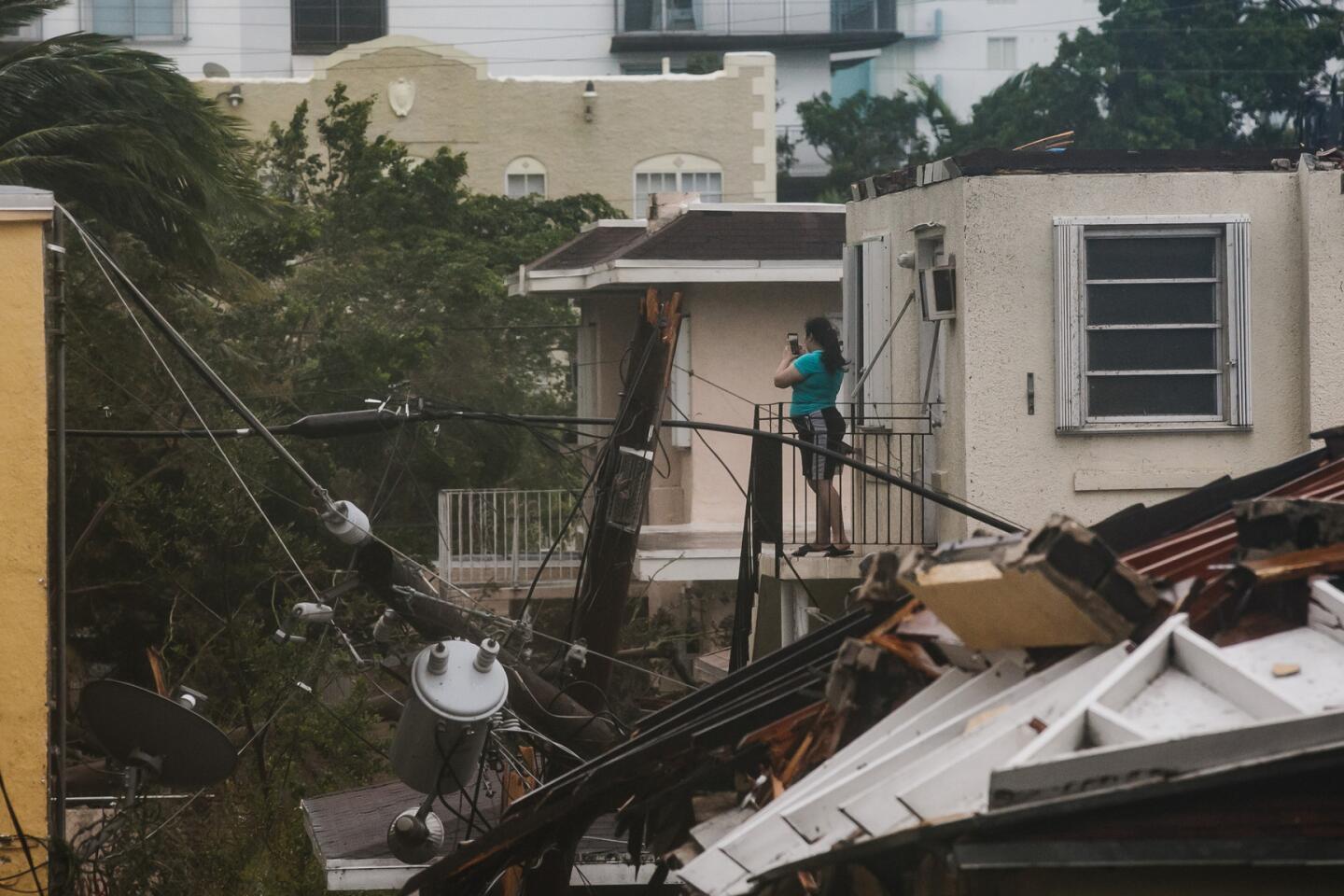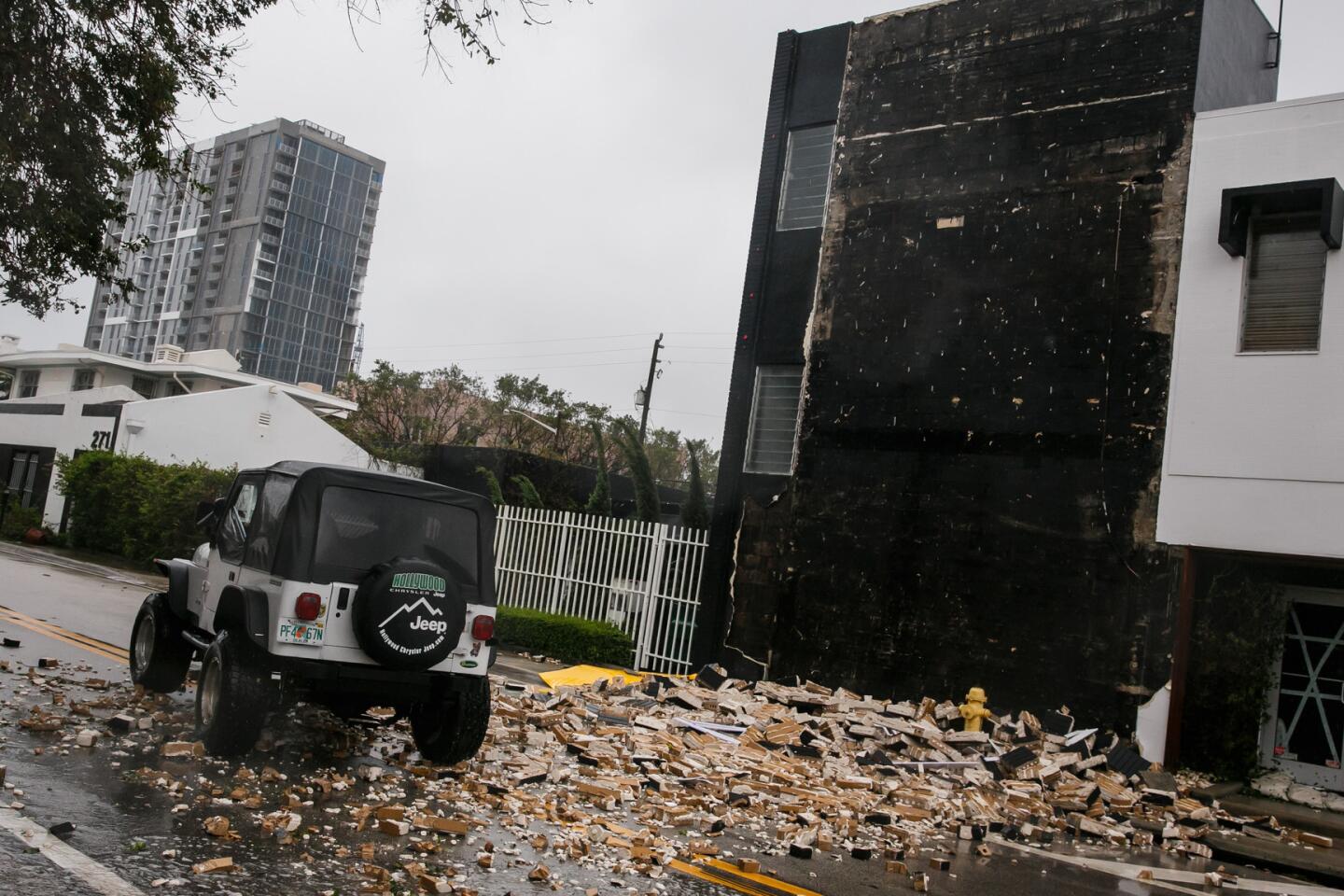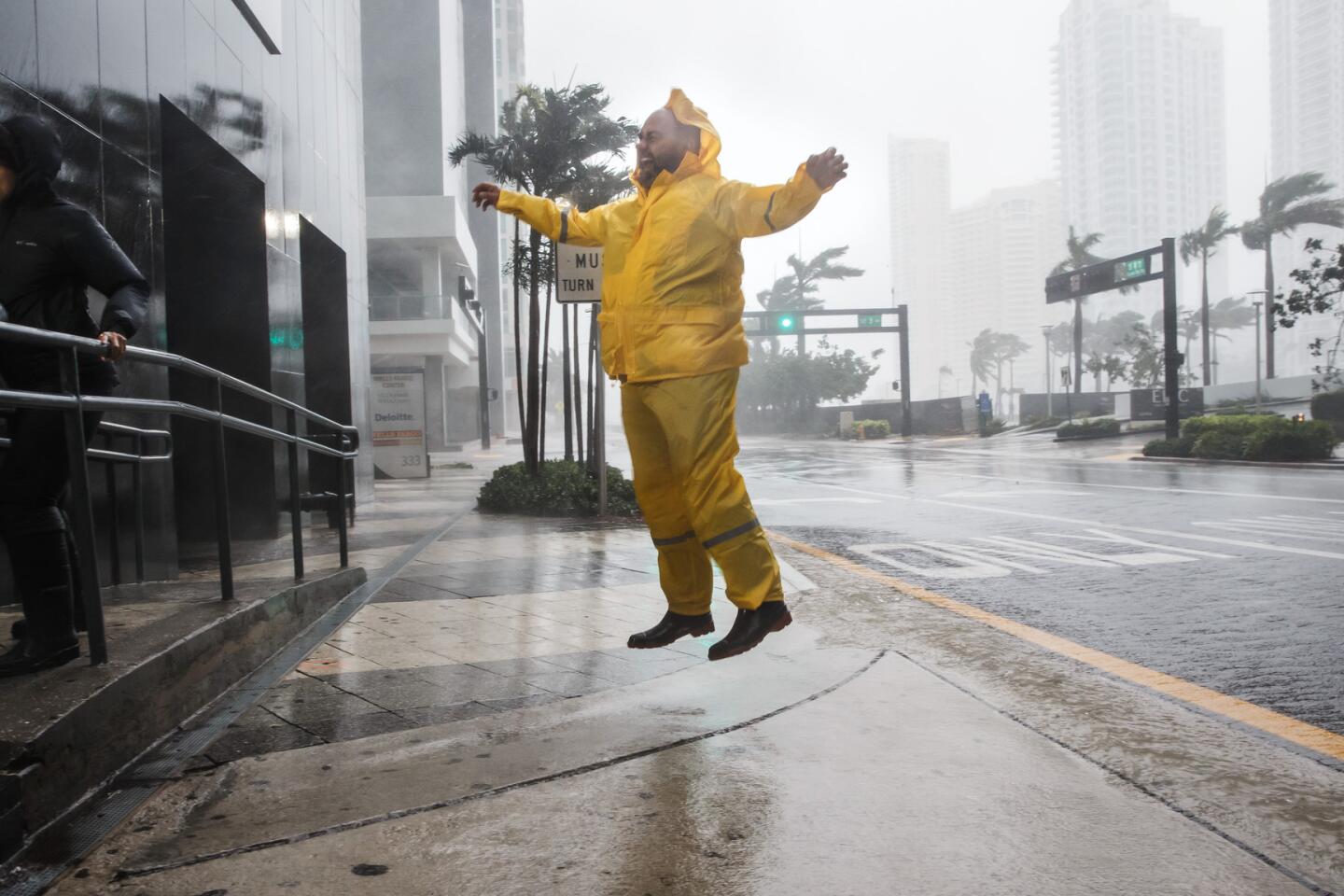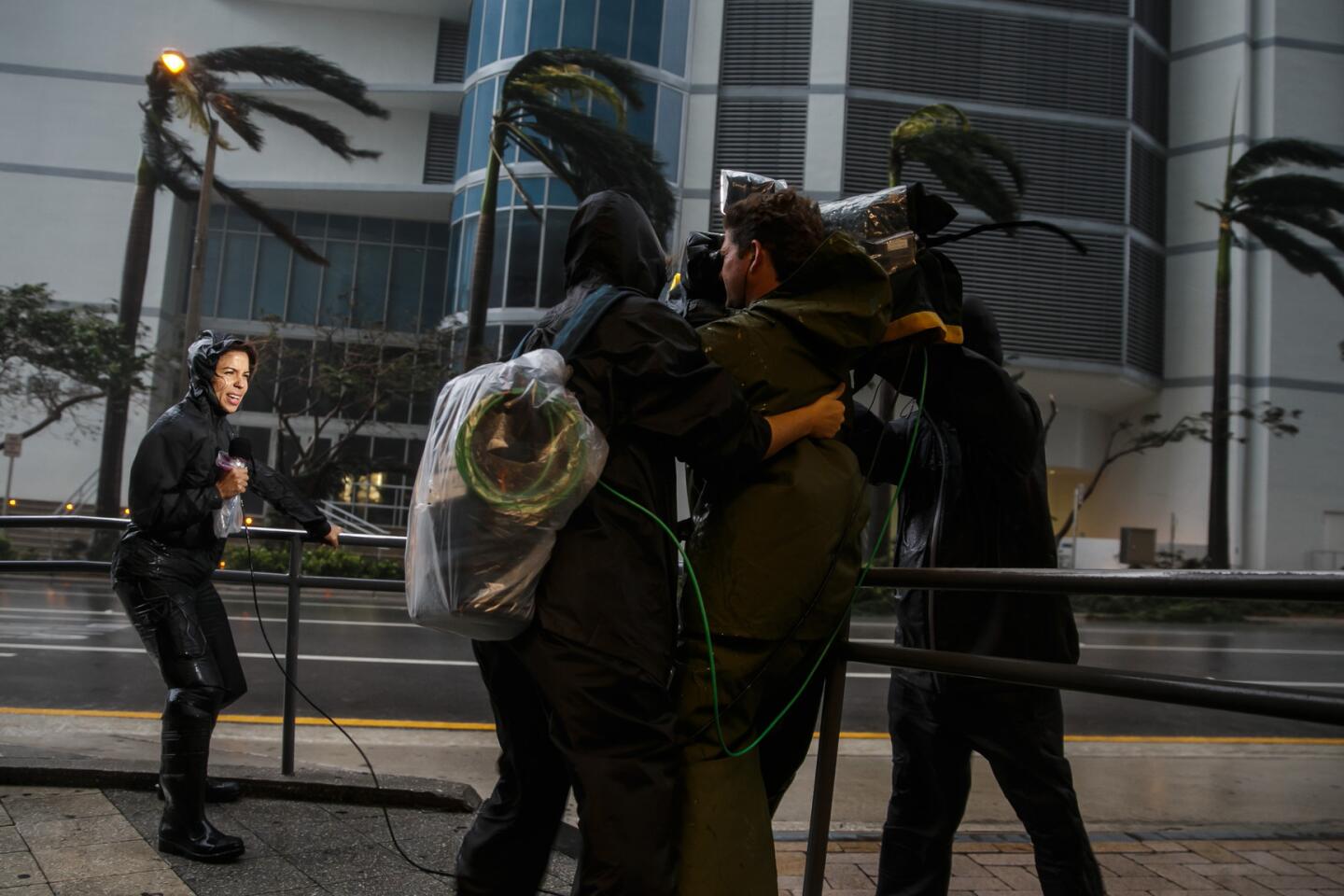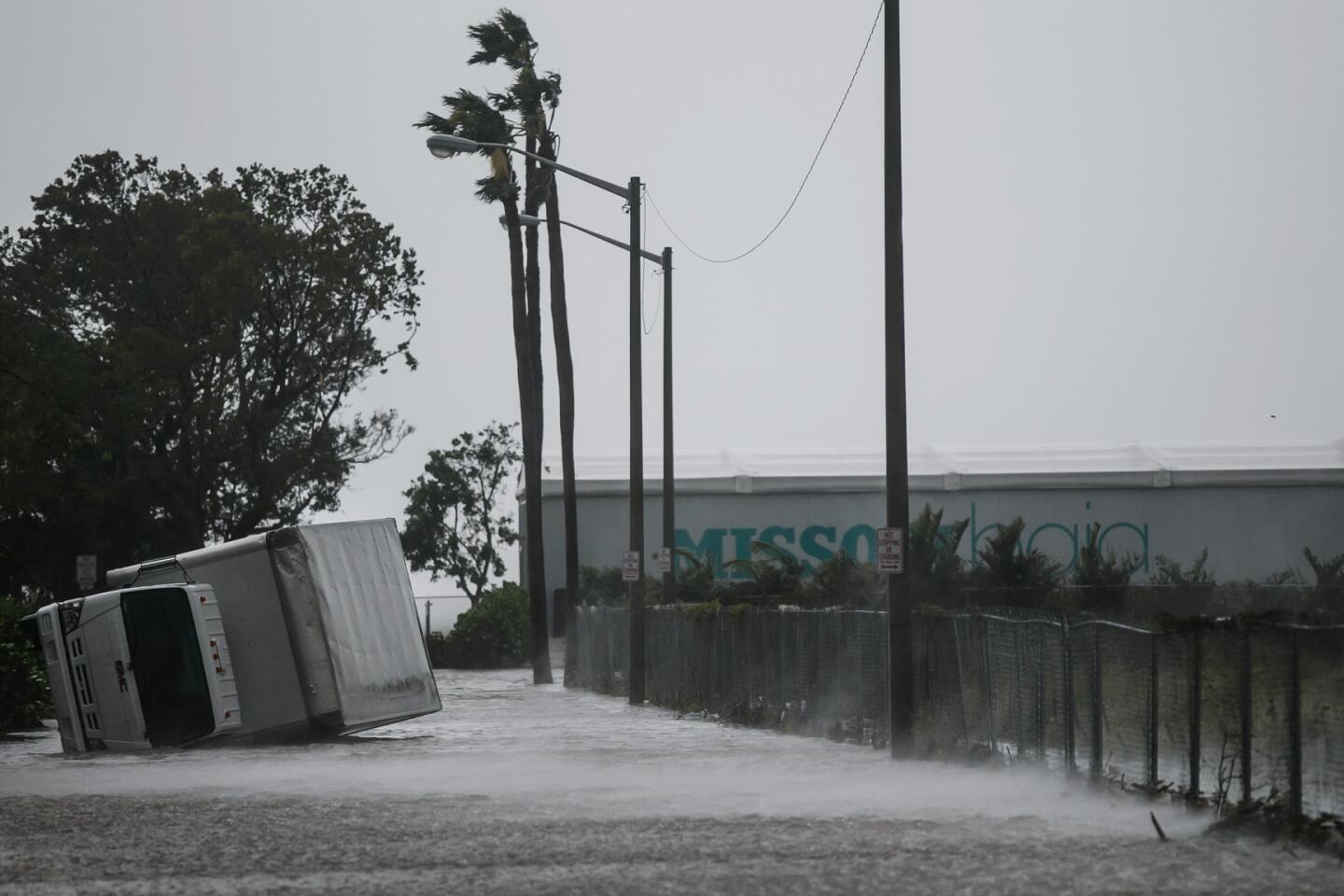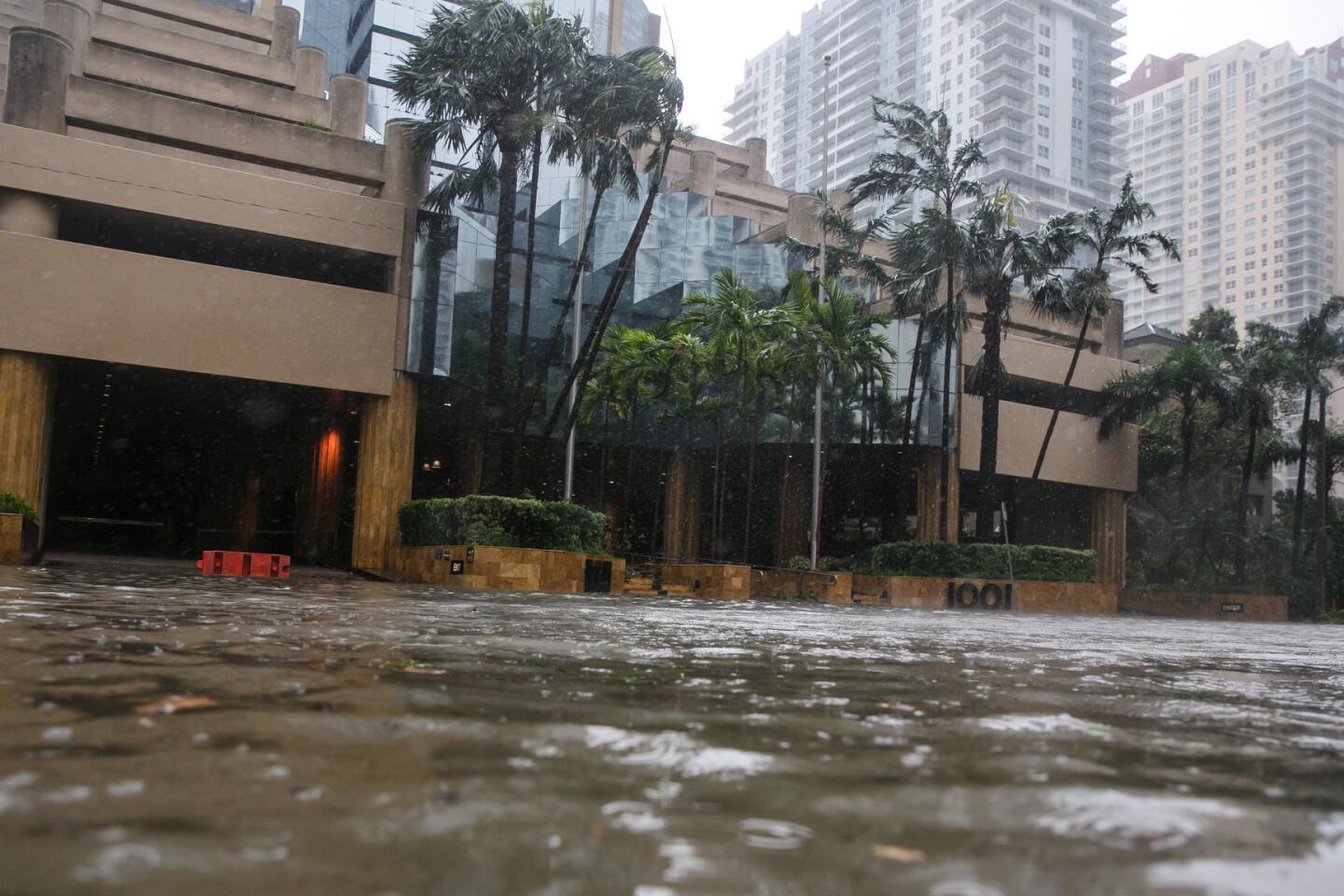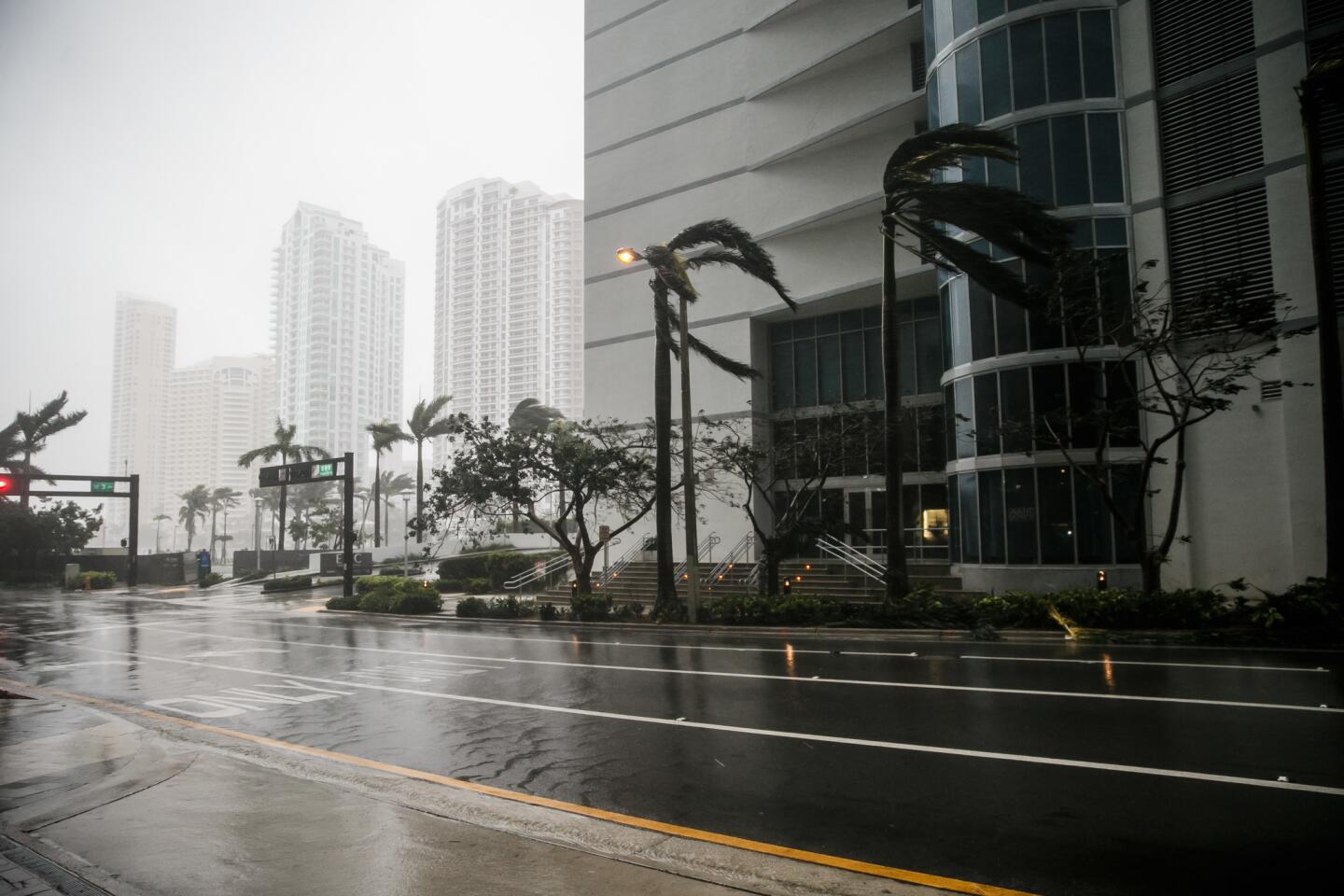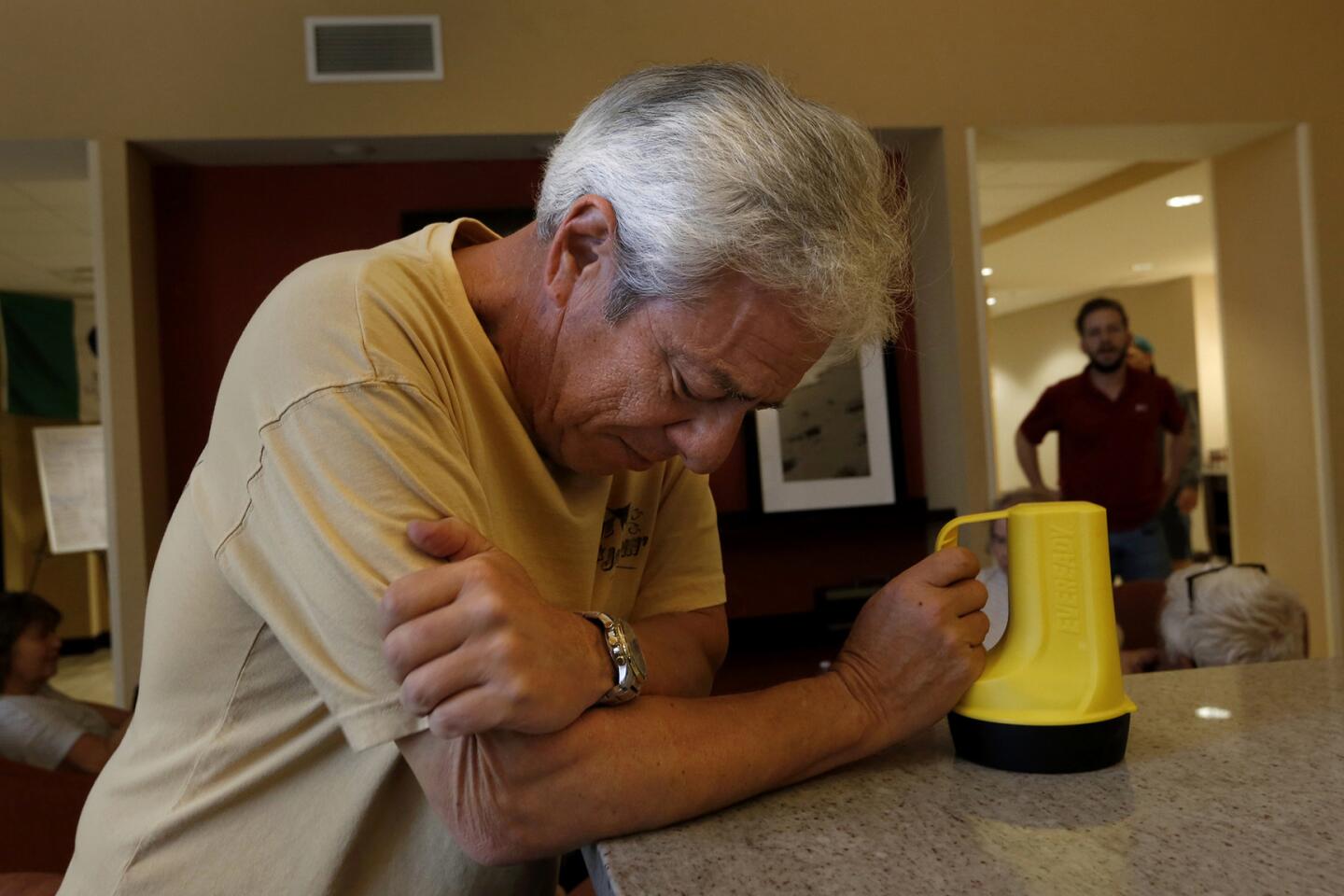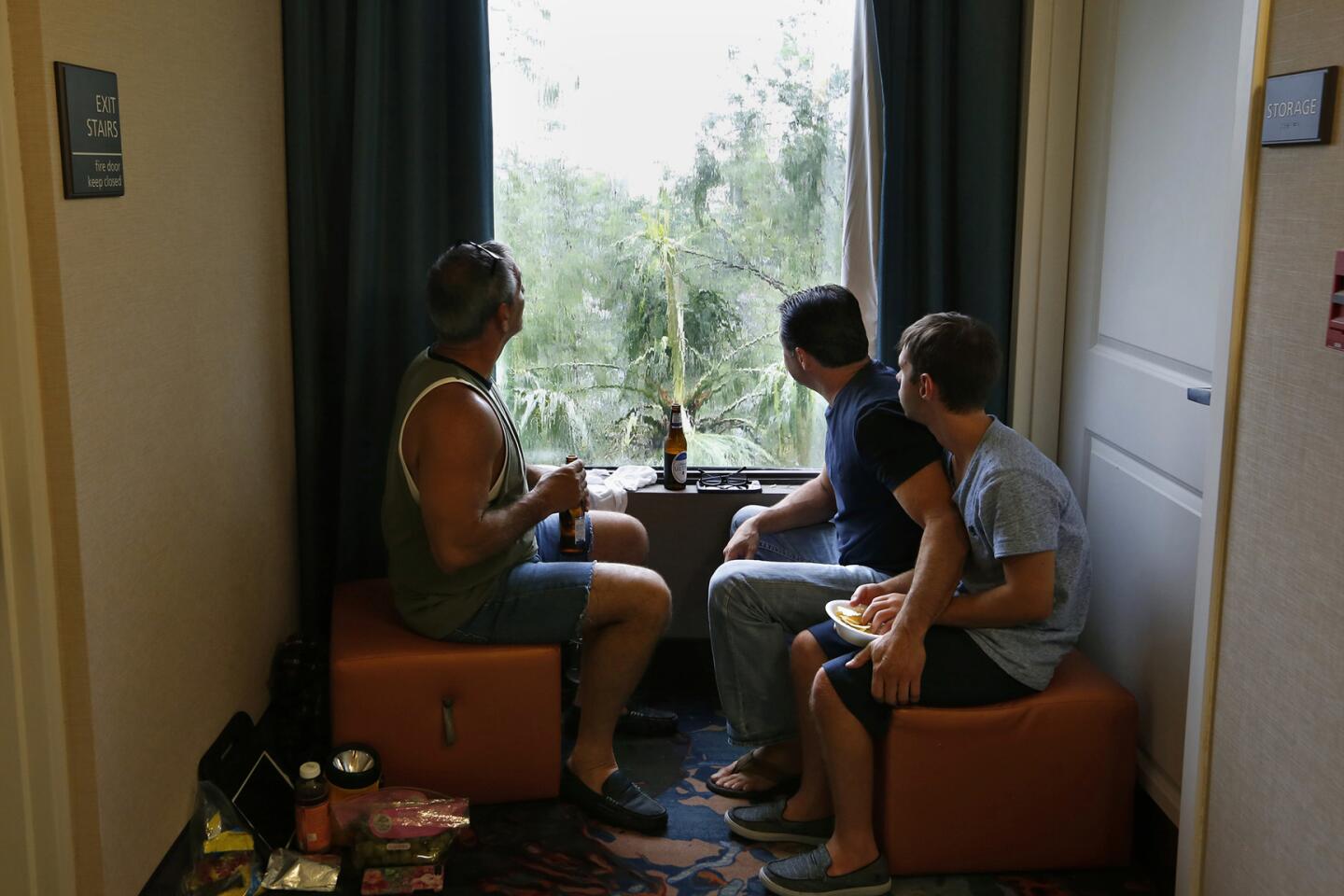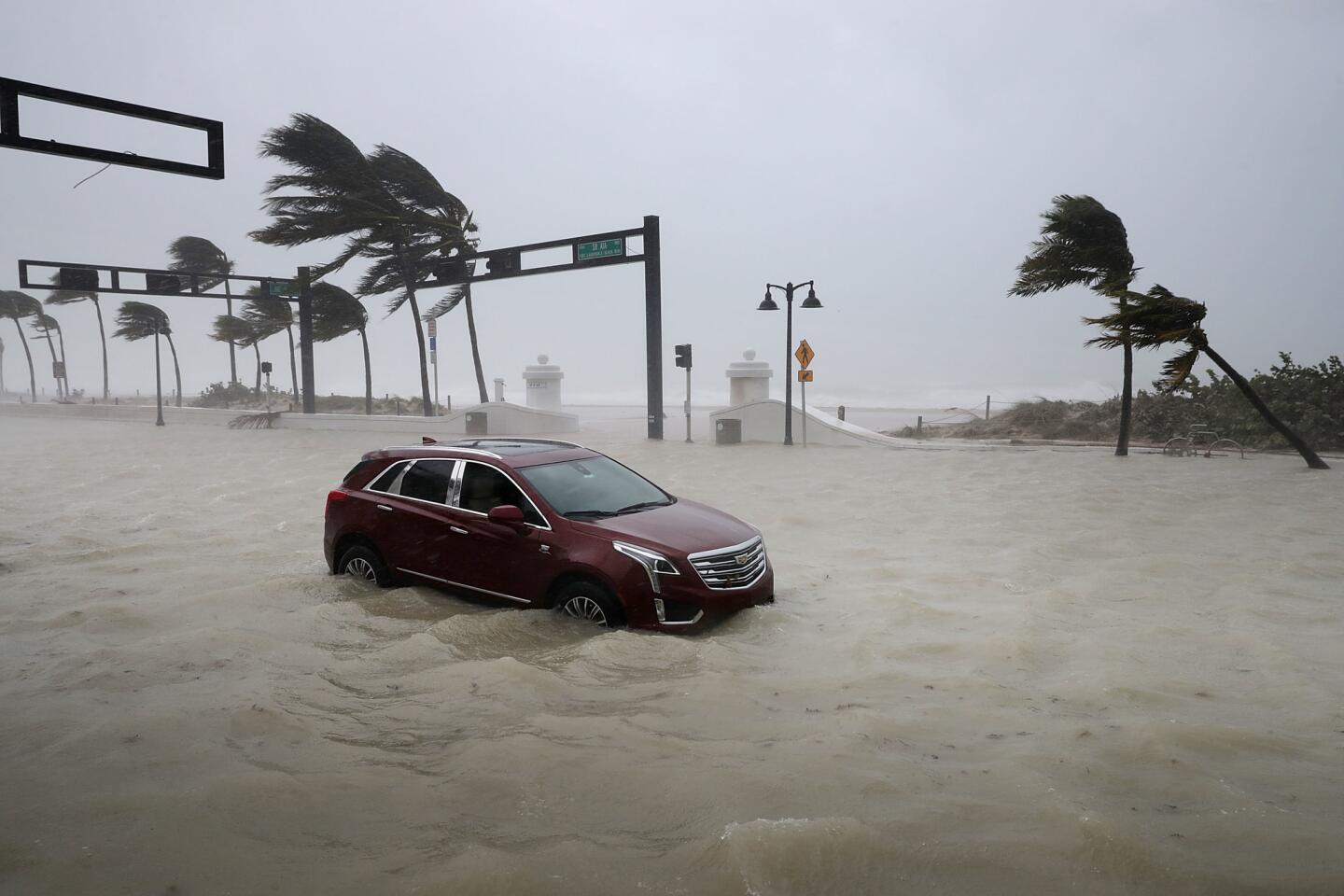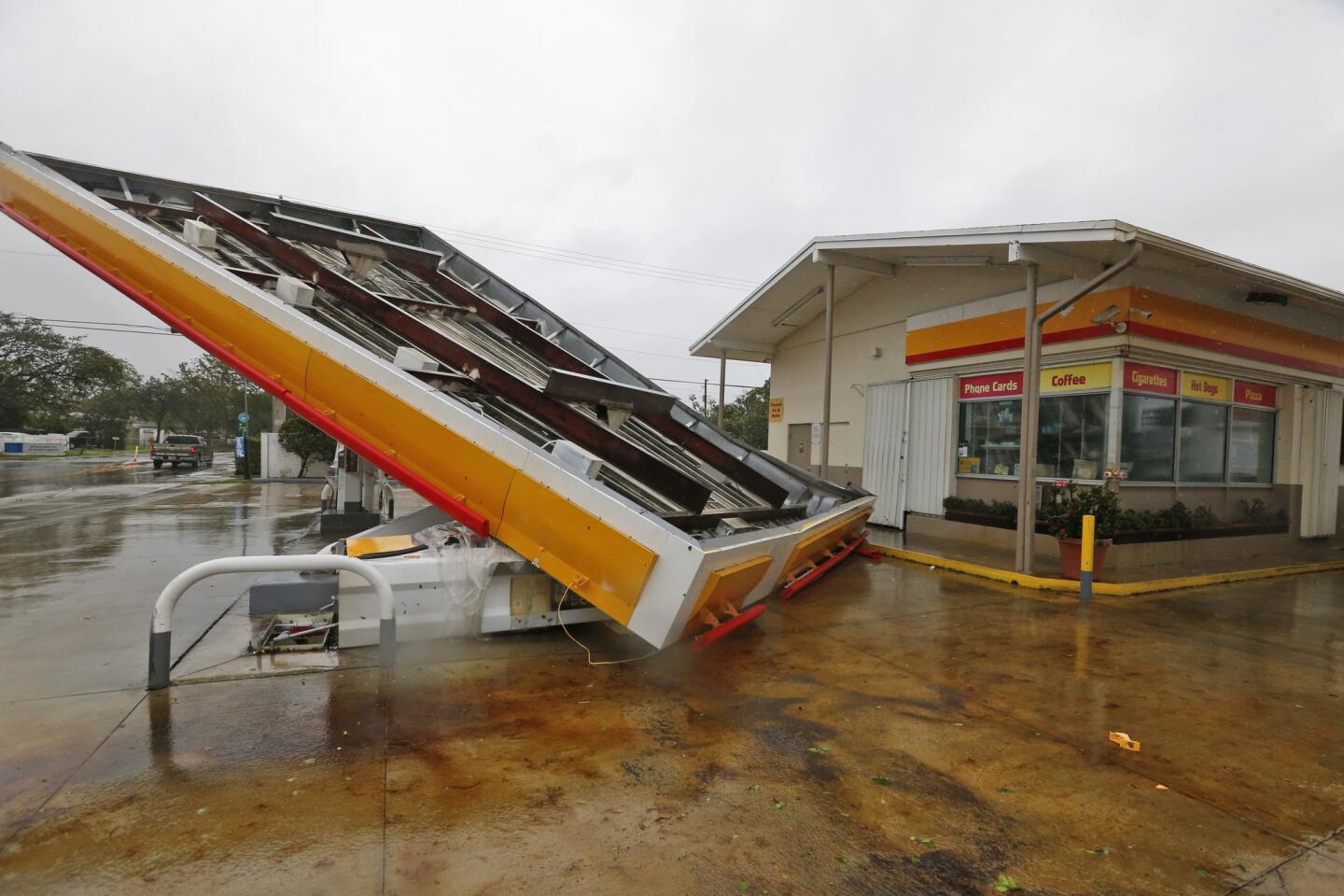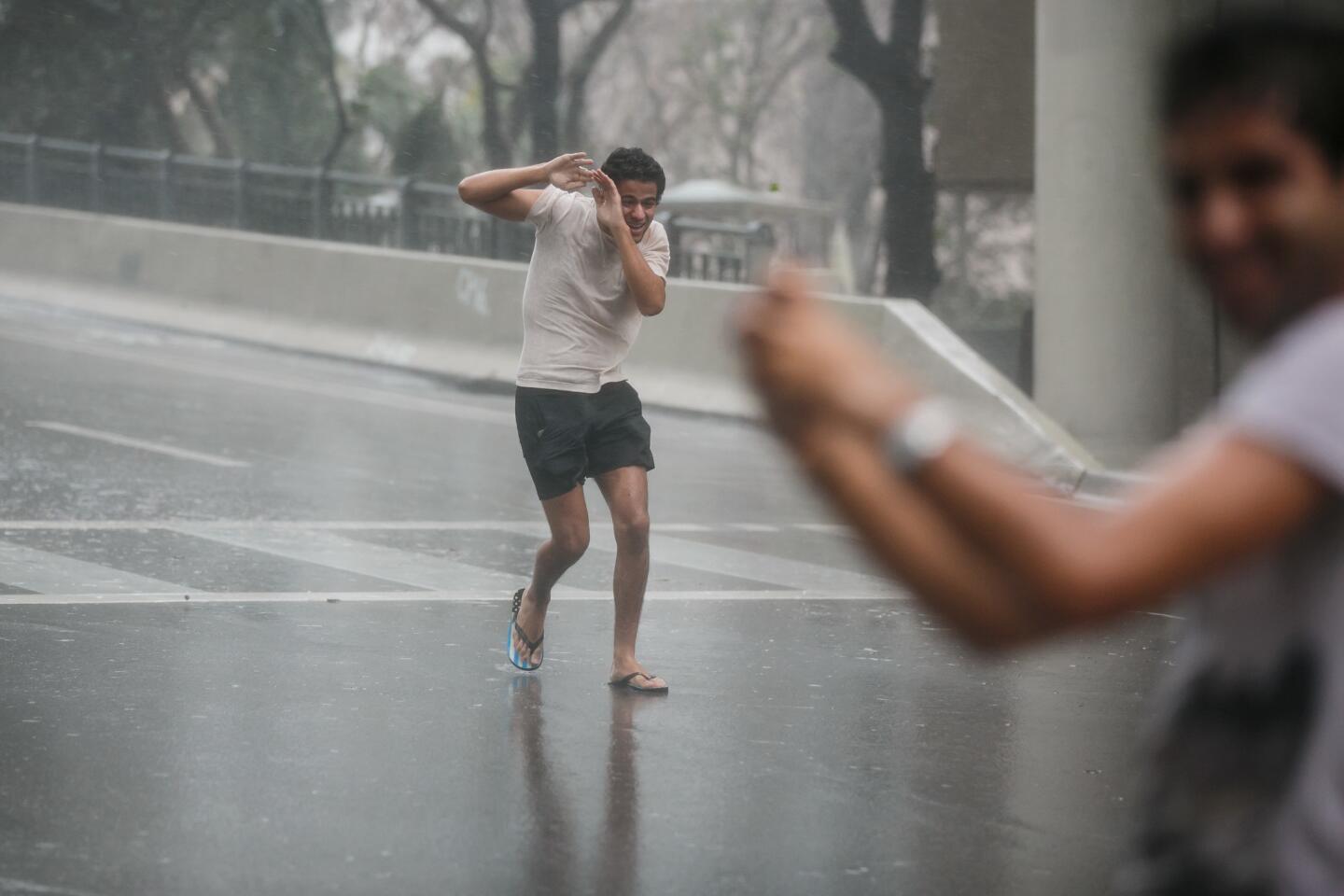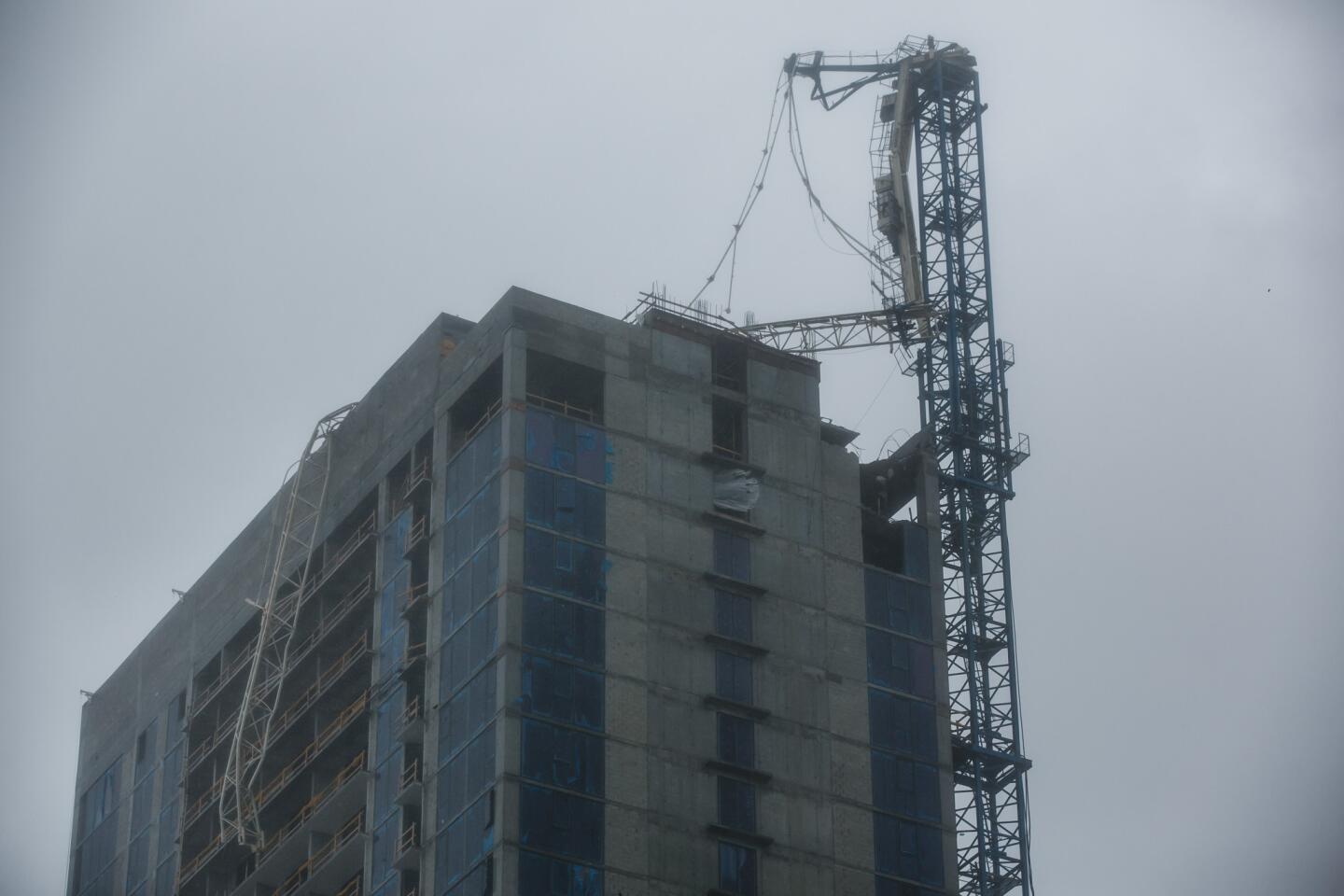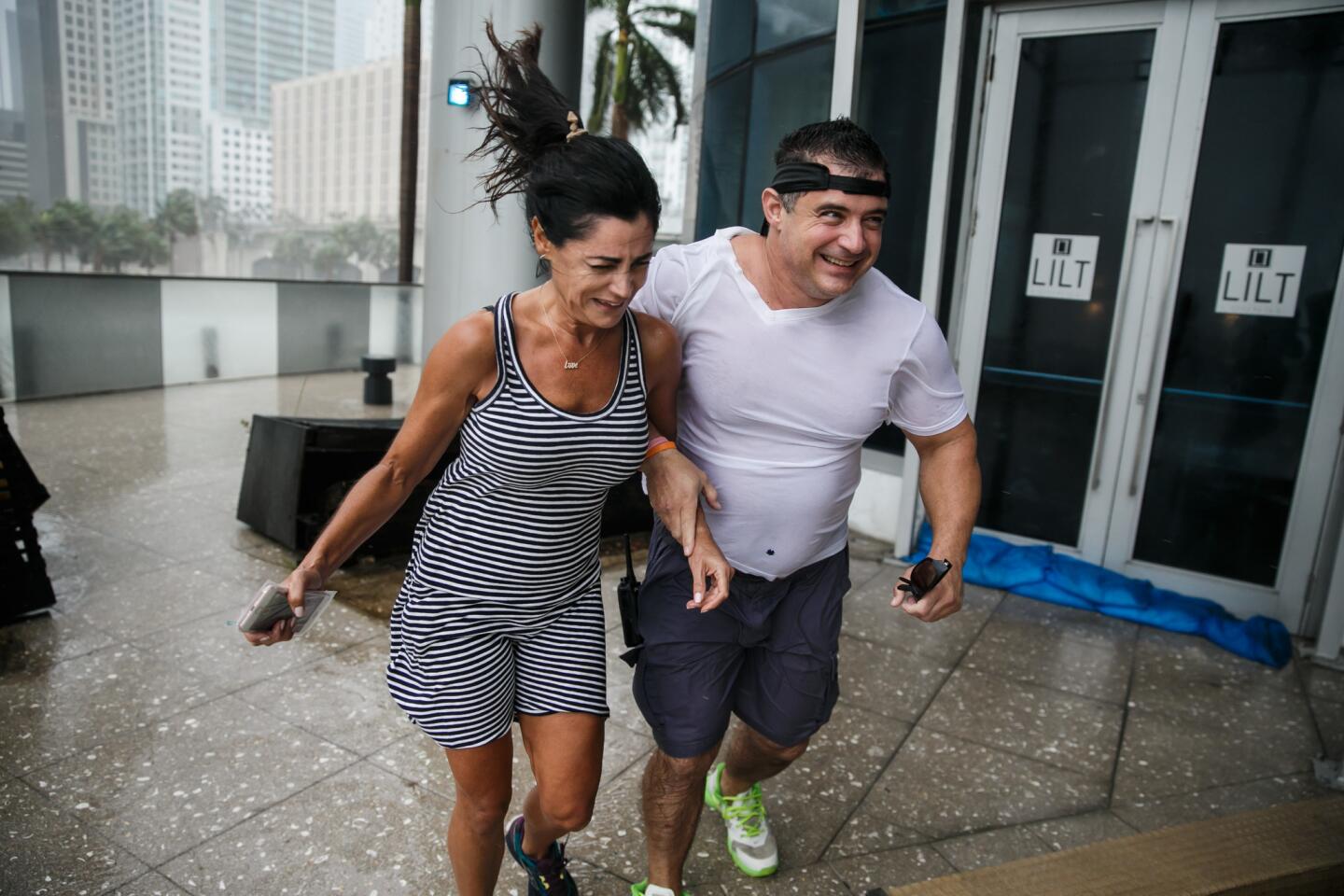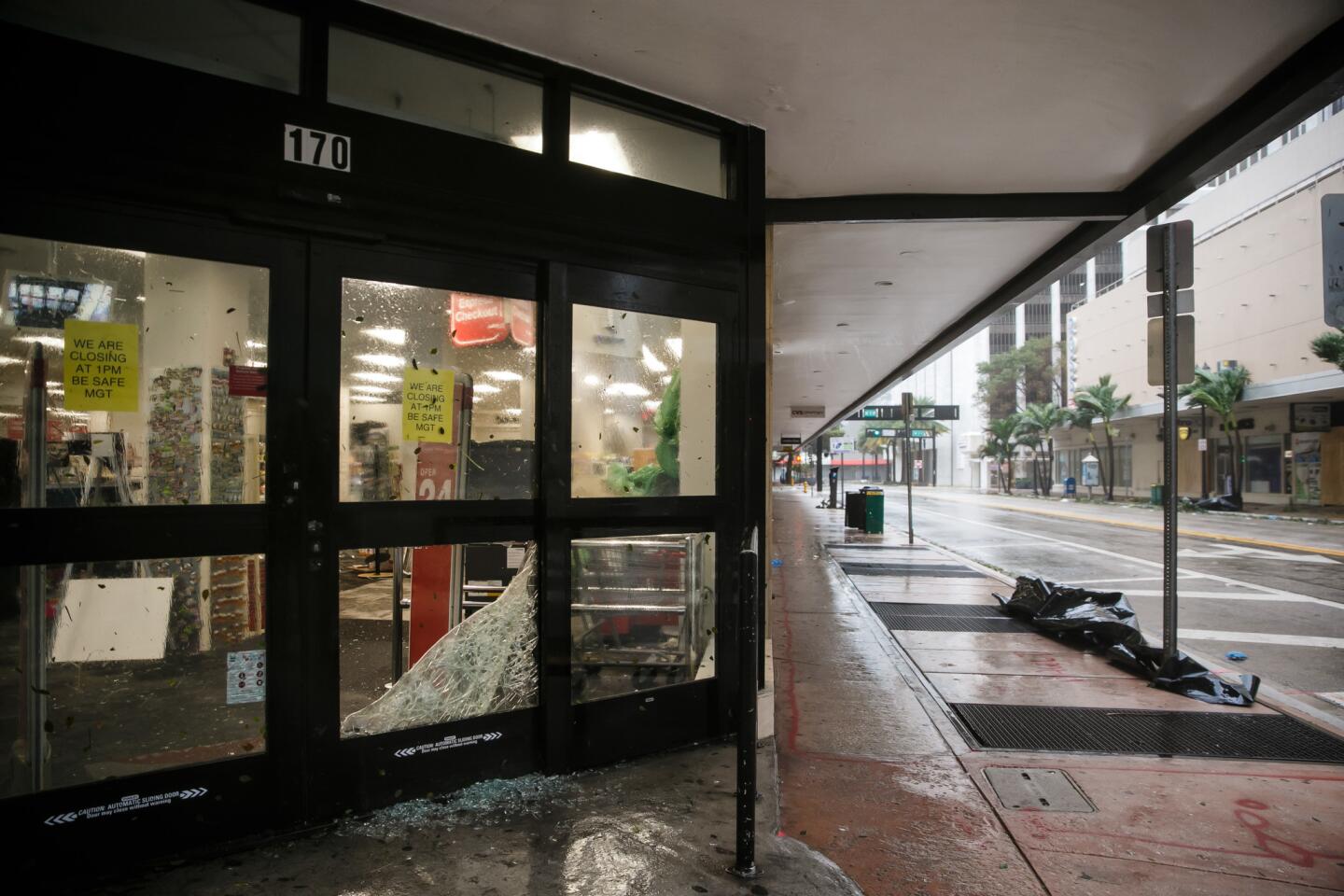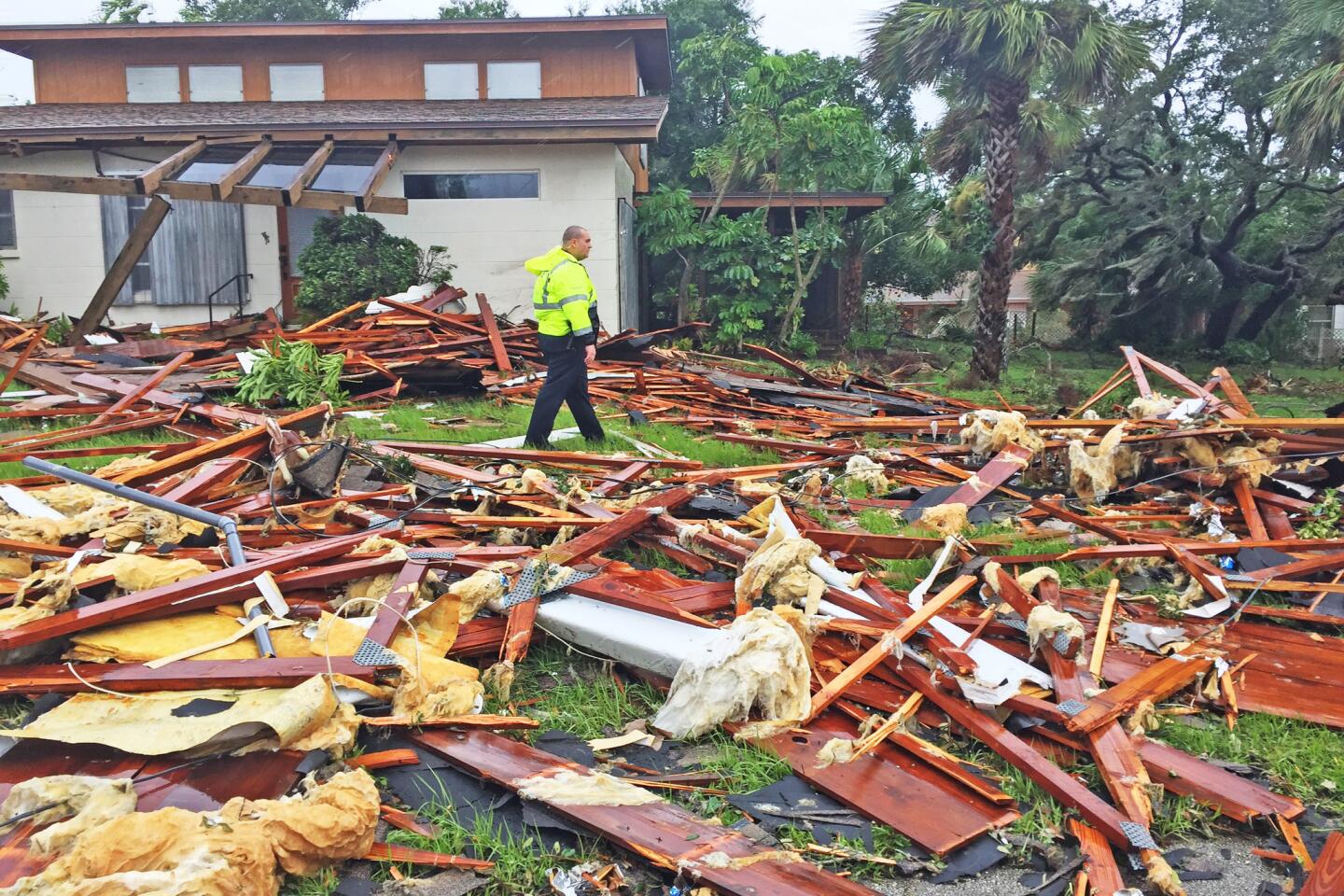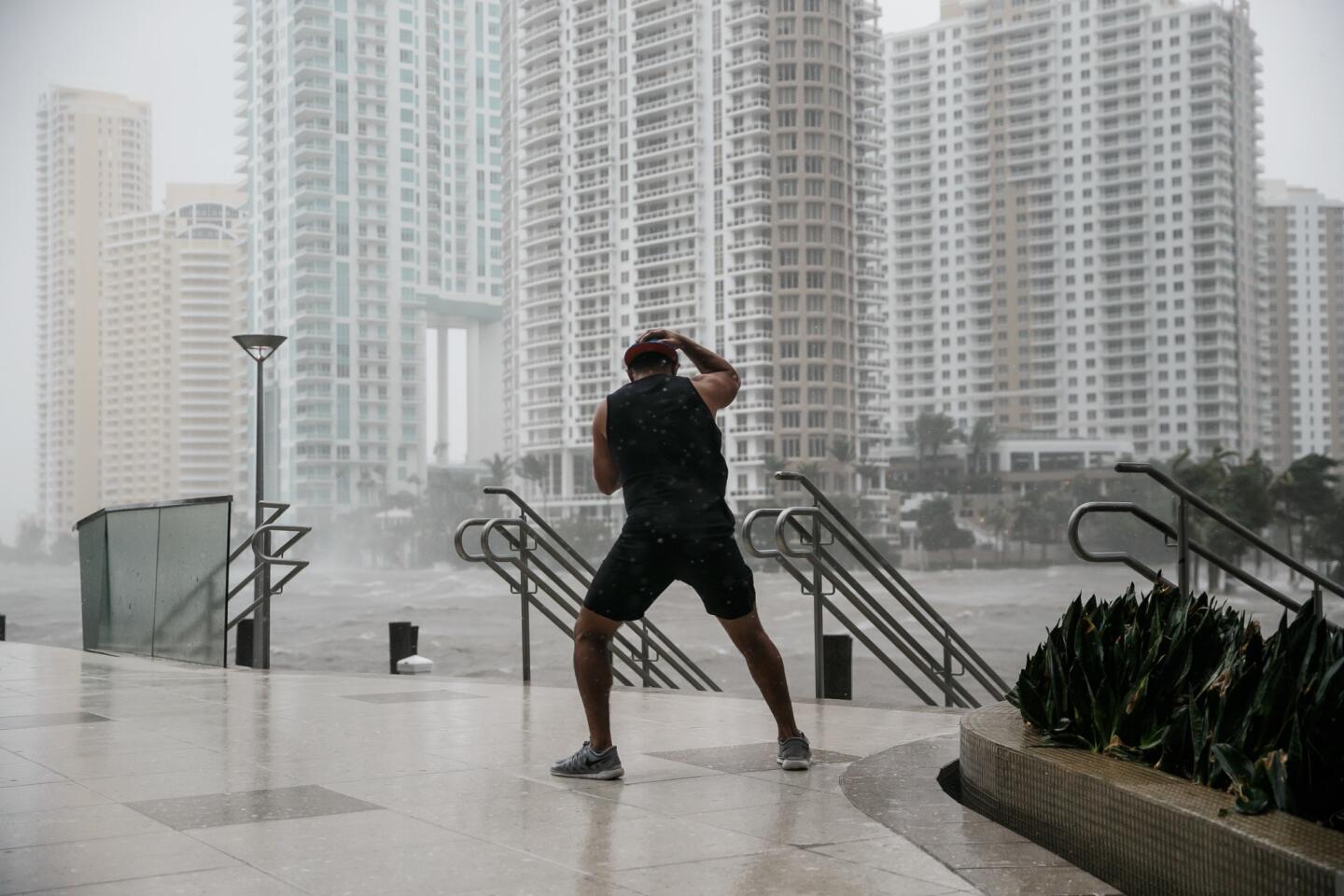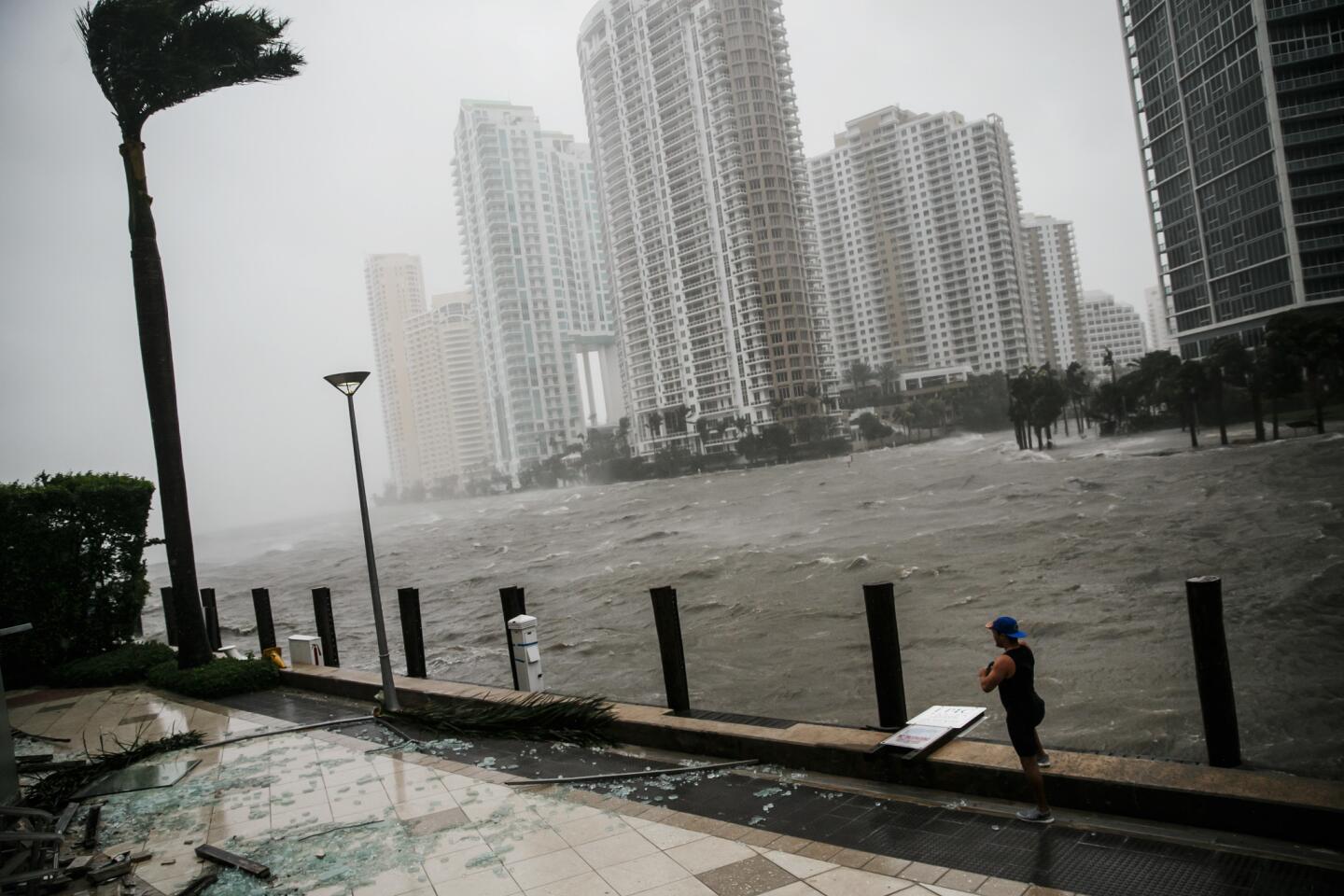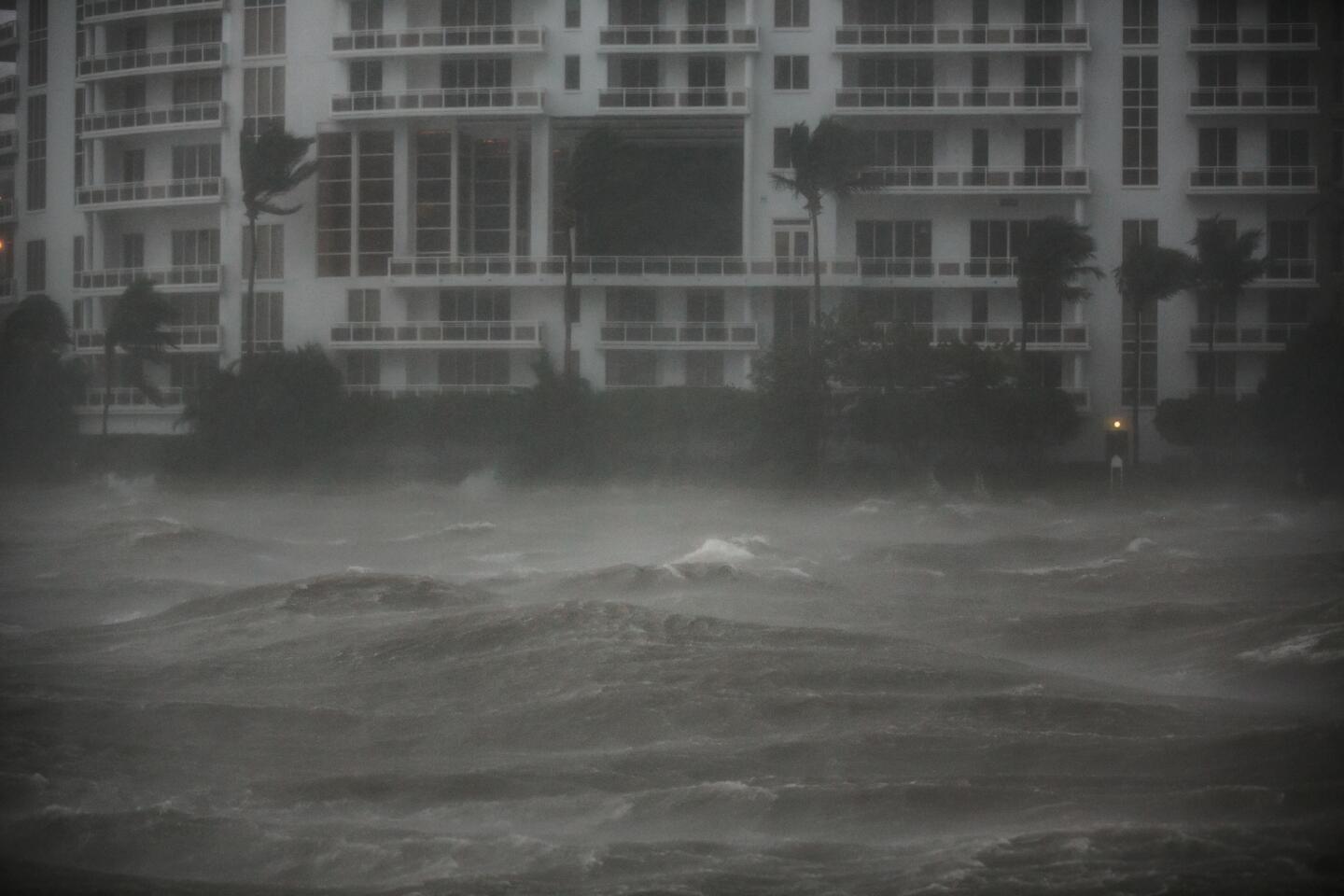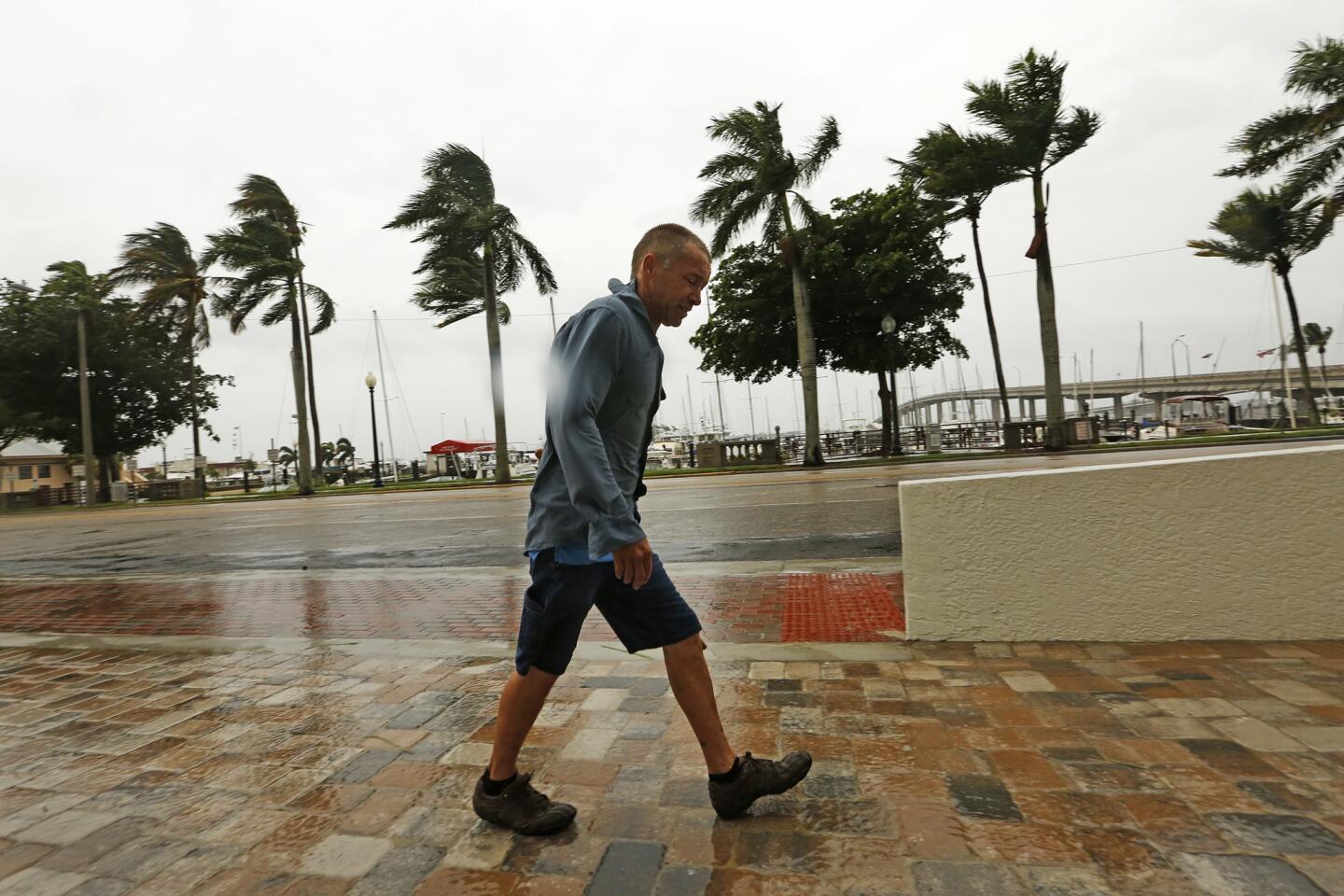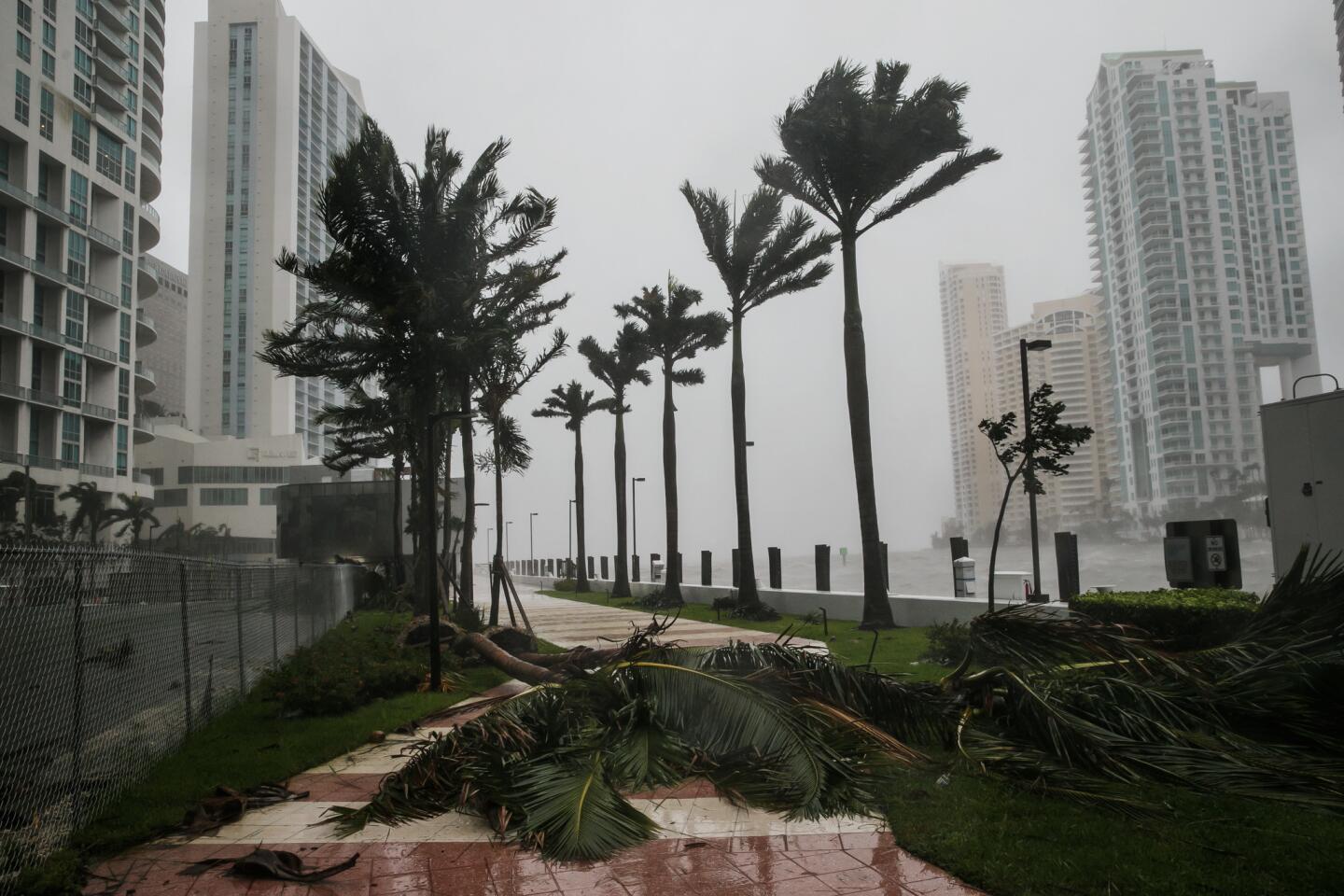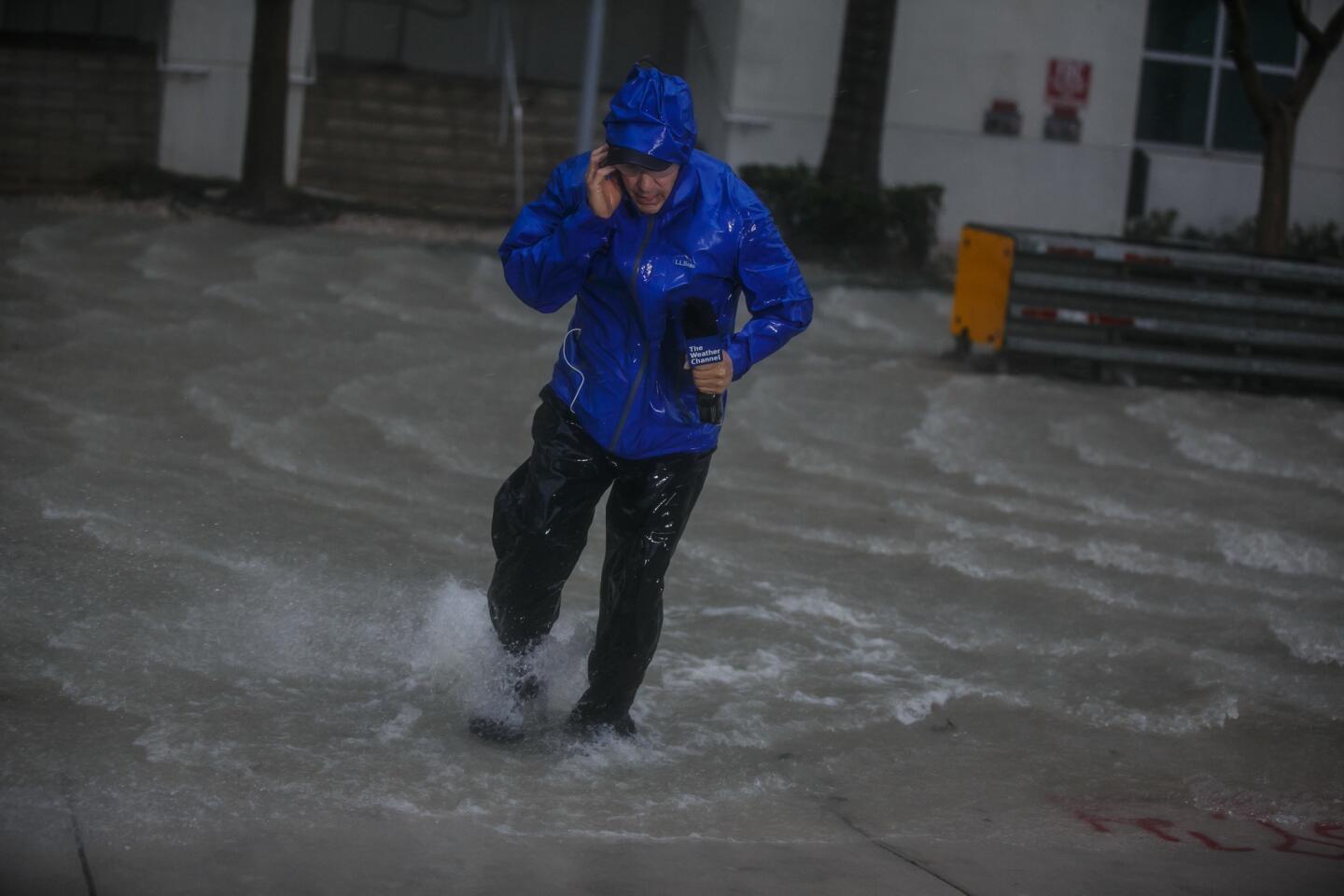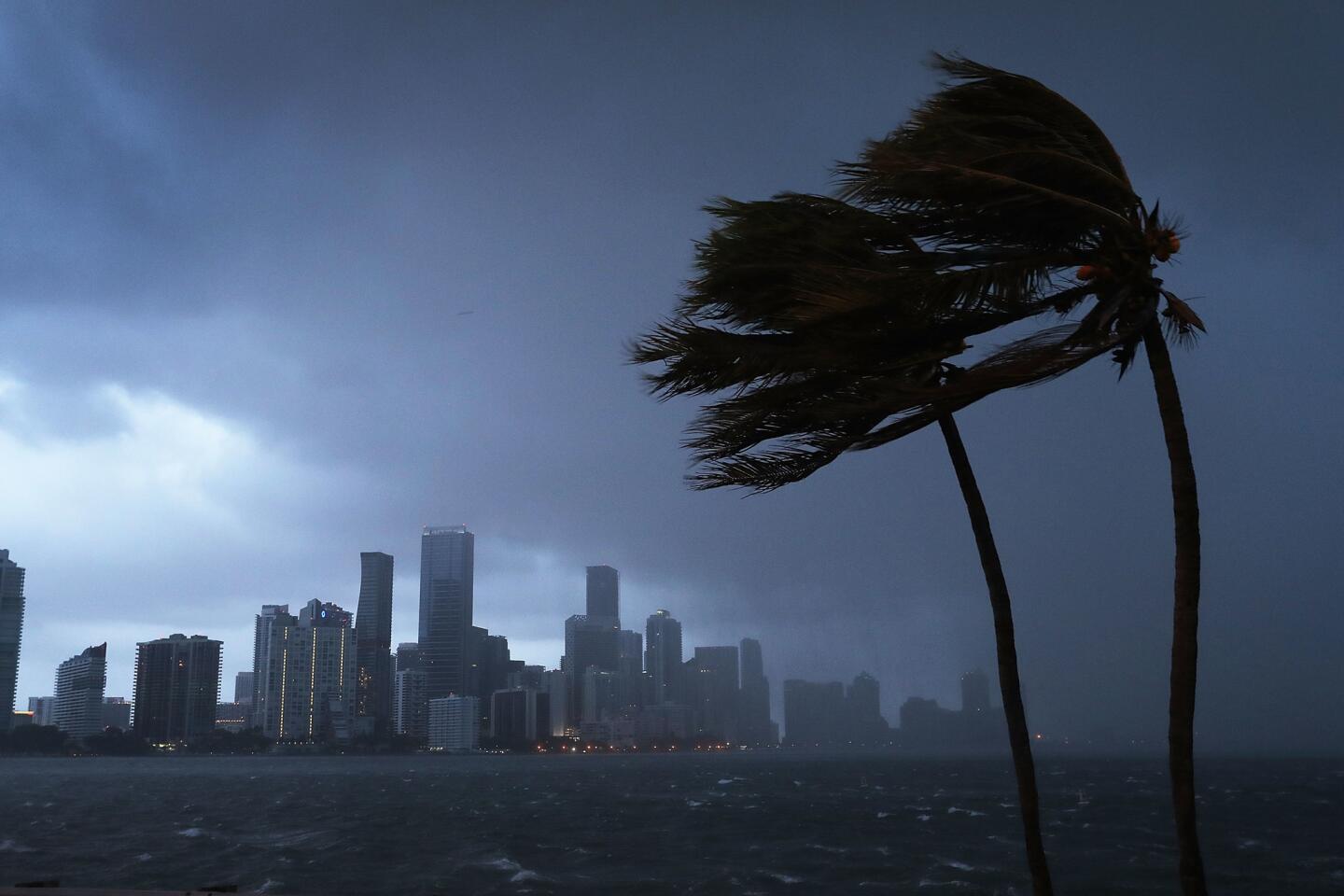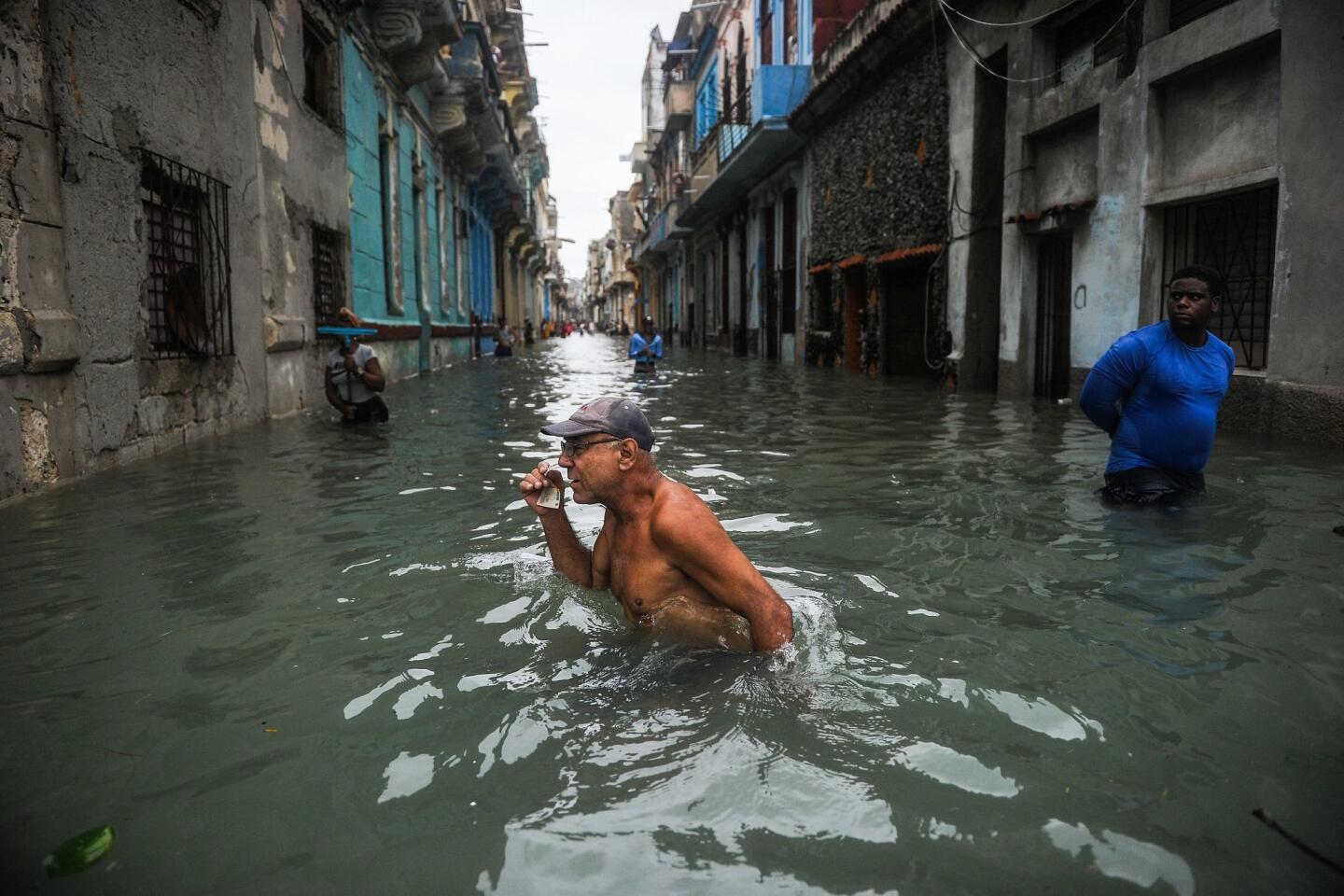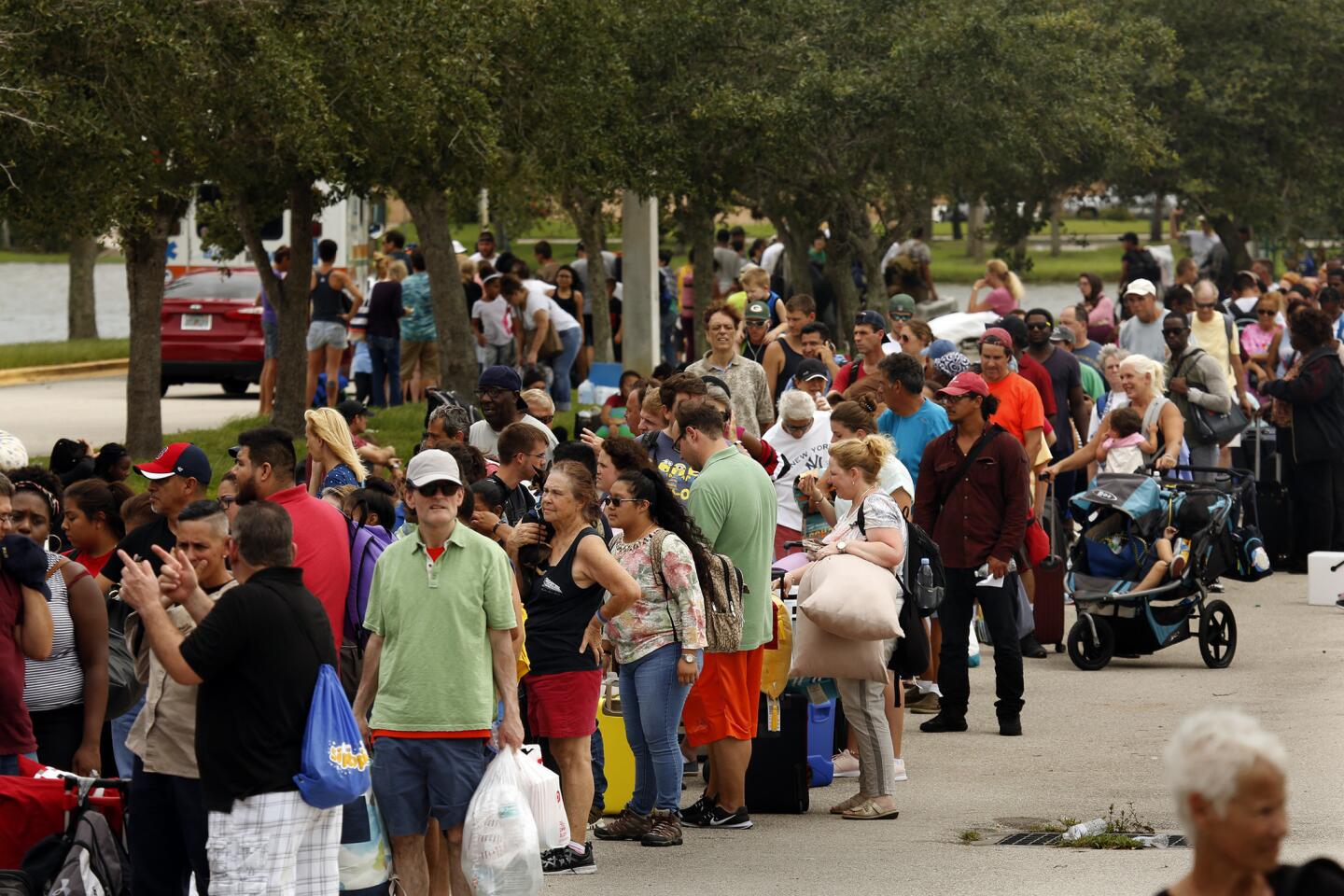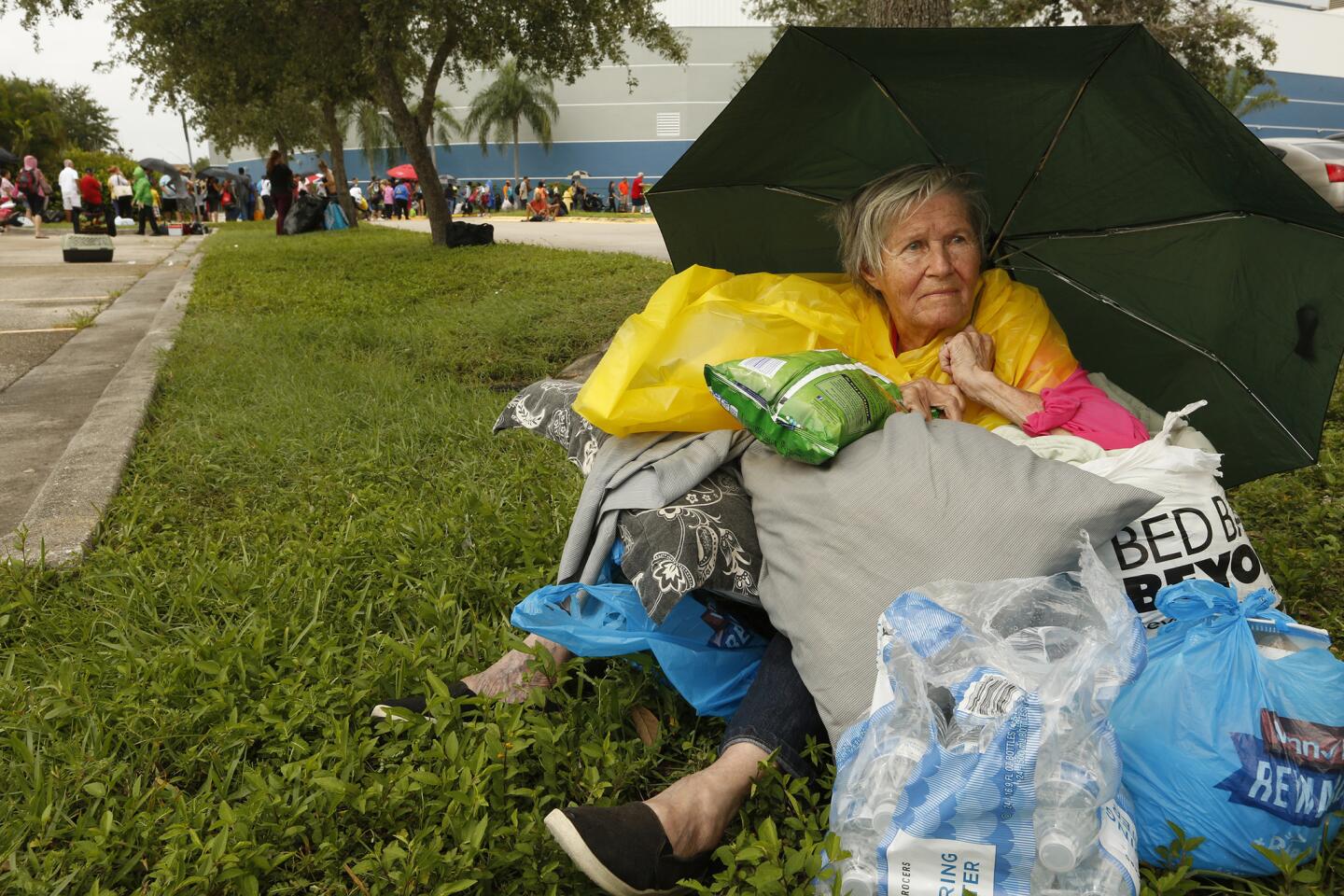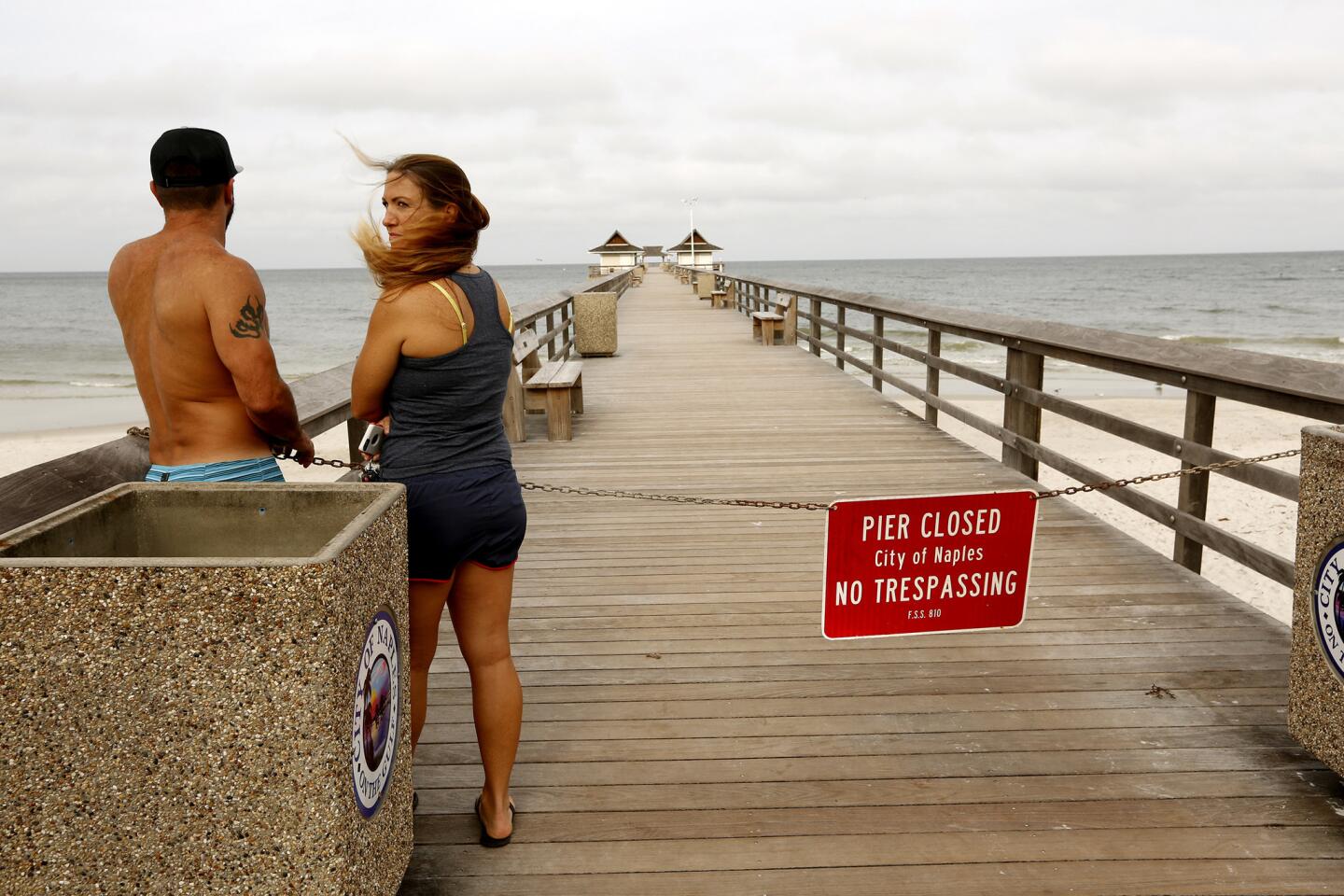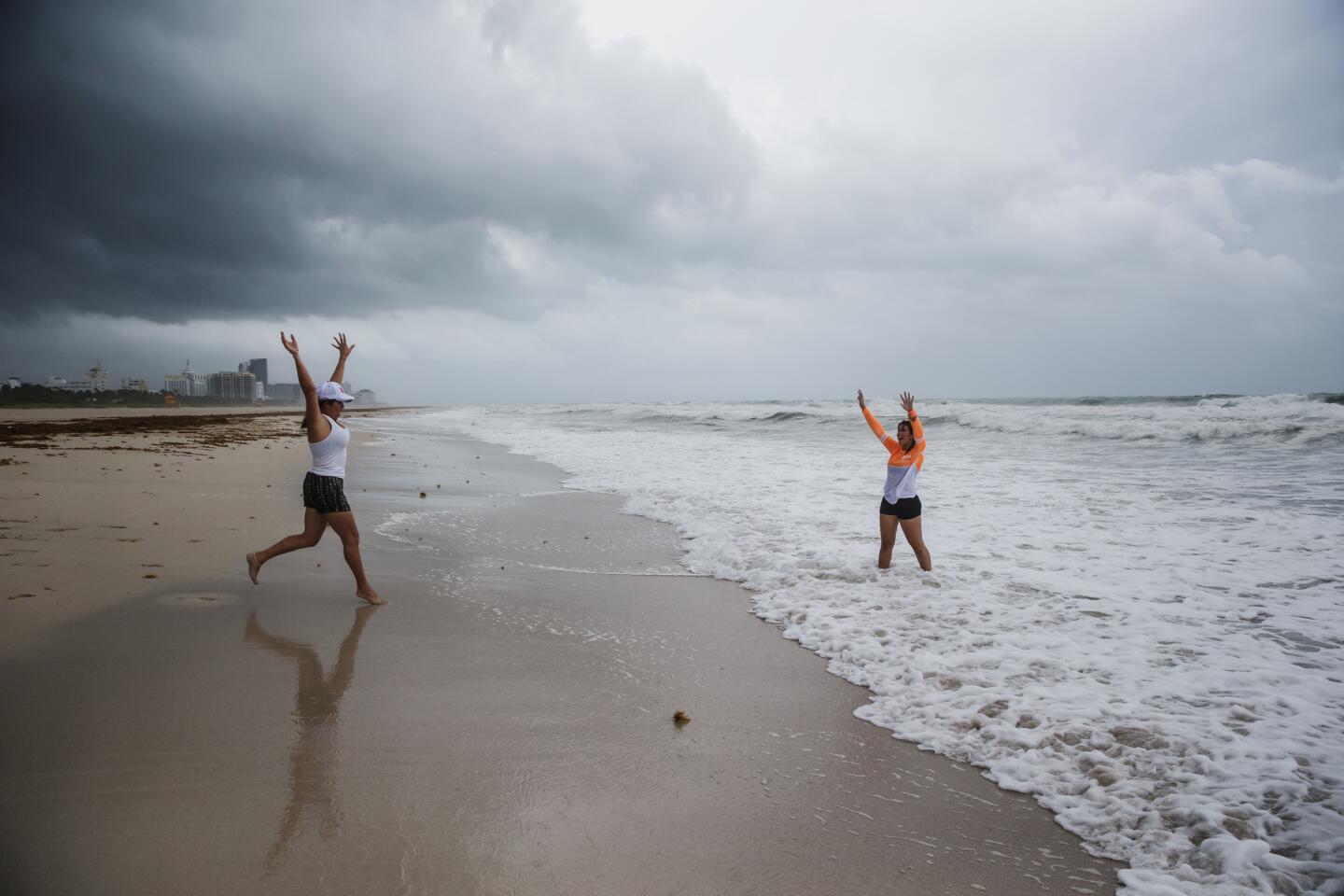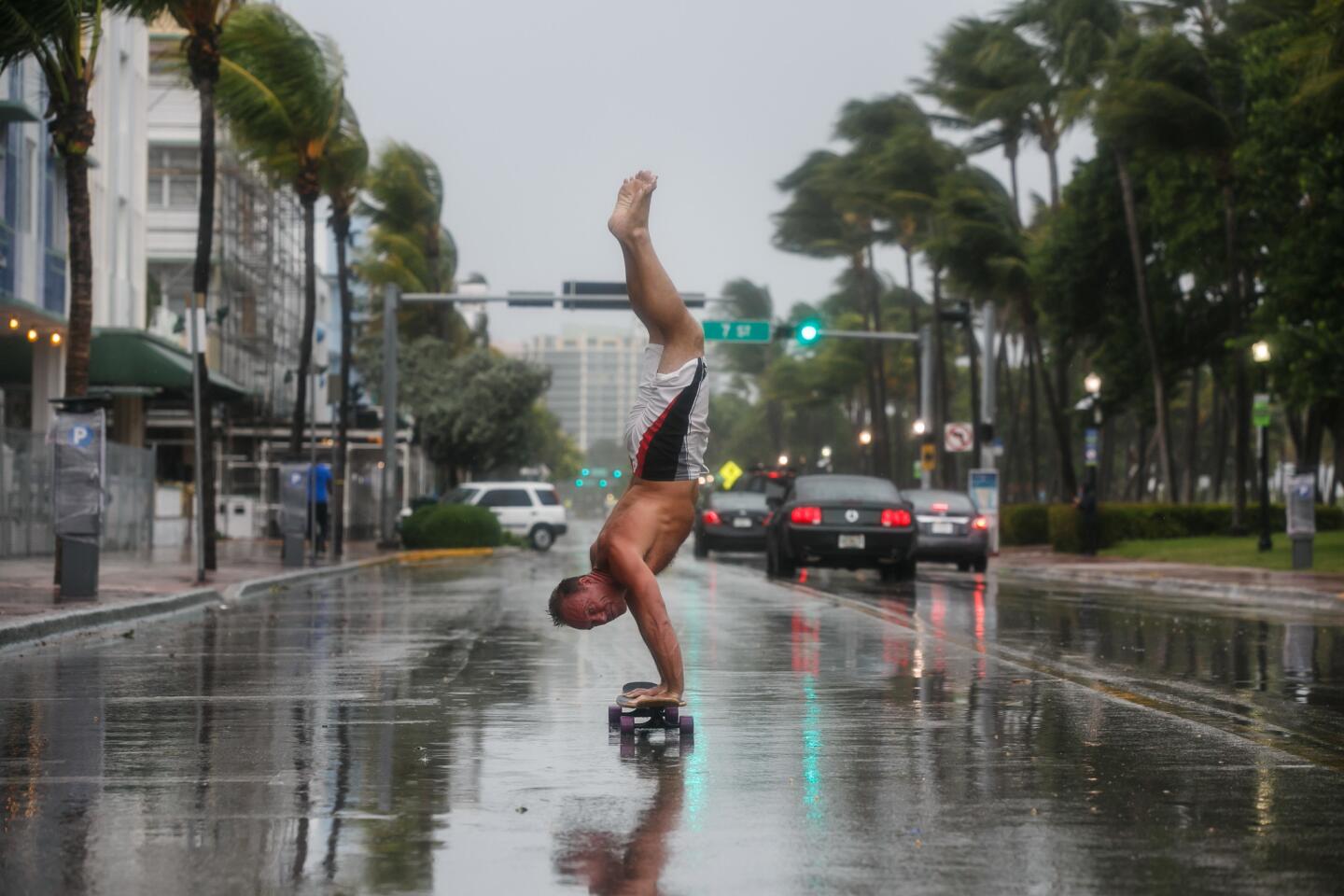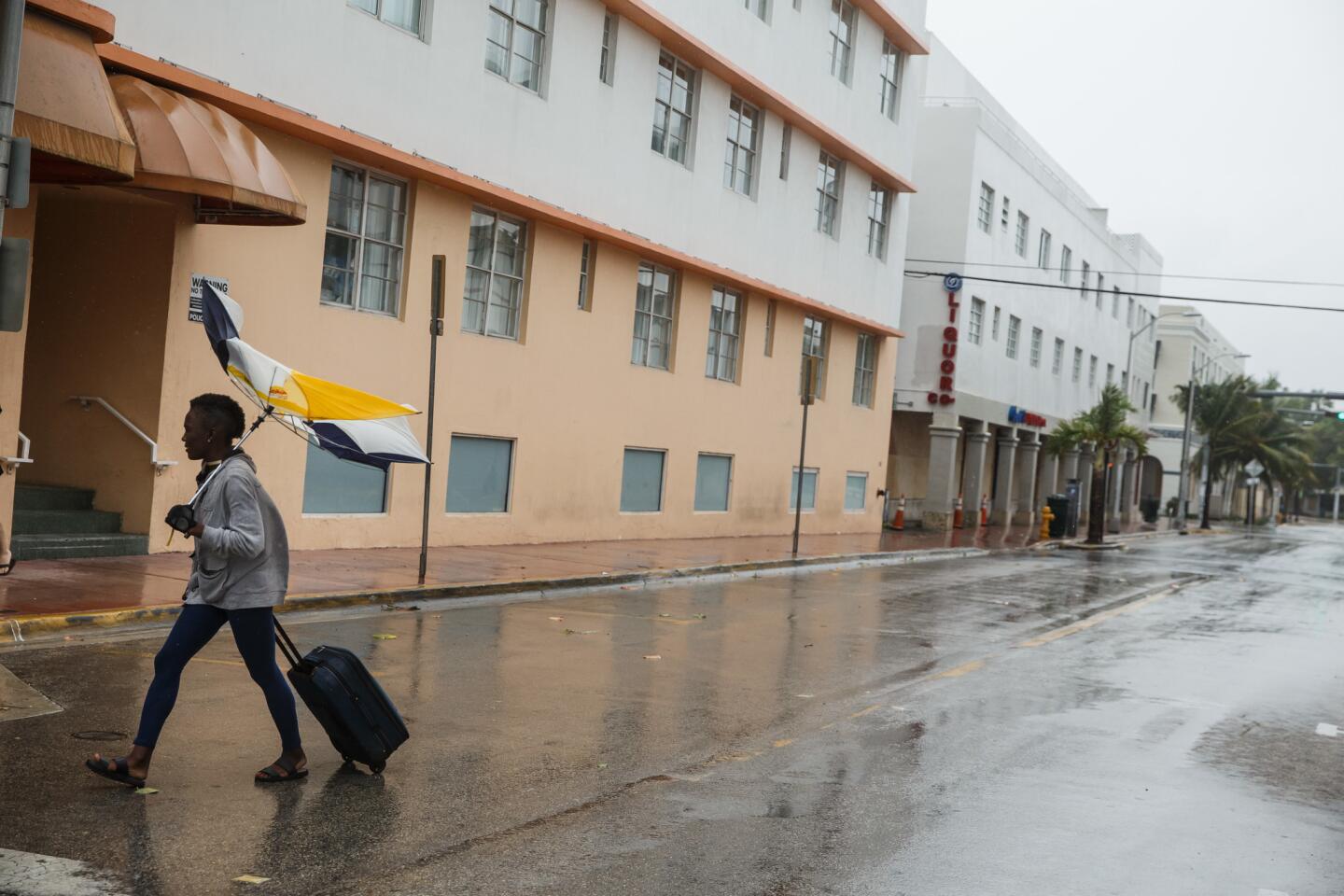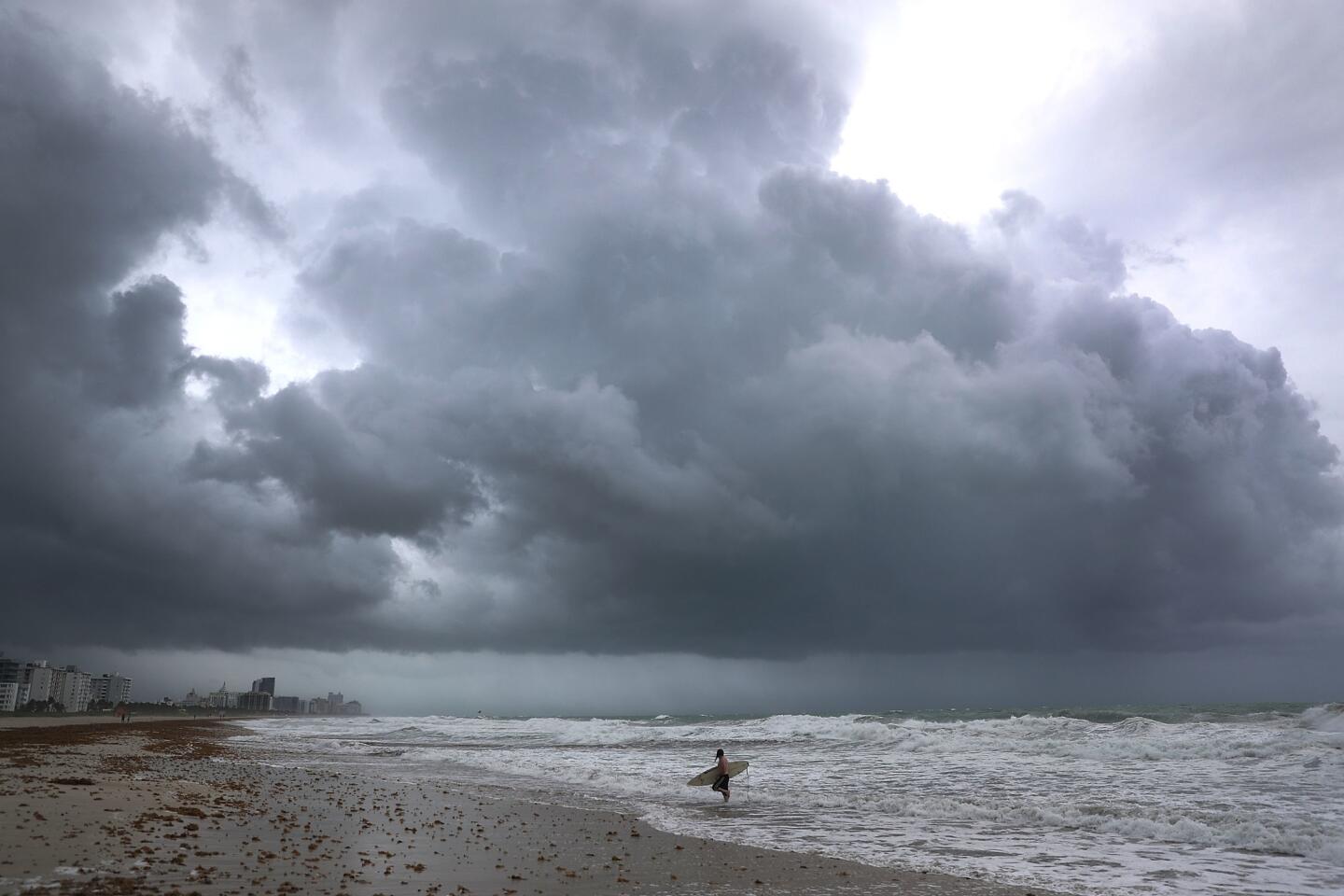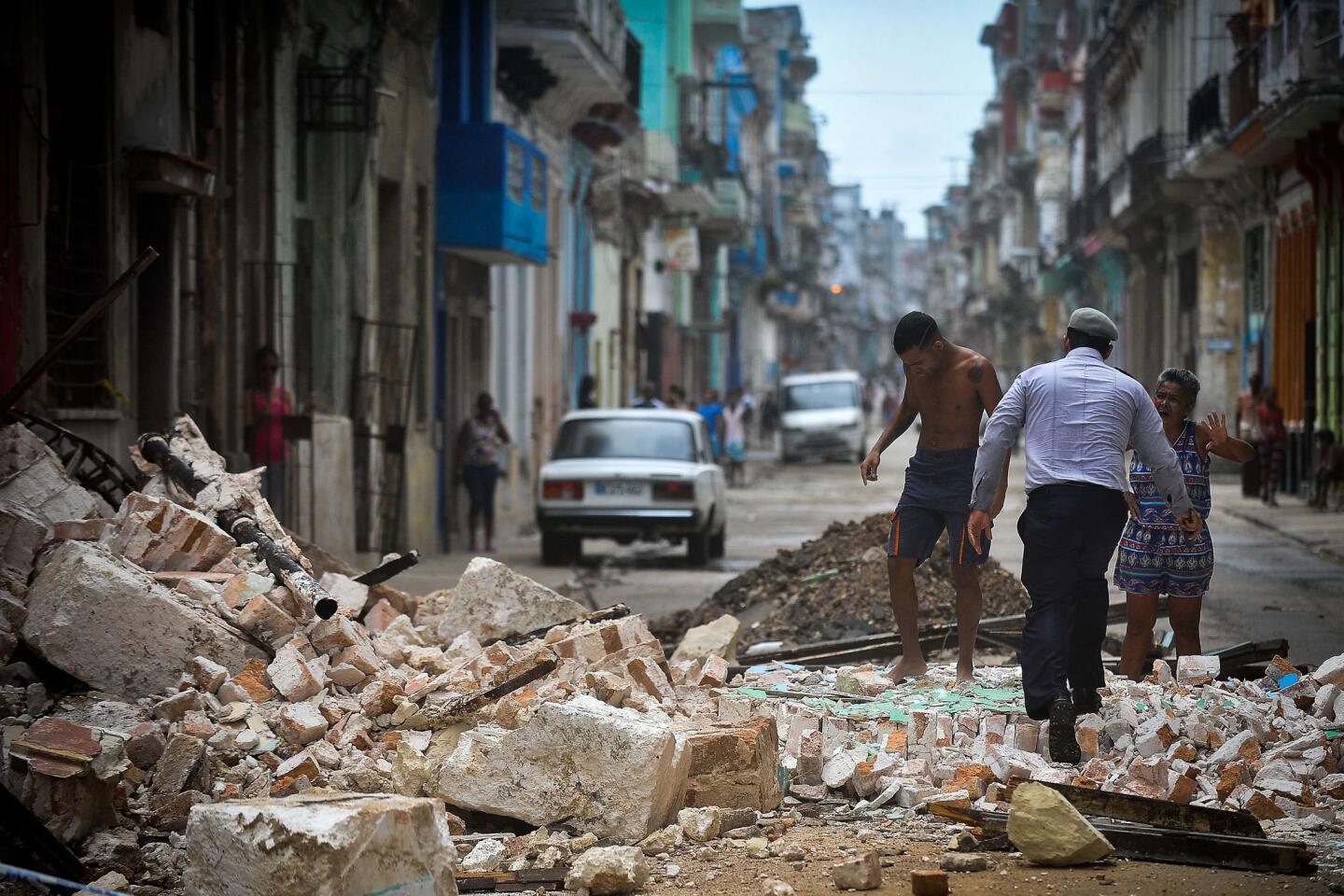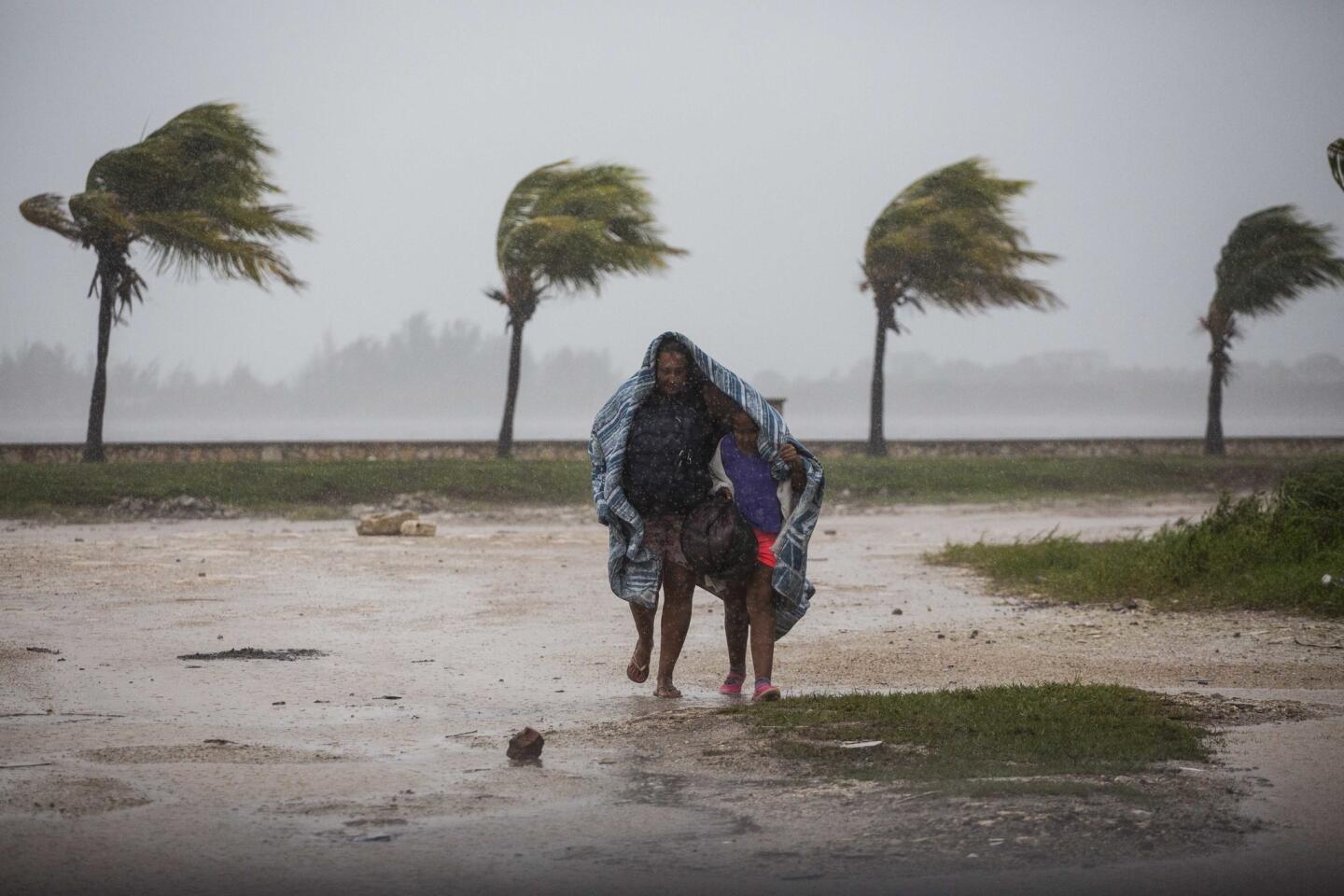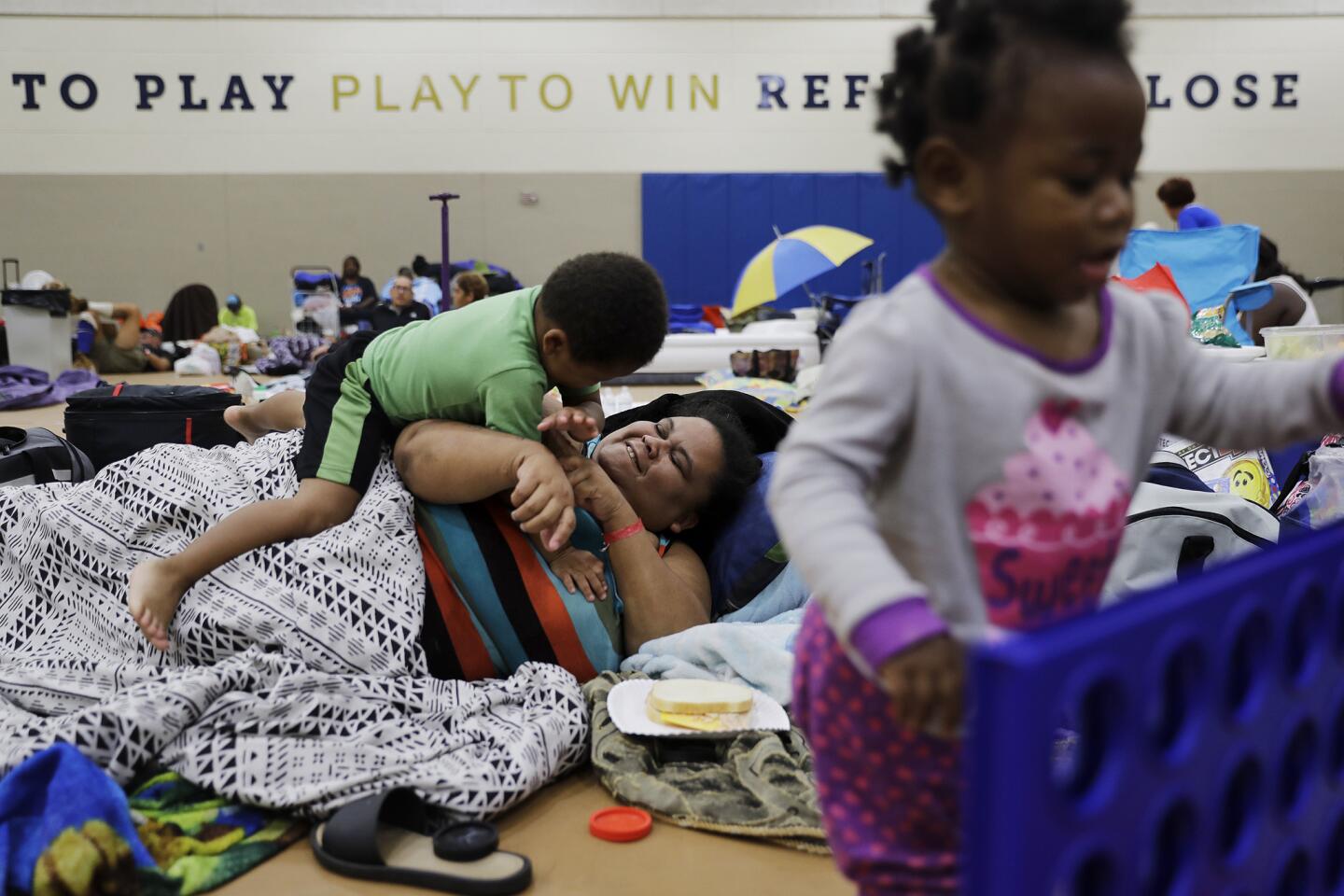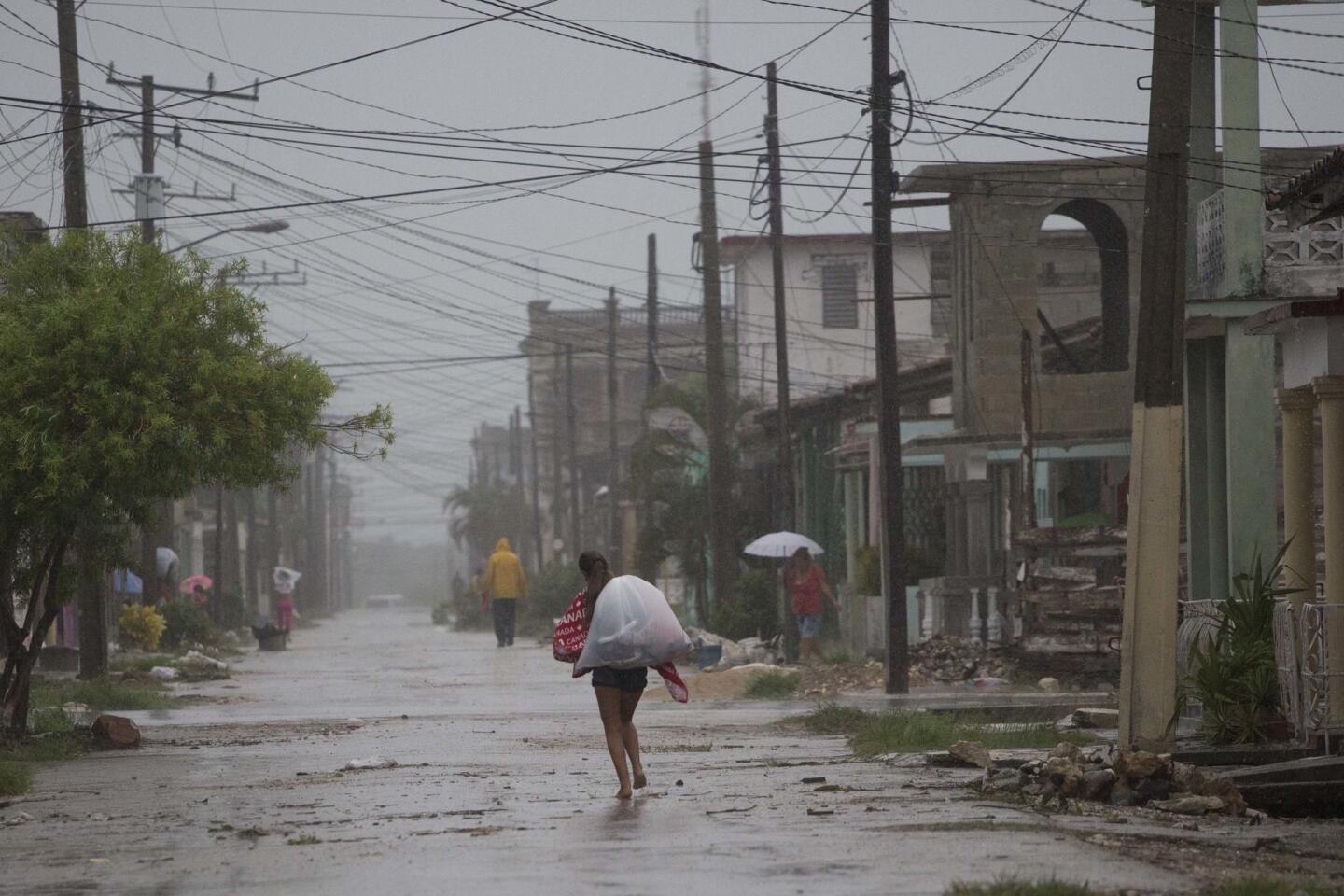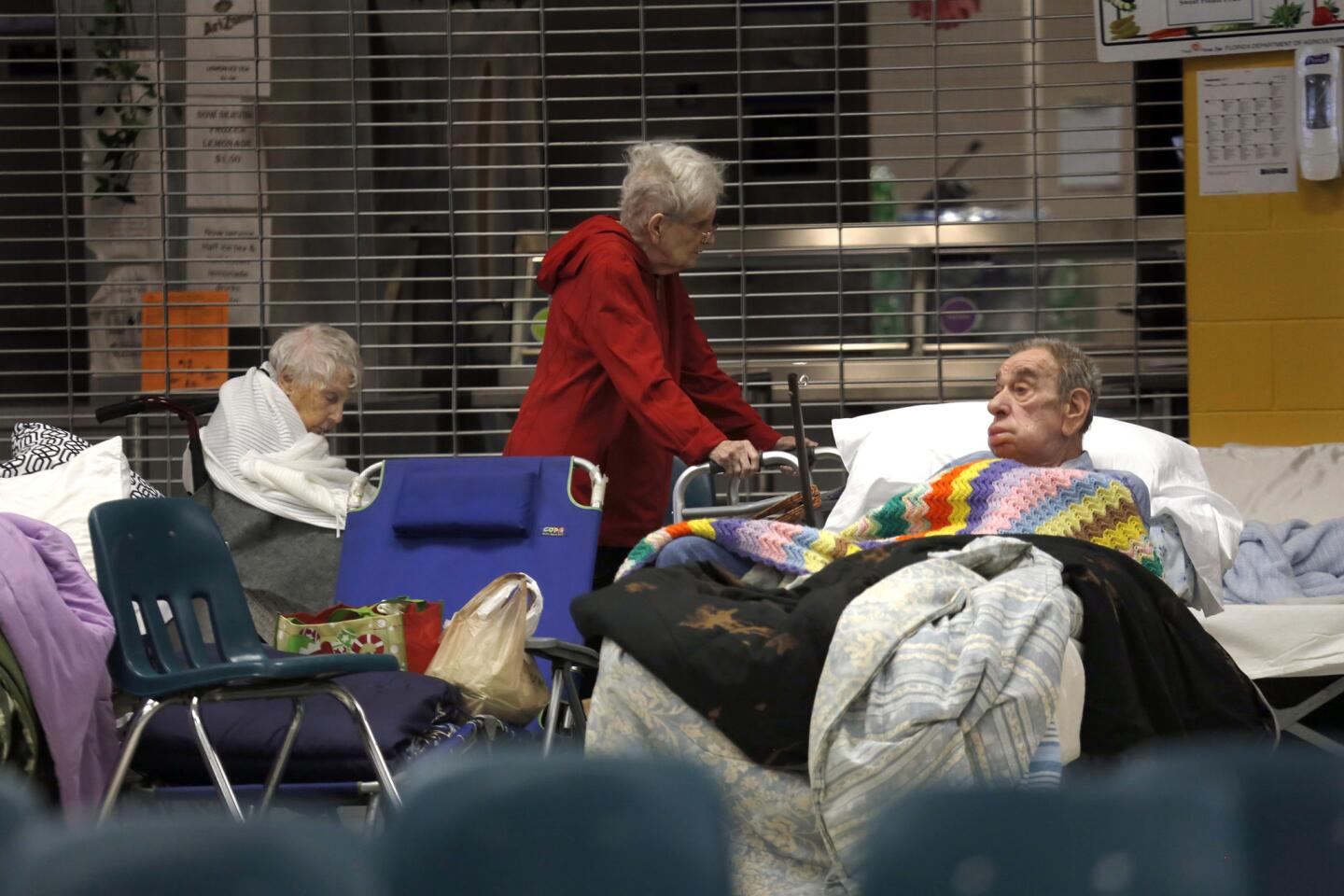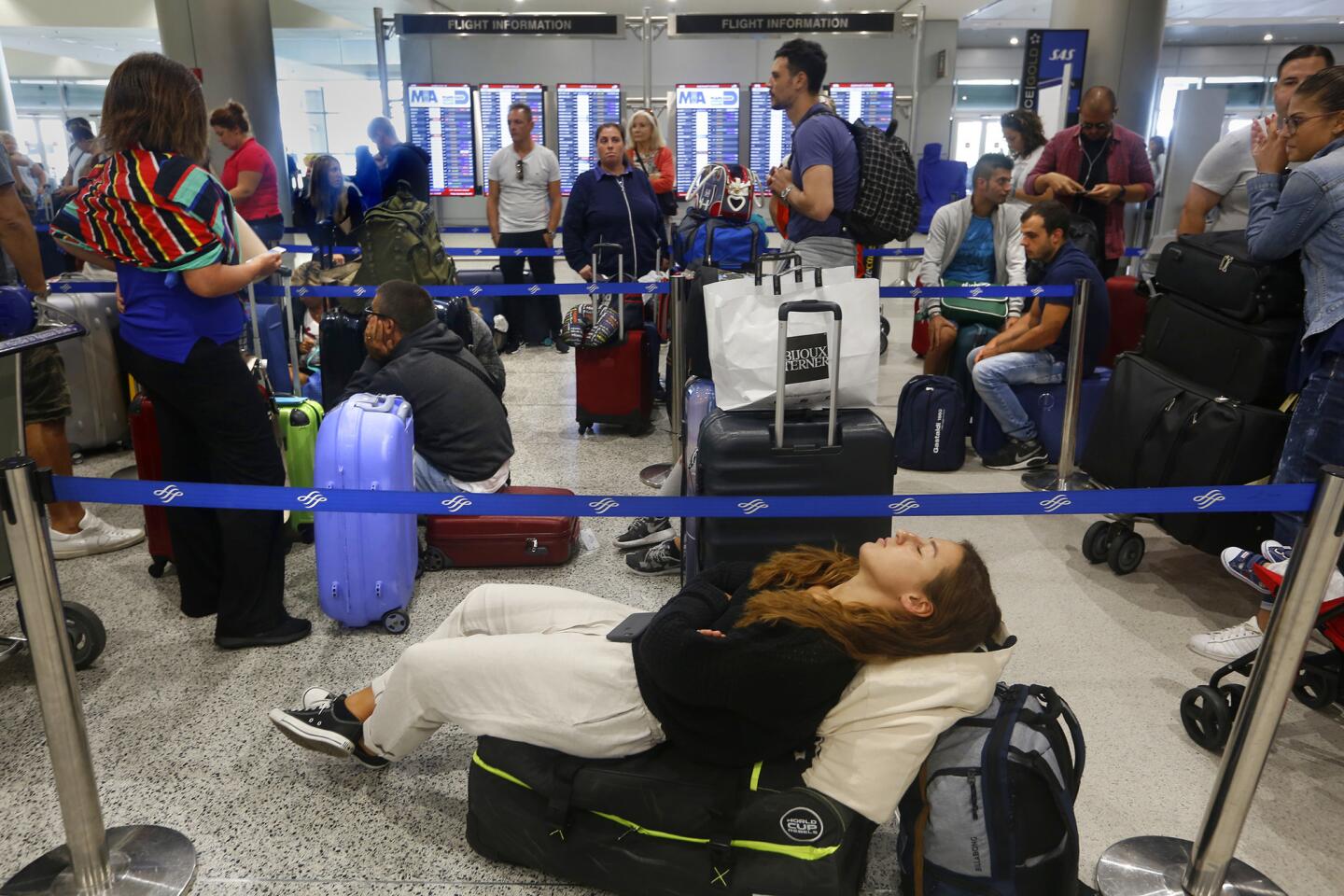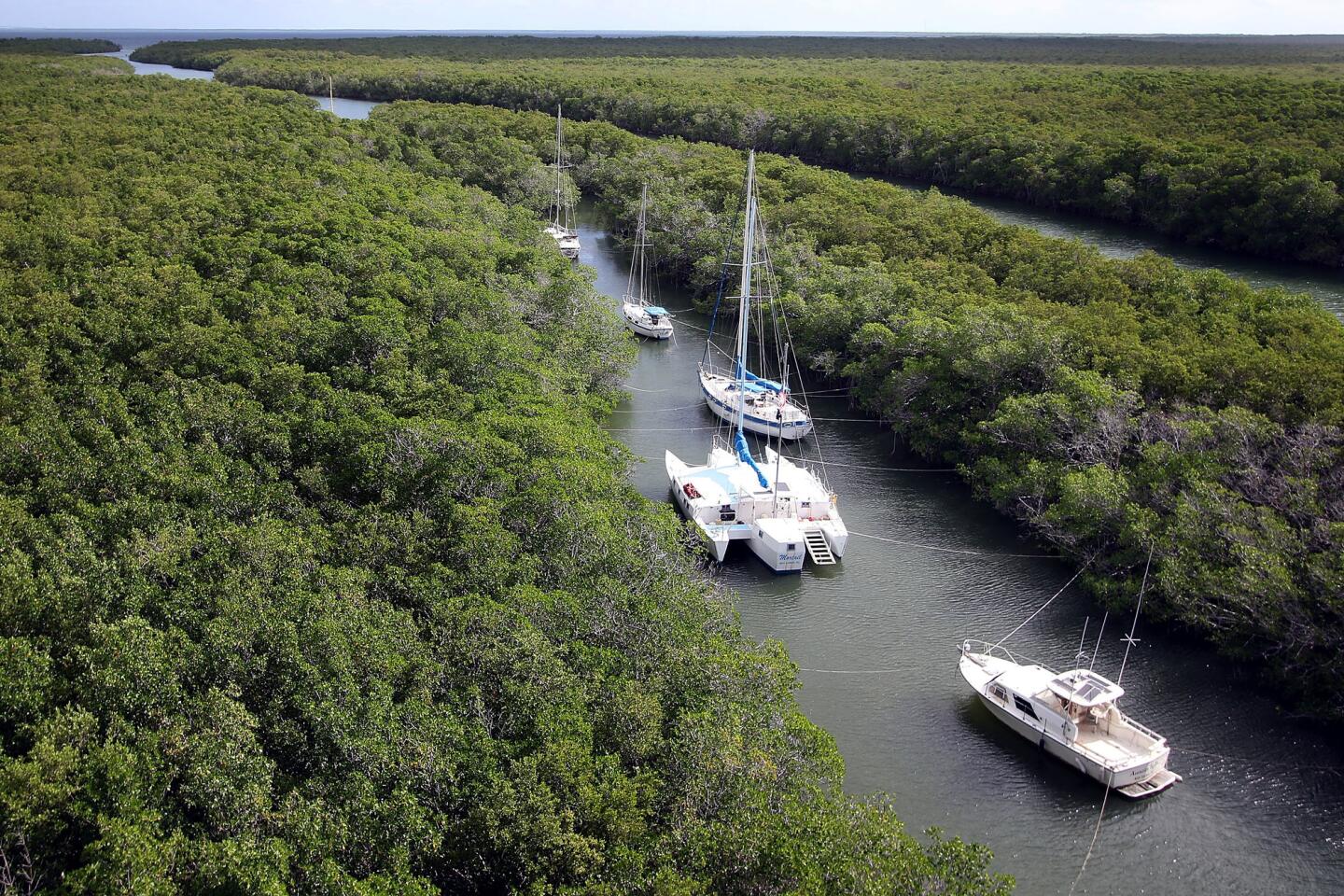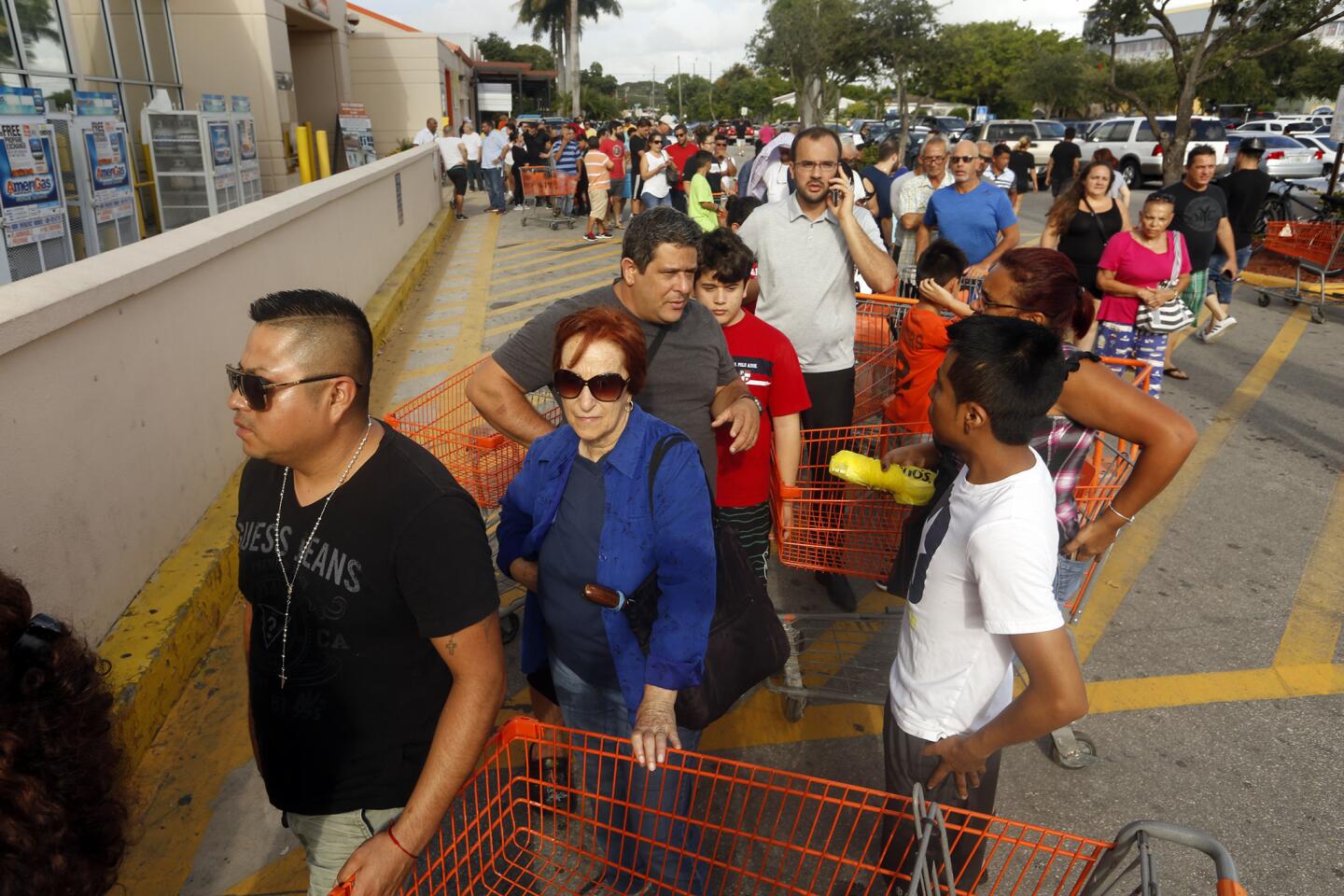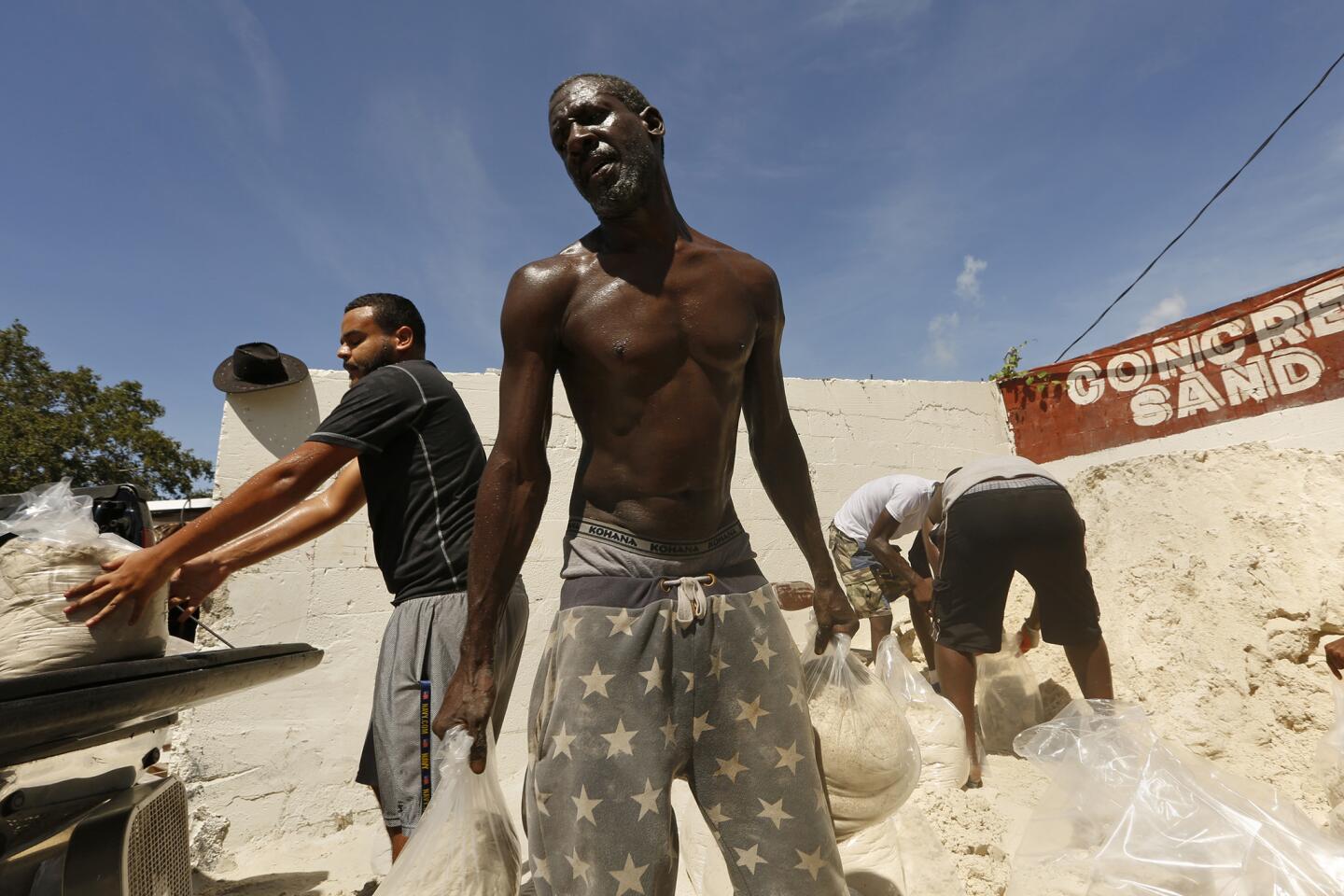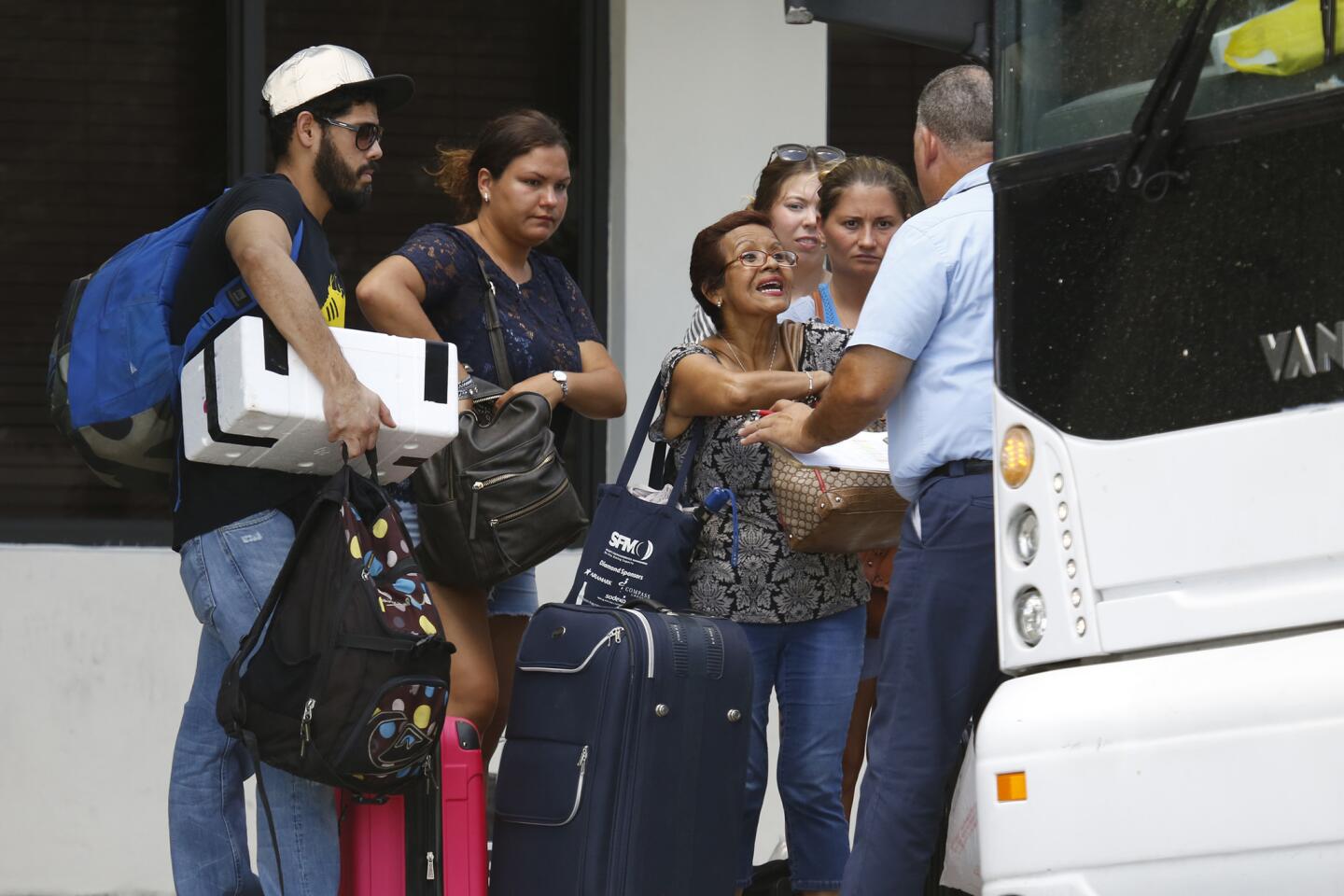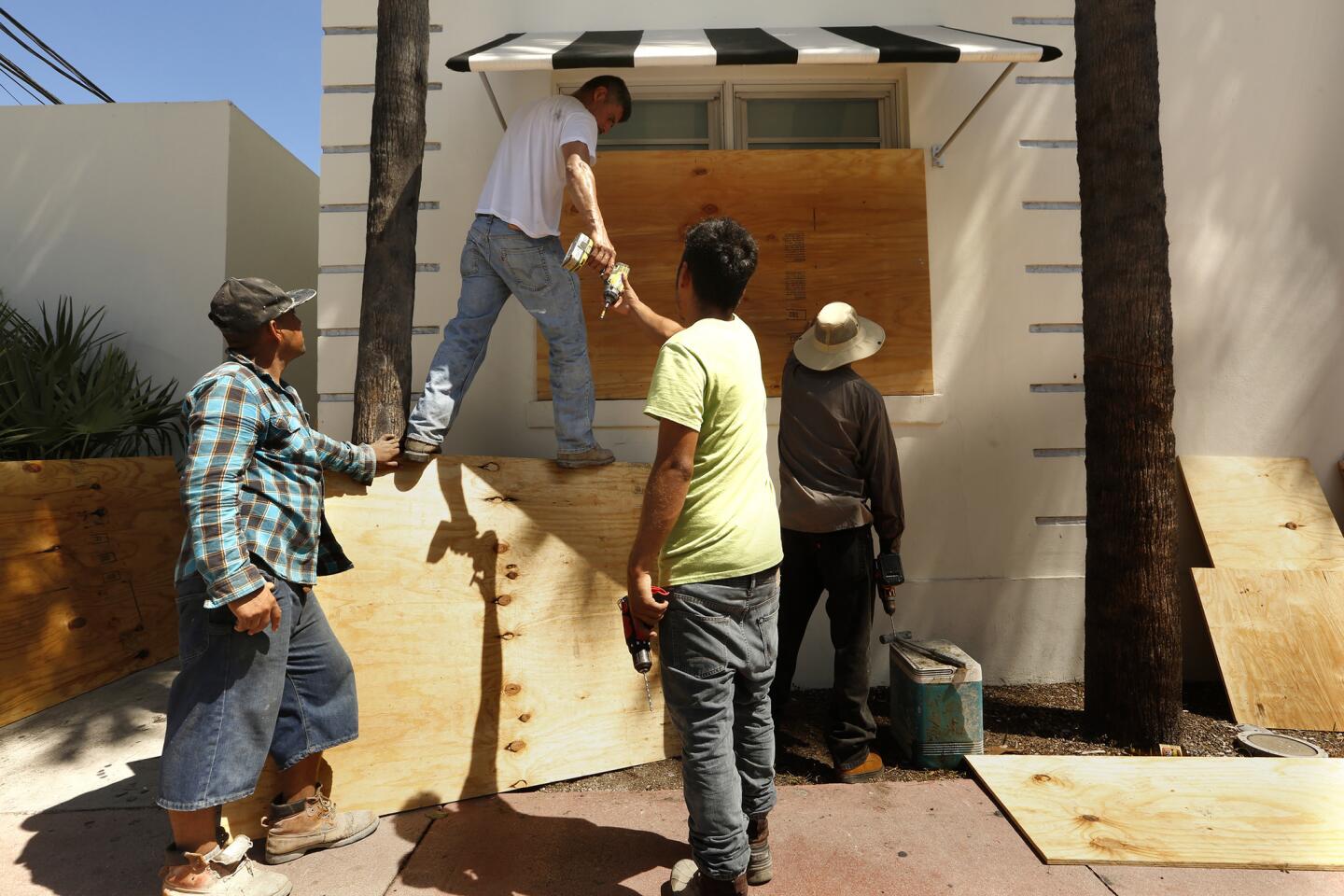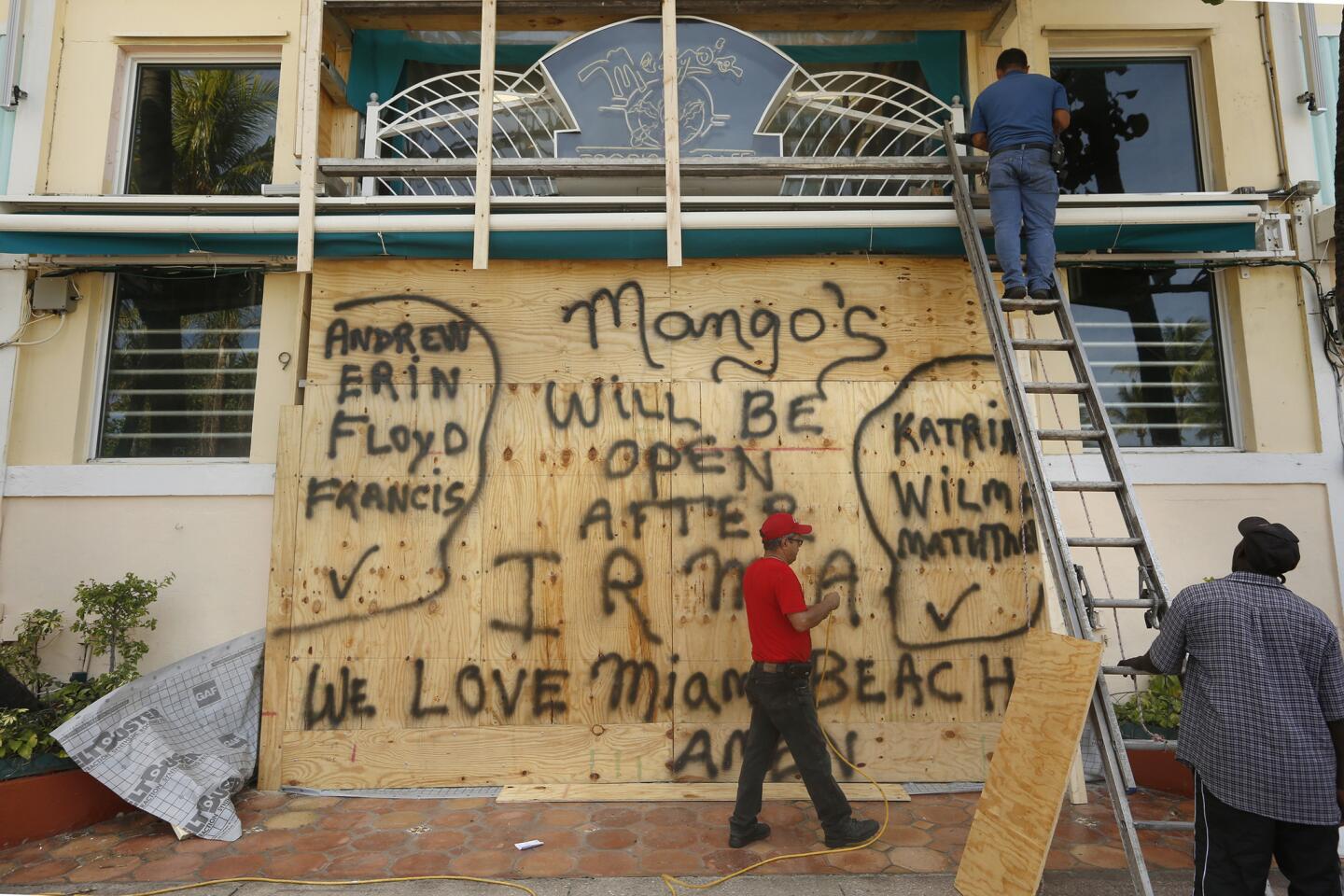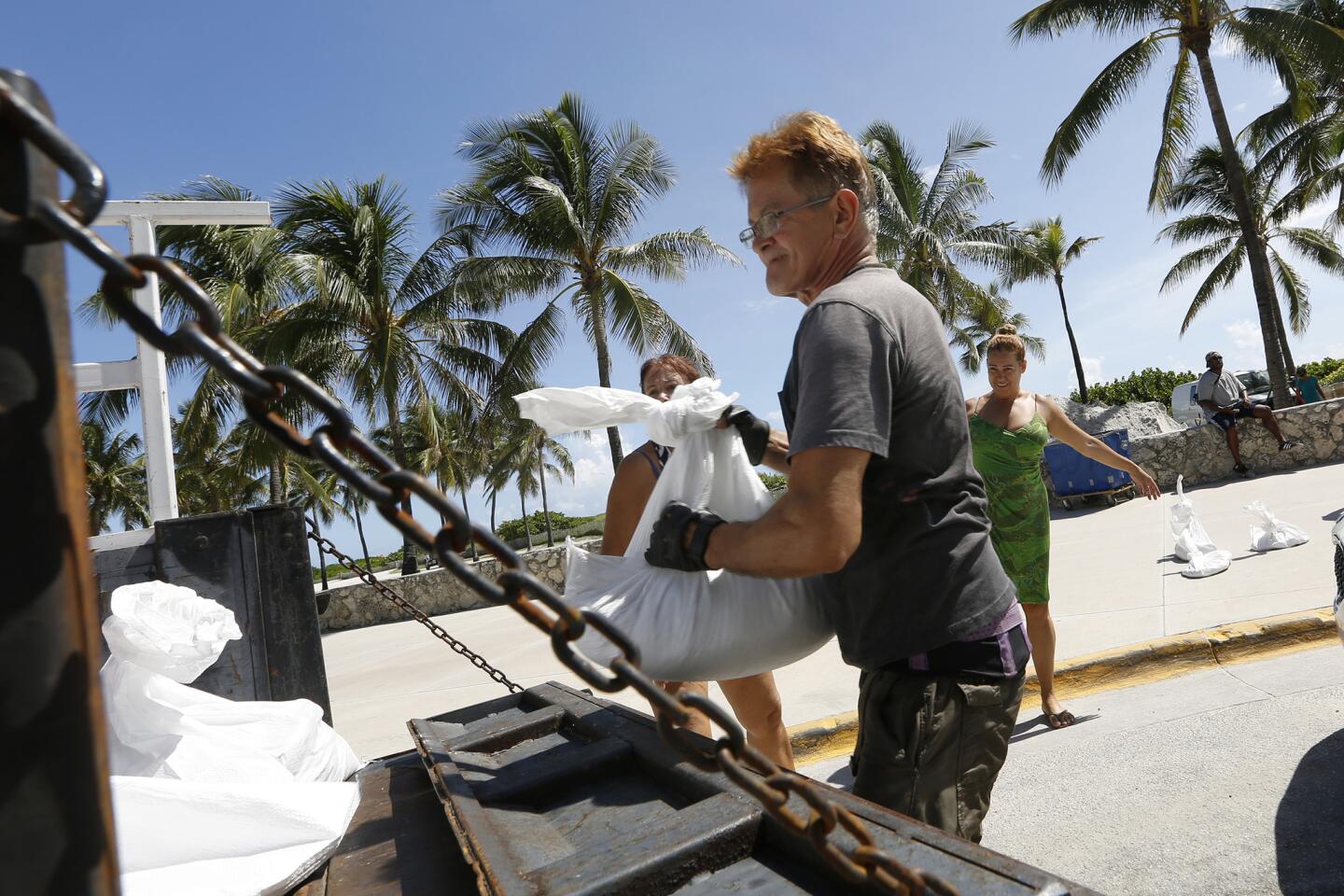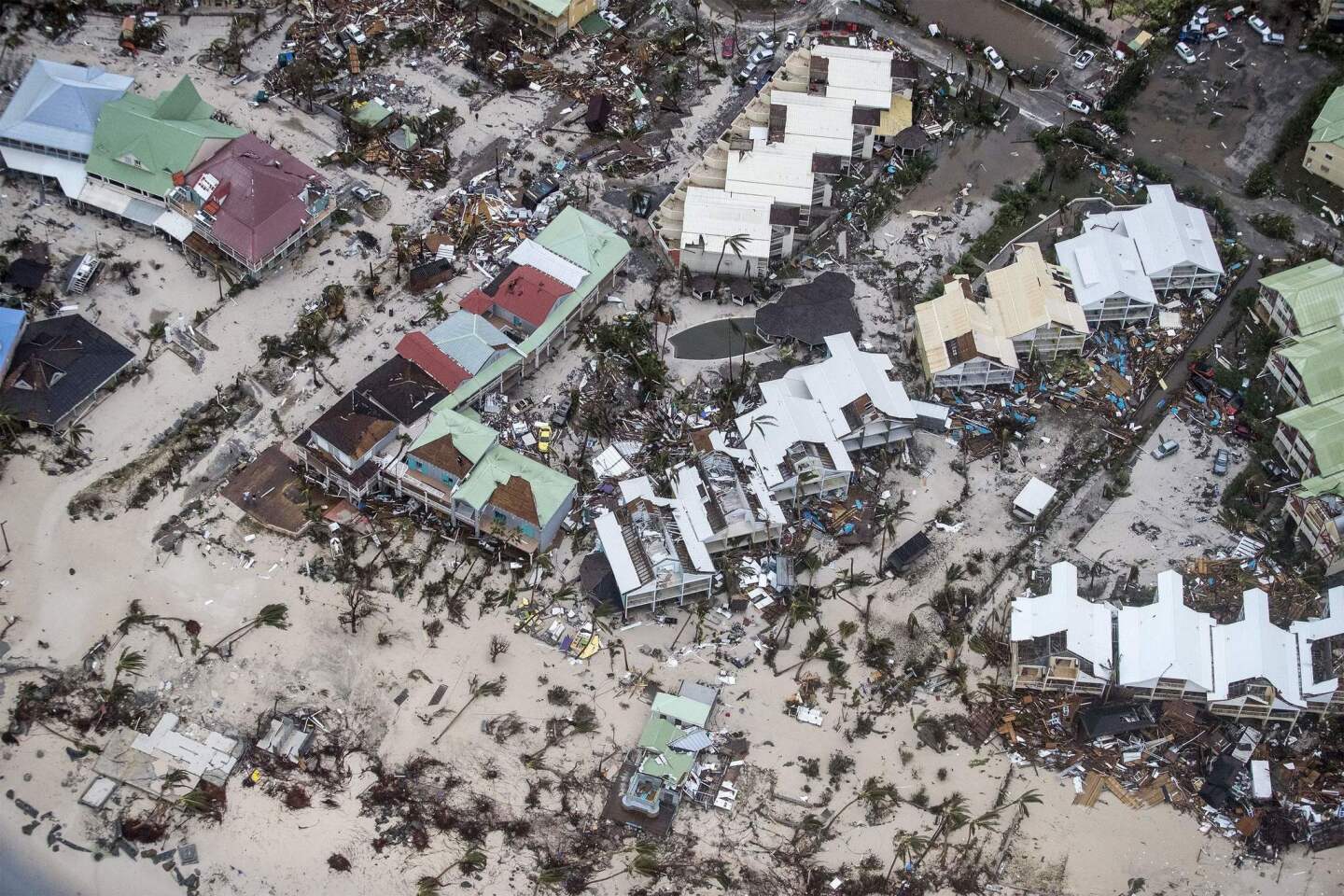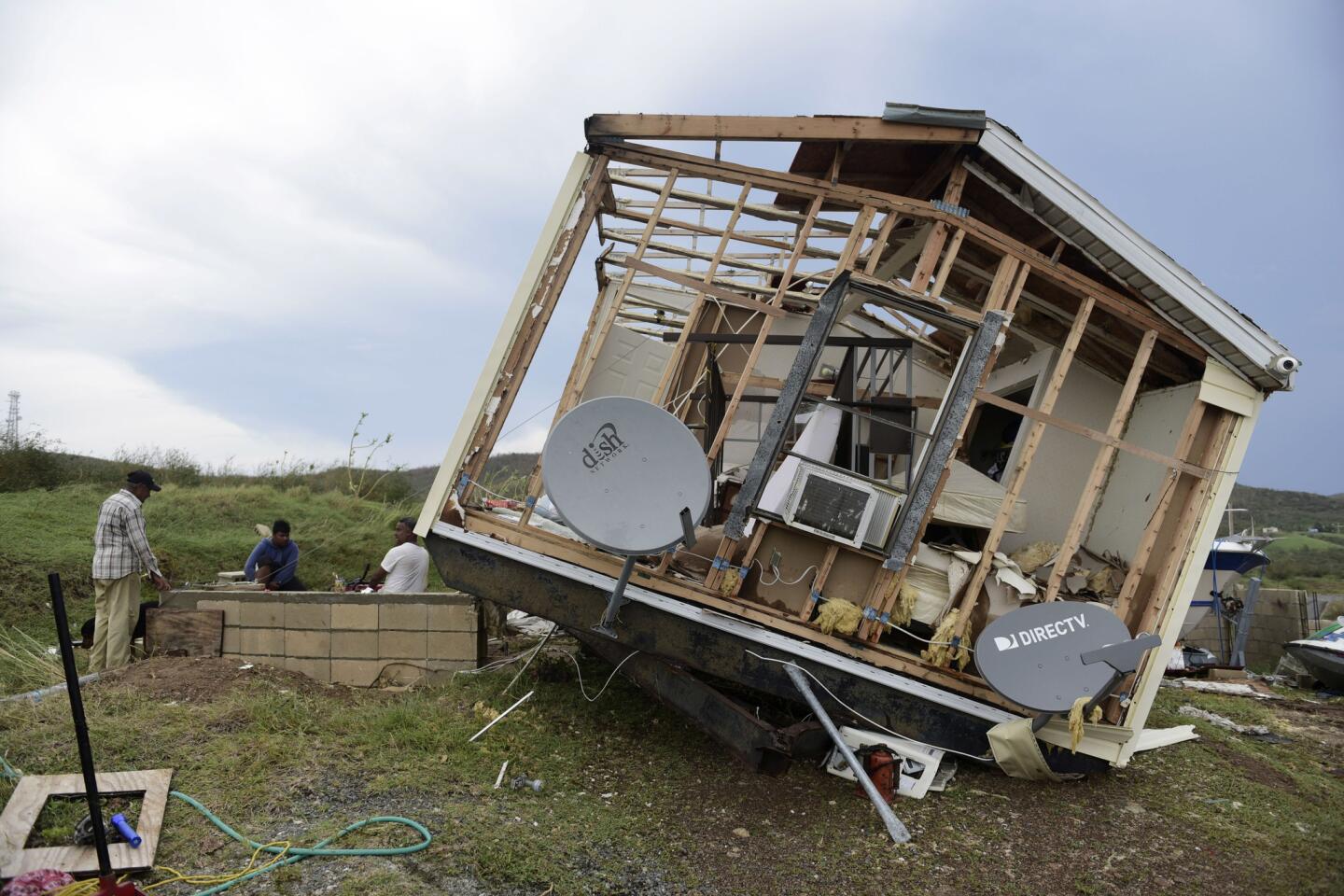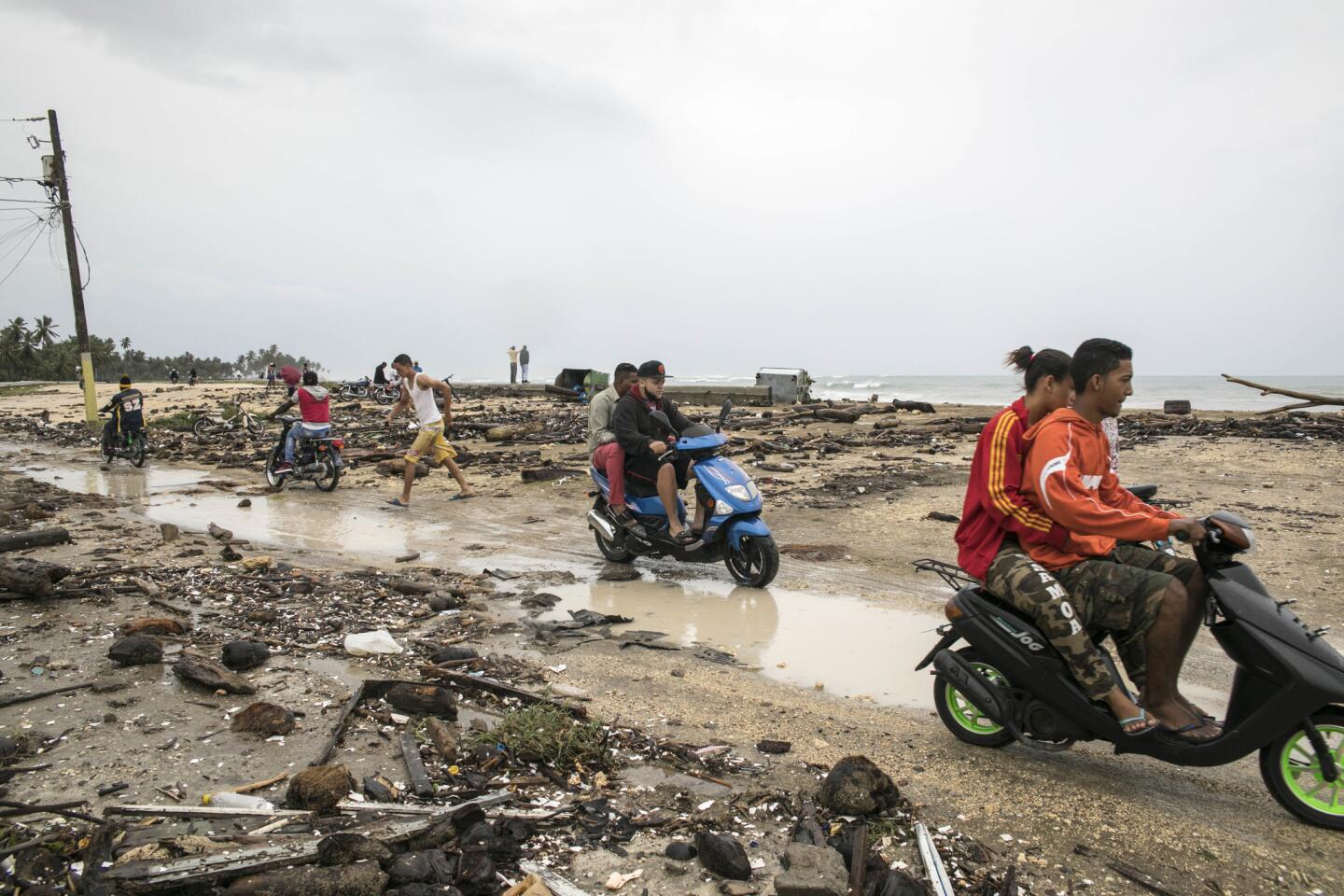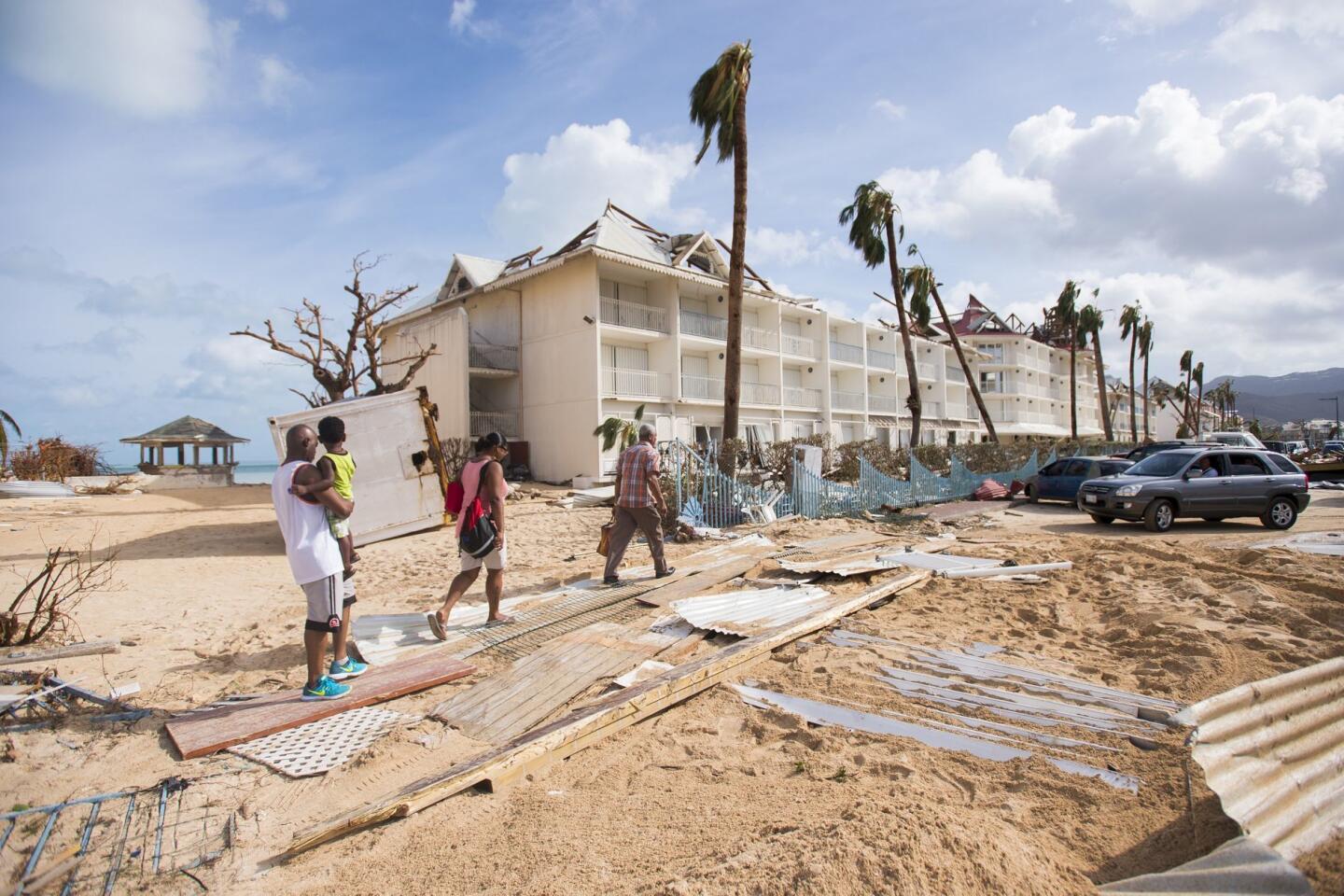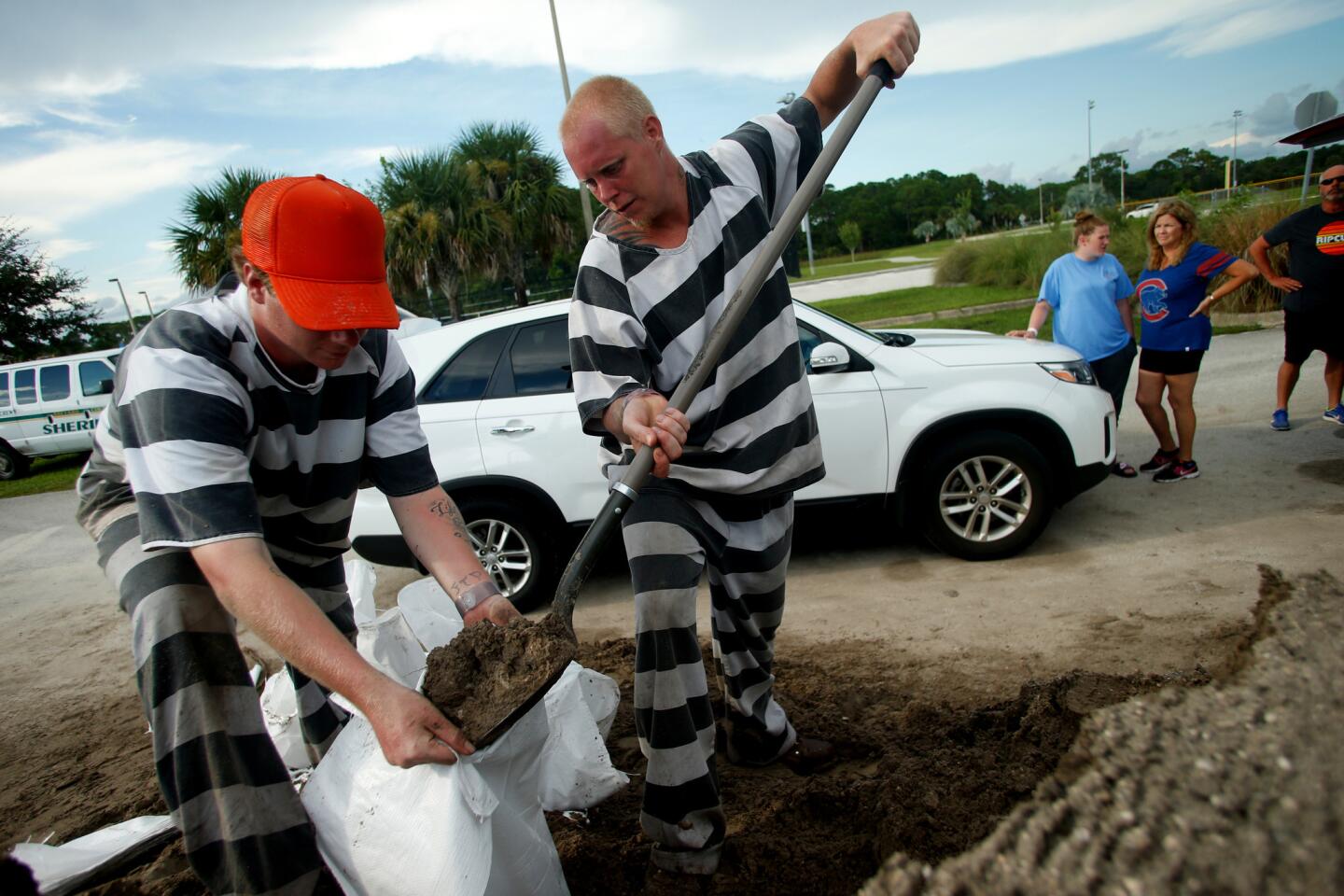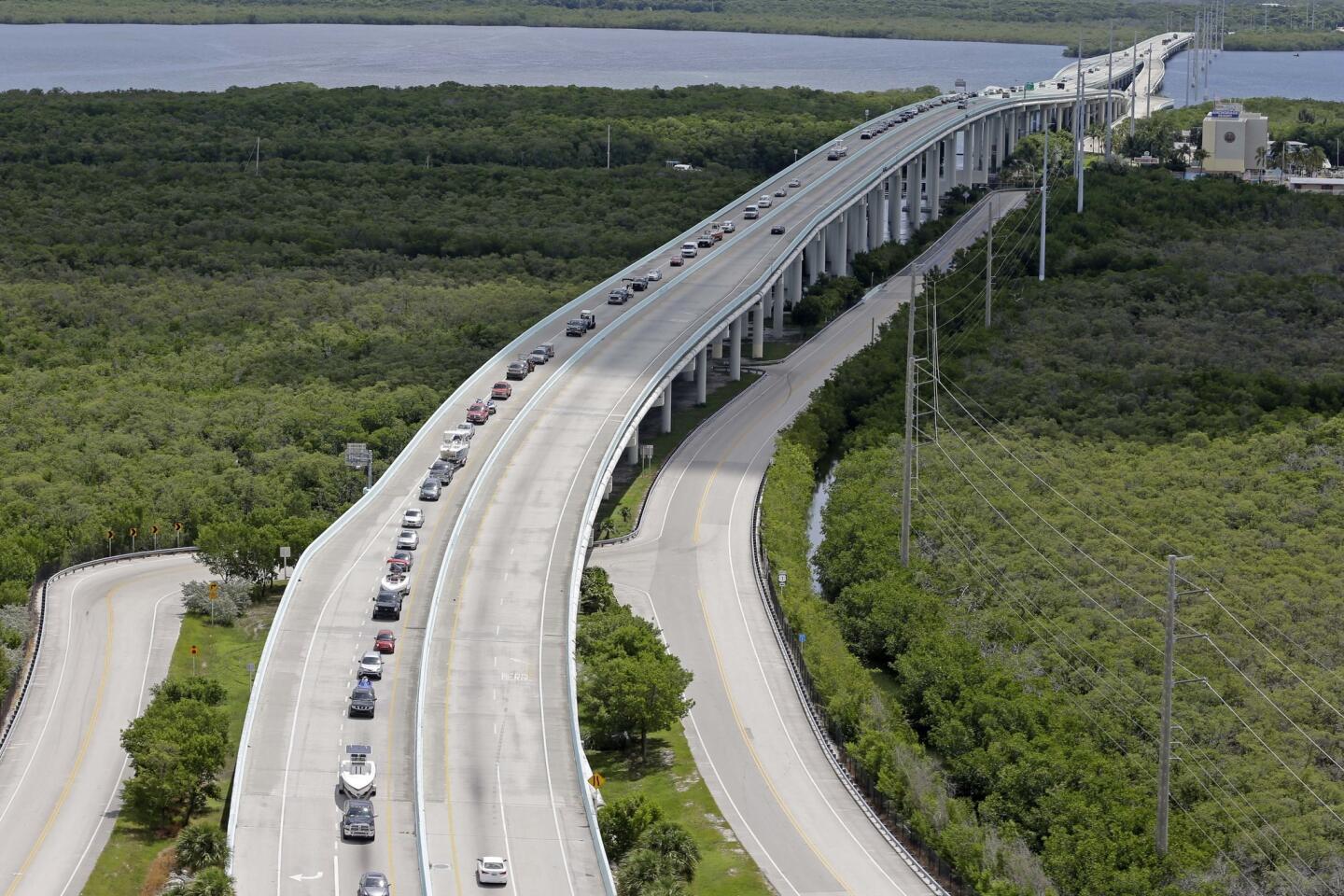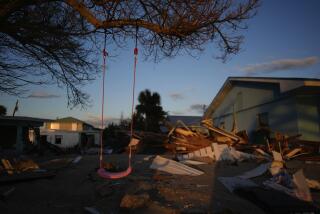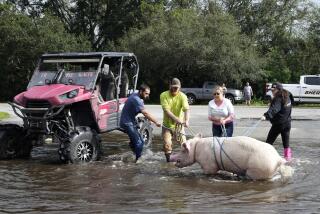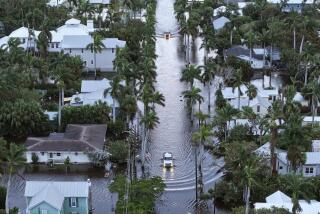Reporting from Naples, Fla. — In a calamitous northward sweep from the Everglades to the Florida Panhandle, a weakening but still monstrously powerful Hurricane Irma battered a string of cities on the state’s palm-fringed west coast Sunday before advancing toward Georgia and the Carolinas.
Irma, downgraded early Monday to a Category 1 storm and expected to lose its hurricane status later in the day, yielded watery misery and hours of scouring winds even in areas that avoided a direct hit, like Miami, and flattened buildings in the Florida Keys, where it first made landfall.
So broad and punishing was the storm’s reach that no corner of Florida, the country’s fourth most-populous state, was unaffected.
Live updates: Hurricane Irma surging up from Florida Keys »
And Irma was an avatar of night terrors: As darkness fell Sunday, the storm was bearing down on the populous Tampa Bay region, rendered especially vulnerable to deadly storm surges by the bay’s funnel shape.
But as the storm moved over land, losing punch but gaining speed, a slight tack to the northeast appeared to spare Tampa the worst of its furies and instead imperiled the theme-park destination of Orlando, and the center of the state saw repeated Irma-spawned tornadoes.
There were at least four deaths. A man in the Florida Keys drove his car into a light pole, and a woman driving on a toll road in central Florida ran into a rail. In a rural area southeast of Tampa, two law-enforcement officers died after their vehicles crashed head-on. None of the incidents was linked conclusively to the storm.
With more than 4 million homes and businesses without power and a vast reckoning of the destruction still at hand, President Trump moved to free up funds for a huge rebuilding effort.
“Right now we’re worried about lives, not cost,” he told reporters as he returned to the White House from a weekend at the presidential retreat of Camp David.
Sunday’s dizzying sequence of stormy weather saw dual landfalls by the hurricane over a span of little more than six hours. After striking the Keys in midmorning, the eye of the storm moved over Marco Island, south of Naples. And soon after came the floodwaters, with water levels in Naples increasing 7 feet in just 90 minutes.
As the storm’s trajectory took it north, water was sucked from part of Tampa Bay, exposing a muddy expanse that would normally be underwater — a frightening portent of flooding to come when that water, and more, comes rushing back.
“MOVE AWAY FROM THE WATER!” appealed the National Hurricane Center after photos on social media showed people and dogs frolicking on the bay’s exposed sand.
The cities bracketing Tampa Bay — Tampa and St. Petersburg, with a population of some 3 million people between them — were forecast to be clobbered later Sunday by sustained hurricane-force winds. A direct hit on the area would be the first in nearly a century.
“We are about to get punched in the face by this storm,” Tampa Mayor Bob Buckhorn declared.
The storm’s passage by no means marks the end of the danger. “Once this system passes through, it’s going to be a race to save lives and sustain lives,” William B. “Brock” Long, the Federal Emergency Management Agency administrator, said on “Fox News Sunday.”
With the storm on a havoc-filled trajectory, much of Florida was a jumbled tableau of overflowing shelters, boarded-up buildings and deserted streets in normally bustling urban centers. Palm trees blew sideways, with fronds snapping under the assault; tree branches flew like missiles.
In Pinellas County, which encompasses St. Petersburg, officials announced a curfew, and sheriff’s deputies hurried to relocate 1,000 inmates from the Pinellas County Jail.
An overnight curfew was also announced in Miami, where almost horizontal sheets of rain whipped through downtown all day long, and the wind seemed to come simultaneously from all directions. Whitecaps were visible on Brickell Avenue, a main north-south waterfront artery, and other major streets flooded as well.
Video: Times coverage of Hurricane Irma
The wind made weapons of debris and even coconuts from palm trees, and powerful gusts threatened some two dozen construction cranes dotting Miami. At least two collapsed in Sunday’s winds.
By nighttime in Miami, the winds, while still fierce, had diminished to the point where it was possible to stand outside without tumbling over, and the rain had given way to clearing skies. A few people ventured outside, some walking their cooped-up dogs.
For those sheltering in hotels, board games and boredom — a contrast to the angry panorama outside — carried the day. “It’s fine; at least it’s safer than the house,” said Chris McShane, who was staying at a Homewood Suites in the Brickell area in downtown Miami with his wife, Jennifer, and their children, Ashley, 1 and Riley, 2, after the family fled their home in the city’s north.
Amid the storm’s ravages came small points of light. A woman in Miami’s Little Haiti neighborhood went into labor and emergency responders were unable to reach her, so doctors coached her through the birth by phone, the city of Miami reported on Twitter. Sunday morning, mother and baby — a girl — were safely transported to Jackson Hospital by fire crews, the city reported.
In Florida alone, more than 6.5 million people were told to flee in advance of the storm, leading to days of jampacked highways and frantic searches for gasoline amid one of the nation’s largest emergency evacuations ever. More than half a million others were ordered to evacuate in Georgia.
1/79
Trailer homes at the Sea Breeze trailer park in the Florida Keys town of Islamorada were destroyed by Irma.
(Marcus Yam / Los Angeles Times) 2/79
Tom Ross inspects the damage to his three-story condominium building in Islamorada.
(Marcus Yam / Los Angeles Times) 3/79
The remains of a boat in Islamorada.
(Marcus Yam / Los Angeles Times) 4/79
Brooke Gilbert, 15, and her father, Mike Gilbert, look at the ruins of her grandparents’ condominium building in Islamorada.
(Marcus Yam / Los Angeles Times) 5/79
Laura Gilbert retrieves the mailbox from her father’s condominium in Islamorada after it was swept away during the storm.
(Marcus Yam / Los Angeles Times) 6/79
Sand and debris block access to trailer homes in Islamorada.
(Marcus Yam / Los Angeles Times) 7/79
Greg Garner embraces neighbor Linda Nettles in front of his longtime family home that lost part of its roof after Tropical Storm Irma hit Sullivan’s Island, S.C.
(Mic Smith / Associated Press) 8/79
Israel Alvarado, 25, tries to open a gate blocked by fallen tree branches to retrieve a generator in Bonita Springs.
(Carolyn Cole / Los Angeles Times) 9/79
Rescue workers help a couple evacuate their flooded home in Jacksonville.
(John Raoux / Associated Press) 10/79
Charlotte Glaze, left gives Donna Lamb a hug as she floats out some of her belongings in floodwaters in Jacksonville,.
(Dede Smith / Associated Press) 11/79
Ron Colby, 70, leaves his flooded Bonita Springs home after staying during Hurricane Irma. He said he was OK with the wind but that at 3:30 in the morning the water started to rise.
(Carolyn Cole / Los Angeles Times) 12/79
A dresser floats by Gilberto Diaz in his Bonita Springs neighborhood. Originally from Guatemala, Diaz has lived in Florida since 1994.
(Carolyn Cole / Los Angeles Times) 13/79
In Bonita Springs, floodwaters reached waist deep in some areas on Monday, flooding homes and cars.
(Carolyn Cole / Los Angeles Times) 14/79
A block from the ocean in Naples, the water was still a foot deep from storm surge. Homeowner Terry Clontz put up a “no wake” sign because people were driving by too fast, pushing water farther onto his property.
(Carolyn Cole / Los Angeles Times) 15/79
Floodwaters surround a marina in Key Largo on Monday following Hurricane Irma.
(Wilfredo Lee / Associated Press) 16/79
Mobile homes in Key Largo, Fla., lie in ruins on Monday after Hurricane Irma.
(Wilfredo Lee / Associated Press) 17/79
Floodwaters surround Gilbert’s Resort in Key Largo on Monday.
(Wilfredo Lee / Associated Press) 18/79
Kelly McClenthen returns to see the flood damage to her home with her boyfriend, Daniel Harrison, in the aftermath of Hurricane Irma in Bonita Springs, Fla.
(Gerald Herbert / Associated Press) 19/79
Terry Thompson is relieved. He rode out the storm in his home in Riverwood Estates in Naples. Although the Naples area of Florida was hit hard by Hurricane Irma, damage wasn’t nearly as bad as anticipated.
(Carolyn Cole / Los Angeles Times) 20/79
A woman leaves her flooded home the morning after Hurricane Irma swept through the area in Fort Myers, Florida.
(Spencer Platt / Getty Images) 21/79
People tend to a car that flipped over on Cape Coral Parkway during Hurricane Irma, in Cape Coral.
(Gerald Herbert / AP) 22/79
A man clears the drain next to his house in Estero, Fla., during the lull in winds as the eye of the hurricane passes over.
(Carolyn Cole / Los Angeles Times) 23/79
Evacuees use flashlights so others can maneuver around the stairway at Hampton Inn and Suites in Estero, Fla.
(Carolyn Cole / Los Angeles Times) 24/79
Guests gather in the lobby of Hampton Inn and Suites in Estero, Fla., to watch the hurricane gusts.
(Carolyn Cole / Los Angeles Times) 25/79
Darla Talia Ferro, 40, and her two parakeets ride out Hurricane Irma in the lobby of Hampton Inn and Suites in Estero, Fla.
(Carolyn Cole / Los Angeles Times) 26/79
John Krowzow, 74, wades in floodwater to check out his homes in Corkscrew Woodlands, a park with 640 senior mobile home units in Estero, Fla.
(Carolyn Cole / Los Angeles Times) 27/79
Peter Moodley wades through floodwater in downtown Miami.
(Marcus Yam / Los Angeles Times) 28/79
Two men walk through a downed tree as Hurricane Irma’s full force strikes Miami.
(Marcus Yam / Los Angeles Times) 29/79
A woman films the damage from a house whose roof was blown off near downtown Miami.
(Marcus Yam / Los Angeles Times) 30/79
A vehicle drives through debris caused by Hurricane Irma, in Miami.
(Marcus Yam / Los Angeles Times) 31/79
Weather reporters in downtown Miami jump and cling on to illustrate the force of the winds caused by Hurricane Irma.
(Marcus Yam / Los Angeles Times) 32/79
Weather reporters do a stand-up as the force of the winds caused by Hurricane Irma hit Miami.
(Marcus Yam / Los Angeles Times) 33/79
A cargo truck is tipped over by the wind caused by Hurricane Irma in Miami.
(Marcus Yam / Los Angeles Times) 34/79
Storm surge floods the Brickell neighborhood of Miami.
(Marcus Yam / Los Angeles Times) 35/79
Streets are empty in downtown Miami as the wind picks up speed during Hurricane Irma’s approach.
(Marcus Yam / Los Angeles Times) 36/79
Maria Koenig, 63, of Estero, Fla., and her dog, Baeley, sit by the window at their Estero hotel so Maria can keep an eye on the storm on Sunday.
(Carolyn Cole / Los Angeles Times) 37/79
Glen Sinatra, 69, from Naples, says he feels lucky to be at a hotel in Estero instead of a shelter. He’s nervous about the storm and says he’s trying not to worry his children about the conditions.
(Carolyn Cole / Los Angeles Times) 38/79
Jimmy Alfano, of Ft. Myers, holds onto Alec Hoskins who is autistic, while watching the storm gusts through the window of their Estero hotel with Frank Pairs.
(Carolyn Cole / Los Angeles Times) 39/79
A car sits abandoned in storm surge along North Fort Lauderdale Beach Boulevard as Hurricane Irma hits the southern part of the state.
(Chip Somodevilla / Getty Images) 40/79
The metal canopy at a gasoline station is overturned by high winds brought on by Hurricane Irma.
(Wilfredo Lee / Associated Press) 41/79
Youssef Ezzou, left, and Fadel Beznbachir roam outside to check out the conditions in Miami as Hurricane Irma nears the mainland.
(Marcus Yam / Los Angeles Times) 42/79
A construction crane whose arm broke off towers over a building as high wind blows through downtown Miami on Sunday.
(Marcus Yam / Los Angeles Times) 43/79
A man and woman run to safety in Miami as winds from Hurricane Irma bear down on Sunday.
(Marcus Yam / Los Angeles Times) 44/79
Storefronts in Miami are damaged as Hurricane Irma’s winds hit Miami.
(Marcus Yam / Los Angeles Times) 45/79
Dustin Terkoski, Palm Bay Police officer surveys the scene after a possible tornado touched down at Palm Pam Bay Estates.
(Red Huber / Orlando Sentinel) 46/79
A man braces against the wind by the Miami River on Sunday as water levels surge.
(Marcus Yam / Los Angeles Times) 47/79
A man stands by the Miami River as the water level surges on Sunday.
(Marcus Yam / Los Angeles Times) 48/79
The waves on the Miami River begin to surge Sunday as winds pick up speed upon Hurricane Irma’s approach.
(Marcus Yam / Los Angeles Times) 49/79
Brian Williams, of Maryland, fights the winds in downtown Fort Myers.
(Carolyn Cole / Los Angeles Times) 50/79
Trees fall as winds pick up speed early Sunday as Hurricane Irma approaches Miami.
(Marcus Yam / Los Angeles Times) 51/79
A TV reporter braces against the wind as Hurricane Irma approaches Miami.
(Marcus Yam / Los Angeles Times) 52/79
The outer bands of Hurricane Irma start to reach Florida on Saturday, with clouds over the Miami skyline.
(Joe Raedle / Getty Images ) 53/79
People wade through a flooded street in Havana after Hurricane Irma battered central Cuba.
(YAMIL LAGE / AFP/Getty Images) 54/79
Thousands wait Saturday to enter a storm shelter set up at Germain Arena in Estero, Fla., south of Fort Myers.
(Carolyn Cole / Los Angeles Times) 55/79
Jean Turner, 79, waits to get into a shelter with a few of her belongings as rain begins to fall Saturday in Estero, Fla.
(Carolyn Cole / Los Angeles Times) 56/79
Sherri Bourdo, 32, and Anthony Guidry, 40, look out over the water in Naples, Fla, in advance of the arrival of Hurricane Irma.
(Carolyn Cole / Los Angeles Times) 57/79
Lisette Toroella and Tatiana Morera play on the beach as storm clouds approach in Miami Beach.
(Marcus Yam / Los Angeles Times) 58/79
Adam Todd, does a handstand while skateboarding down a virtually empty Ocean Drive in Miami Beach.
(Marcus Yam / Los Angeles Times) 59/79
Abby Jenkins walks against the wind with her luggage and umbrella to get to safety, in Miami Beach.
(Marcus Yam / Los Angeles Times) 60/79
James Sampero surfs in the churning ocean as Hurricane Irma approaches.
(Joe Raedle / Getty Images) 61/79
Cubans wade through the rubble from a collapsed building in Havana on Saturday.
(Yamil Lage / AFP/Getty Images) 62/79
A woman and child use a blanket as protection from wind and rain as they walk in Caibarien, Cuba. Hurricane Irma battered Cuba on Saturday with deafening winds and unremitting rain, pushing seawater inland and flooding homes before turning toward Florida.
(Desmond Boylan / Associated Press) 63/79
Annette Davis plays with her son Darius, 3, while staying at a shelter in Miami on Saturday after evacuating from their home in Florida City ahead of Hurricane Irma.
(David Goldman / Associated Press) 64/79
Residents walk through rain brought on by Hurricane Irma in Caibarien, Cuba. The powerful storm battered Cuba on Saturday and continued its march toward Florida.
(Desmond Boylan / Associated Press) 65/79
Palmetto Ridge High School is a shelter for people with special needs near Naples, Fla. Many seniors plan to ride out the storm there.
(Carolyn Cole / Los Angeles Times) 66/79
Francesca DeLuca, age 20, will be waiting for 10 hours for her flight back to Milan, Italy. She had been visiting a friend in Miami by herself, but the area where she was staying is under mandatory evacuation. At Miami International Airport, the last flights will be this afternoon with the airport closing tonight at 6pm. Most travelers are taking flights to anywhere they can find.
(Carolyn Cole / Los Angeles Times) 67/79
Boats that can’t be evacuated are tied off in canals to protect them from Hurricane Irma on in Key Largo, Florida. The entire Florida Keys are under a mandatory evacuation notice as Hurricane Irma approaches the low-lying chain of islands south of Miami.
(Marc Serota / Getty Images) 68/79
Hundreds wait in line on Friday at Home Depot in Miami to get supplies line sheets of plywood, and anything else they can find, to board up their homes. Police were on the scene to keep things orderly.
(Carolyn Cole / Los Angeles Times) 69/79
In the Little Haiti neighborhood of Miami, Fritz Drinks, whose family is from Haiti, helps load sandbags at Little Haiti Hardware and Lumber. Many people in the area are refusing to evacuate in advance of Hurricane Irma.
(Carolyn Cole / Los Angeles Times) 70/79
In downtowm Miaimi, people wait to get on a bus headed to Orlando under a mandatory evacution plan. Preparations are underway for Hurricane Irma as the storm makes its way toward Florida.
(Carolyn Cole / Los Angeles Times) 71/79
Stores are boarded up in Miami Beach in advance of Hurricane Irma.
(Carolyn Cole / Los Angeles Times) 72/79
Preparations for Hurricane Irma are underway in Miami Beach as the storm makes its way toward Florida.
(Carolyn Cole / Los Angeles Times) 73/79
Genaro Dacosta, 65, of Miami Beach loads sandbags in advance of Hurricane Irma. He says he can’t evacuate the area because he has a monkey.
(Carolyn Cole / Los Angeles Times) 74/79
An aerial photograph taken and released by the Dutch Department of Defense on Wednesday shows damage from Hurricane Irma in Philipsburg, St. Maarten.
(Gerben van Es / AFP/Getty Images) 75/79
Juan Negron, third from left, prepares to start up a power generator in front of what’s left of his damaged property in Culebra, Puerto Rico, after the passage of Hurricane Irma.
(Carlos Giusti / Associated Press) 76/79
Residents come out to survey the damage caused by Hurricane Irma in Nagua, Dominican Republic.
(Tatiana Fernandez / Associated Press) 77/79
People on Thursday look over damage from Hurricane Irma on a sand-covered street of Marigot, near the Bay of Nettle, on the island of St. Maarten.
(Lionel Chamoiseau / AFP/Getty Images) 78/79
Inmate trustees from the Brevard County Jail fill sandbags for Meritt Island, Fla., residents in advance of Hurricane Irma.
(Brian Blanco / Getty Images) 79/79
Motorists leave Key Largo, Fla., ahead of Hurricane Irma.
(Alan Diaz / Associated Press) In downtown Fort Myers, on Florida’s southwest coast, the hurricane’s leading edge was so strong that it was hard to walk a block. Ominously, the Caloosahatchee River’s level dropped sharply, its lowered tide likely heralding a storm surge.
Some seemed ill-equipped to face an epic weather event, armed with little more than bravado.
“I got rum, cheese, tortillas,” announced Michael Gandy, a sunburned 77-year-old, who was keeping an eye on his boat from a marina-side apartment complex in Fort Myers.
People who had left everything they owned behind could only worry and wait as the wind and water reached a crescendo. “I’m worried I won’t have a house to go back to,” said Diana Frana, who fled her canal-side home in Cape Coral, on Fort Myers’ outskirts.
Florida’s lifeblood is tourism, so the storm-stranded included many from out of state — and from outside the U.S. An Argentine family, the Mureoccas, spent a week at Walt Disney World, but were thwarted when they tried to fly back to Buenos Aires after visiting Miami Beach.
“It’s not what we planned,” said Leonardo Mureocca, 44, who was stuck at a hotel near Miami’s airport with his wife and two daughters, 8 and 12. “This is our first hurricane — we don’t have this kind of thing.”
By the time the storm hit, Floridians had already had a grim preview of Irma’s fury: The storm left a trail of destruction across the eastern Caribbean, barreling up through the lush Leeward Islands and killing at least two dozen people.
More than 36 hours after being pummeled by what was still then a Category 5 storm, a shaken Cuba was still assessing the damage Sunday. Initially, the storm had not been expected to make landfall there, but it passed directly over northern islands, with effects felt as far away as the capital, Havana. Passing over Cuba probably weakened the storm as it punched onward toward Florida, scientists said.
Even while the storm raged, there were sober assessments of a long and painful recovery for the storm zone on the U.S. mainland. Sen. Bill Nelson (D-Fla.), speaking on CNN, said weeks and months of disruption are to be expected.
“This storm has covered the whole state of Florida,” he said, predicting a “slow slog” back to any semblance of normalcy.
A determined few Floridians seized any opportunity – even a fleeting one like the hurricane’s eye, a period of relative calm – to check on homes and property.
John Krowzow, who is 74, slipped away to check on the situation in Corkscrew Woodlands, a mobile home park for seniors in Estero, a hard-hit town near Fort Myers.
“I feel good!” he said after finding that his mobile home, raised on cinder blocks, was intact.
Staff writer McDonnell reported from Miami, staff writer King from Washington and staff writer Halper from Fort Myers. Staff writer John Cherwa in Orlando and special correspondent Les Neuhaus in Miami contributed to this report.
[email protected]
@laurakingLAT
Hurricane Irma: What we know so far
Storm surge: What happens when the sea rises up during a hurricane?
The incredible stories of the die-hards who looked Irma in the face — and stayed
UPDATES:
11:20 p.m.: This article was updated with news that Irma was downgraded to a Category 1 storm.
7:20 p.m.: This article was updated throughout for context.
4:05 p.m.: This article was updated with President Trump’s disaster declaration and details about more than 2 million without power, the storm’s approach to Fort Myers and quotes from stranded people.
2:10 p.m.: This article was updated with news that the storm has weakened to a Category 2 storm.
12:55 p.m.: This article was updated with a second landfall, comments from Tampa’s mayor, preparations in St. Petersburg, forecast details and overnight curfews in several cities
11:05 a.m.: This article was updated with the hurricane’s latest position, descriptions and quotes from Miami and Fort Myers, and 1.5 million now without power.
9:35 a.m.: This article was updated with flooding in downtown Miami, more comment from Gov. Rick Scott and from Sen. Bill Nelson.
7:55 a.m.: This article was updated with a tropical storm warning for Atlanta, more losing power, and the birth of a baby whose stranded mother in Miami was coached by phone.
7 a.m.: This article was updated with descriptions of conditions, the storm surge danger in Fort Myers.
This article was originally published at 6:40 a.m.

